
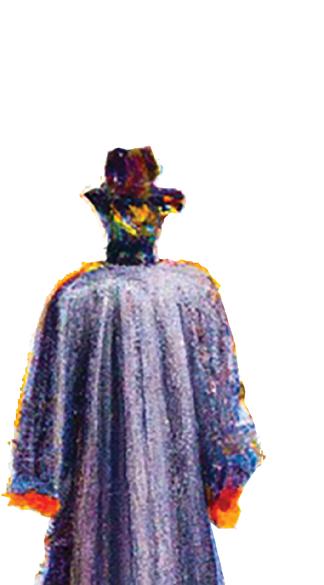

MARCH 31, 2023 | 9 NISAN 5783 VOL. XCIX NO. 6 NEXT ISSUE: EDUCATION & CAMP Happy Passover Unity Creates Community

THURSDAY, MAY 4, 2023 | 7 PM – 10 PM TICKETS: $150 Purchase tickets at thetasting.org Caren & Michael Merlin Vanessa & Isaac Frank All proceeds from The Tasting benefit the nonsectarian Zimmerman-Horowitz Independent Living Program, providing supportive services to adults with intellectual and developmental disabilities so they may live fulfilling lives as independently as possible. Tracey & Sammy Grant Sara & Ross Kogon Arin & Lorne Tritt Rachael & Jay Abt Mara & Justin Berman Rashelle & Jeremy Berry Allison & Jacob Blatt Leah & Ted Blum Staci & Matt Brill Nanci & Adam Brown Rachel Caldes Jill Cohen Justine & Andre Cohen Maria & Alex Deitch Allison & Jonathan Dubovsky Jenifer & Jonathan Feldman Robin Feldman & Chuck Edelberg Suzanne & Robert Friedman Andrea & Jordy Gamson Cheryl & Roger Gelder Susan & David Goldberg Lynn & Ronnie Goldman Tracey & Sammy Grant Carey & Jason Guggenheim Helen & Frank Hahn Melissa Hall & Russell Gottschalk Jodi & Ben Halpert Amanda & Daniel Hanison Lauren & Brian Harris Rabbi Lauren Henderson & Joel Dworkin Michelle Horowitz Jackie Garson Howard Marisa & Michael Kaiser Judy & Jay Kessler Sara & Ross Kogon Jami & Larry Kohn Sheri & Craig Kornblum Deborah & Douglas Kunianksy David Kurtzman Amanda & Howard La Kier Berna & Noah Levine Renee & Alan Levow Michelle & Scott Levy Stacey & Eric Levy Staci & Joel Libowsky Andrea & Andy Lipman Leslie & Aaron Lipson Jodi & Shon Mekyten Lisanne & Paul Nozick Julie & David Oshins Amy & Philip Rodbell Heather & Jonathan Rodbell Amy & Evan Rosen Rachael & Jack Rosenberg Dayna & Jeremy Royal Susan & Ray Schoenbaum Janet Selig & Jeffrey Bernstein Norma Shohet & Robert Kadoori Alana & Marc Sonenshine Debbie & Stan Sonenshine Rachel Sonenshine & Jonathan Halitsky Lisa & Evan Toporek Dawn & Eric Tresh Arin & Lorne Tritt Dr. Heather Weiner & Dr. Kevin Berman As of 3/22/2023


Happy Passover 770-449-0001 lipseywater.com
The Davis Academy’s 30th Anniversary Community Celebration was a night to remember! With a sold-out crowd, record fundraising success, dinner, dancing, and incredible ruach (spirit), the evening brought together the entire Davis Academy community. From Davis’ pioneer families and alumni from the very first class, to current and past faculty and board members, parents and grandparents, and caring community members – all excitedly gathered to celebrate The Davis Academy.
Thank you for your support and commitment to our incredible school.
davisacademy.org/30years

continued...
silver











ATLANTA JEWISH TIMES MARCH 31, 2023 | 5 Bagels Breads Appetizers Salads Deli catering 1255 Johnson ferry road, suite 37, marietta, ga 30068 770-509-9505 BAGELICIOUS CONTRIBUTORS THIS ISSUE SIMONE WILKER SUSANNE KATZ KARLICK ADVERTISING Senior Account Manager & Team Supervisor MICHAL BONELL michal@atljewishtimes.com Account Manager ILYSSA KLEIN ilyssa@atljewishtimes.com Account Manager ELIZABETH LANGFELDER elizabeth@atljewishtimes.com CREATIVE & DESIGN Creative Director LILLI JENNISON lilli@atljewishtimes.com COMMUNITY ENGAGEMENT Events and Public Relations Coordinator KATIE GAFFIN katie@atljewishtimes.com Atlanta Jewish Connector Coordinator DIANA COLE Diana@atljewishtimes.com GENERAL OFFICE Administrative Assistant REBECCA LABANCA info@atljewishtimes.com 404-883-2130 The Atlanta Jewish Times is printed in Georgia and is an equal opportunity employer. The opinions expressed in the Atlanta Jewish Times do not necessarily reflect those of the newspaper. Periodicals postage paid at Atlanta, Ga. POSTMASTER send address changes to Atlanta Jewish Times 270 Carpenter Drive Suite 320, Atlanta Ga 30328. Established 1925 as The Southern Israelite www.atlantajewishtimes.com ATLANTA JEWISH TIMES (ISSN# 0892-3345 IS PUBLISHED BY SOUTHERN ISRAELITE, LLC © 2023 ATLANTA JEWISH TIMES Printed by Walton Press Inc. MEMBER Conexx: America Israel Business Connector Atlanta Press Association American Jewish Press Association National Newspaper Asspciation Sandy Springs/Perimeter Chamber of Commerce Please send all photos, stories and editorial content to: submissions@atljewishtimes.com CONTENTS NEWS .............................................. 6 SPORTS 28 ISRAEL ......................................... 32 BUSINESS .................................... 36 OPINION 38 PASSOVER .................................. 44 ARTS & CULTURE ....................... 86 CHAI STYLE 95 CALENDAR .................................. 98 KEEPING IT KOSHER ............... 102 BRAIN FOOD 103 OBITUARIES 104 CLOSING THOUGHTS ............. 108 MARKETPLACE ........................ 110
Artificial Intelligence techology. Corrections/ Clarifications: In January 31, 2023 issue, the Atlanta Jewish Times included incorrect contact information for “Teaching Tools for Parents of Special Needs Children.” The correct contact is www.inthefirstplaceatlanta.com or email firstplace2015@gmail.com. www.AtlantaCelebratesIsrael75.com Come and Celebrate Israel’s 75th Anniversary with Us Reception and Program Yom Ha’atzmaut, Wednesday April 26, 2023 at 6 p.m. While we will charge $75 per ticket to help defray costs, it will not be enough to fully underwrite the occasion. Our hope is that families like yours, who are pillars of leadership in our community, will consider sponsoring the event at $25,000 Level, but of course every amount will be greatly appreciated. Atlanta Celebrates Israel’s 75th Become a Sponsor Today www.AtlantaCelebratesIsrael75.com Get Your Ticket Now Event Presenter Global Speaker and CNN Producer, Nadia Bilchik Guest Speaker Consul General of Israel to the Southeast, Anat Sultan-Dadon
Cover Photo: Image created by Lilli Jennison using
The Davis Academy Celebrates 30 Years
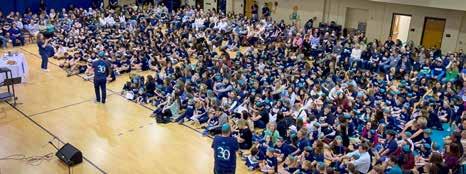 By Susanne Katz Karlick
By Susanne Katz Karlick
The journey began 30 years ago when Jan Epstein and Carol Nemo, founding copresidents and lifelong friends, began their mission to create what is now the largest Reform Jewish Day School in the country.


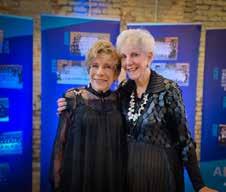
With generations of students and alumni, parents and grandparents, community rabbis, faculty and staff, and caring supporters from throughout the city and the U.S., The Davis Academy celebrates these past 30 years while looking ahead to the lives, families, and communities that it will meaningfully impact in the next 30 years and beyond.
The celebration kicked off the morning of Friday, March 18, at the school’s Lower School Campus Selig Family Gymnasium, which was packed with students, families, and alumni, singing joyfully with talented musical guest artist Jacob Spike Kraus. A highlight of the gathering was a special blessing offered by 15 rabbis and clergy from across Atlanta, alongside Shabbat blessings chanted by presidents of the school’s Board of Trustees going all the way back to the school’s founding.
Guardian Works in West Midtown the evening of, Saturday, March 18, hosted a crowd filling the beautifully decorated indoor/outdoor venue. The night was filled with incredible joy and ruach (spirit), as those of every generation in the school’s history celebrated 30 years of growth and achievement, with splendid dinner offerings and music by America’s premier yacht rock band, Monsters of Yacht.
Thirty-plus years ago,, as the Reform movement was beginning to revisit tradition and explore the need for deeper en-


gagement and Jewish education, Atlanta’s rabbinical leadership across the movements, the Union for Reform Judaism headquartered in New York City, and leaders throughout the greater Atlanta, embraced the vision for an independent school that would ensure academics on par with the many well respected private schools in the area, infused with Jewish values and Reform philosophy.
Epstein and Nemo pushed forward, with the help of many others, to make this dream a reality. Ann and Jay Davis and Dulcy and Jerry Rosenberg endowed the school in honor of their parents. The doors to The Alfred & Adele Davis Academy opened in August of 1992 with 20 students in the basement of a Junior Achievement building on Abernathy Road.
“While so much has evolved over our 30 years, including teaching methods and the expanse of resources, some things haven’t changed at all since our foundingour purpose – our priorities – our values –and the importance of making a positive difference in the world around us,” said Amy Shafron, head of school. “Today, The Davis Academy celebrates 30 years of growth and achievement and three decades of living our core values of community, respect, spirit, wisdom, and righteousness. These are the values that guide our daily lives as students come to understand who they are and how to engage, succeed, and make a difference in the greater world around them. We cel-
ebrate the values that are at the heart of the school and that inspire us to be the very best version of ourselves.”
As the night unfolded, and the crowd was enjoying being together, Lisa Freedman, current president of the school’s Board of Trustees, shared, “My husband and I have the bittersweet distinction of being alumni parents, as both of our daughters are now graduates of The Davis Academy. We look back on our time at Davis with much nostalgia and extreme gratitude for the unbeatable foundation our girls were given and upon which they now flourish and succeed in high school and college. We couldn’t be more thankful for their incredible team of teachers who truly loved them, challenged them, and empowered them to work towards their greatest potential. Our family has been blessed with a Davis community of lasting friendships - many of whom we get to meaningfully celebrate with here tonight.”
Lisa Mirsky was also at the event and shared, “Only two years into my teaching career, I took a leap of faith in 2001 and decided to accept a third-grade teaching position at The Davis Academy. Little did I know at the time what a huge impact this decision would have on me. Now, as the school’s director of admissions and, in my 22nd year at Davis, I have had the privilege of welcoming generations of children into this special school kehillah and am constantly reminded how lucky I am, and our children and families are, to be part of this warm and
6 | MARCH 31, 2023 ATLANTA JEWISH TIMES
Jan Epstein and Carol Nemo // Photo Credit: Cristy Milrud, The Davis Academy
(From left) Jan Epstein, Carol Nemo, Dulcy and Jerry Rosenberg, Ann and Jay Davis // Photo Credit: Harold Alan Photographers
NEWS
Close to 900 guests attended the 30th anniversary Kabbalat Shabbat // Photo Credit: Harold Alan Photographers
nurturing community.”
The event featured the school’s graduates, including class photos from its 23 graduating classes to date. In referencing the beautiful photo wall, Shafron commented, “We celebrate almost 1,500 graduates now scattered across Atlanta’s high schools, our nation’s colleges, throughout the country and the globe - valedictorians, Fulbright scholars and Ph.D.s; musicians and NCAA Division I athletes; those now working on the Hill or on Wall Street, or as teachers as far away as Israel or right here at home at The Davis Academy; graduates that are leading local youth groups, campus Hillels or even serving on boards around Atlanta’s Jewish community. And what could be better than now, seeing our graduates wanting to bring their own children to The Davis Academy!”

Max Miller, a graduate of the Class of 2003, and now a rabbi at Temple Emanu-El, found his own photo. “The Davis Academy was the place that inspired within me a love of Judaism. Now, as the father to a future Davis Lion, I want the same for my daughter. I

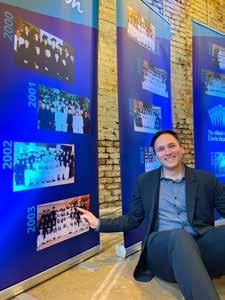
want her to grow up empowered by sacred, ancient wisdom to live a life of deep meaning.”
Shafron has served the community for 19 years and commented that, “There is truly nothing more gratifying to me as head of school than knowing we have, and are, making an impact on generations of children and families, are serving as a model for other communities, and are known throughout the country for excellence, innovation, and achievement. Interestingly, the Talmud says that 30 is the age when one attains a level of full strength (Pirke Avot 5:21). How appropriate, as we celebrate the future of The Davis Academy – may it continue to go - and grow – L’dor V’dor – from generation to generation and from strength to strength.”
All in all, this was a true celebration of community, one to be cherished and remembered for years to come. ì


In the United States, disaster relief, ambulance, and blood services are handled by an array of organizations. In Israel, there’s one organization that does it all — Magen David Adom. As Passover approaches, whatever crises Israelis face — including terror or rocket attacks — MDA will be there to save lives.

Support Magen David Adom by donating today at afmda.org/give. Or for further information about giving opportunities, contact 561.835.0510 or southeast@afmda.org.
afmda.org/give

ATLANTA JEWISH TIMES MARCH 31, 2023 | 7 NEWS
Why is this EMS organization different than all other EMS organizations?
Cristy Milrud, Davis Academy director of marketing and communications, contributed to this report.
Rabbi Max Miller, Class of 2003 // Photo Credit: Harold Alan Photographers
The Davis Academy community gathered to celebrate the school’s 30th anniversary // Photo Credit: Cristy Milrud, The Davis Academy
The Davis Academy celebrated its 30th anniversary // Photo Credit: Cristy Milrud, The Davis Academy
Special blessing offered by 15 rabbis and clergy from across Atlanta // Photo Credit: Cristy Milrud, The Davis Academy
Monsters of Yacht perform // Photo Credit: Cristy Milrud, The Davis Academy
(From left) Julie Peretz, Amy Rosen, Mara Berman // Photo Credit: Harold Alan Photographers
Antisemitism Bill Comes Down to the Wire
By Dave Schechter
Legislation to define antisemitism in Georgia’s legal code will hinge on two votes that must happen Wednesday March 29 — the last day of the General Assembly’s session.
Passage will require approval first by the Senate and then the House. The votes must happen in that order because the bill, initially passed by the House, was amended by a Senate committee.
The Senate could have voted on the measure Monday but adjourned without doing so. There is no guarantee that both votes will happen Wednesday, as the last day of session usually is the most chaotic.
Approval in both chambers would send the bill to Republican Gov. Brian Kemp for his signature.
Incorporating the International Holocaust Remembrance Alliance in the state code was the top legislative priority of Jewish Atlanta’s major communal organizations.
The IHRA definition reads: “An-













tisemitism is a certain perception of Jews, which may be expressed as hatred toward Jews. Rhetorical and physical manifestations of antisemitism are di-

rected toward Jewish or non-Jewish individuals and/or their property, toward Jewish community institutions and religious facilities.”

The House bill included the language of the IHRA definition. The Senate’s version included only a reference to the definition, not its text.
Between Therapy Couch and Yoga Mat
Paid for by Nourish to Flourish Therapy
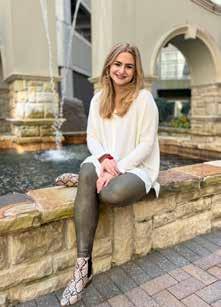

Leanne Shub is a therapist, Registered Yoga teacher, and owner of her practice Nourish to Flourish Therapy. She has specialized training in a treatment modality called Somatic and Attachment Focused Eye Movement Desensitization Resolution, commonly referred to as S.A.F.E. EMDR, which is a body-mind integrated treatment. S.A.F.E. EMDR allows individuals to heal from symptoms and emotional distress that are a result of disturbing life experiences. Leanne helps individuals navigate various life challenges such as healing from traumatic experiences, family of origin issues, anxiety, relationship issues, grief, and disordered eating. “My work with clients is a little different from traditional talk therapy in that I help clients turn inward, accessing the wisdom of their bodies, nervous systems, and inner knowing. What I’ve come to understand is that when a person is in tune with their body, nervous system, and inner knowing, they have the clarity to problem solve without much need for external influence.” In her work with clients, it’s not uncommon for Leanne and the client to roll out yoga mats and move from therapy
couch to yoga mat. “We store so much of our experiences in our bodies. There are times when talking is such a restrictive form of expression, especially when processing deep pain from the past. Yoga can give the body a chance to talk and tell its story.” In addition to integrating yoga, breathwork, and meditation into therapy
sessions with clients, Leanne also provides individualized yoga, breathwork, and meditation sessions for non-therapy clients as well. Whatever your personal challenge is today, Nourish to Flourish Therapy is ready to provide a safe and loving space for you to dive deep, getting to the root cause of your struggles, so that you can free
yourself from whatever is holding you back from being authentically you.
Nourish to Flourish Therapy, LLC
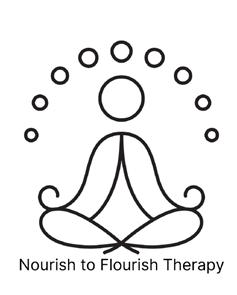
770-880-3225
nourishtoflourishtherapyllc@gmail.com
https://nourishtoflourishtherapy.com
8 | MARCH 31, 2023 ATLANTA JEWISH TIMES NEWS Paid Content by Nourish to Flourish Therapy
ADVERTISEMENT
Legislation to define antisemitism has taken a circuitous route through the state legislature and is now in jeopardy of not being passed due to legislative session deadlines.
Neither included the IHRA definition’s 11 accompanying examples of antisemitism, which have proven more controversial than the definition itself. The examples include accusing Jews outside of Israel of dual loyalty, comparing Israel to Nazis, calling Israel “racist,” “denying the Jewish people their right to self-determination,” and applying standards to Israel “not expected or demanded of any other democratic nation.”
The bill, as written, would “require state agencies to consider antisemitism when determining whether an alleged act was motivated by discriminatory intent.” Supporters maintain that the IHRA definition will aid state agencies and prosecutors, the latter as they consider invoking the state’s hate crimes law that enhances sentences for convictions of bias-related offenses.

House Bill 30 was introduced with only a reference to the IHRA definition — as desired by its Jewish backers — to prevent future legislatures from changing language that has been adopted or endorsed by 40 nations (including the United States, via an executive order from then-President Donald J. Trump), 30 U.S. states, and some 1,100 institutions worldwide.
House Bill 30 survived a “tortuous” path through the House, in the words of a co-sponsor, Jewish Democratic Rep. Esther Panitch, of District 51 in north Fulton County. Part of that was addition of the definition language when the Rules Committee chairman sent the bill back to the Judiciary Committee.



The full House passed HB 30 on March 6 — by a vote of 136 in favor and 22 against (16, for whatever reason, did not vote and six were absent).
Its chances in the Senate appeared bleak when the Judiciary Committee “tabled” HB 30 on March 20, an 8-0 vote apparently swayed by free-speech issues raised by opponents. The bill’s chief sponsor, Marietta Republican Rep. John Carson, asked the Judiciary Committee not to move the bill after members of the committee attempted to alter the IHRA language.
On the morning of March 23, however, it was resurrected in the Senate Children and Families Committee. House Bill 144 was stripped of its original language — dealing with children under the state’s care — and an amended version of HB 30 was substituted. Legislation that dies in one form and comes back in another is referred to as

a “zombie” bill.
The “new” HB 144 passed the Children’s and Families Committee on a 6-2 vote and that evening the Rules Committee moved the bill on to a Senate floor vote on Monday, March 27.


Throughout consideration in the House and Senate, the bill’s supporters were adamant that the IHRA definition would not affect free speech.
“Anyone can protest and yell and criticize and demonstrate and speak and scream anything they want about Israel or Jews. This bill will not stop them unless they’re planning to commit a hate crime,” Mark Goldfeder, an attorney for the American Center for Law and Justice and also counsel for Hillels of Georgia, told the Judiciary Committee. “It protects Jews here from antisemites, including those who would use Israel as an excuse to attack Jews.”
The bill’s opponents warned that the IHRA language could be “weaponized” to stifle debate over Israeli treatment of the Palestinians.
“It works as a tool of censorship that falsely conflates attempts to hold the Israeli government accountable with antisemitism. Do not respond to this terrible, terrible rise in antisemitism by victimizing Palestinian advocacy,” Peyton Hayes of the University of Georgia chapter of Students for Justice in Palestine, told the committee.
Efforts to add a definition of antisemitism to the code received a boost after the distribution of anti-Jewish fliers in the driveways of heavily Jewish neighborhoods in Dunwoody and Sandy Springs in the pre-dawn hours of Feb. 5. Panitch, who represents a House district in northern Fulton County, found three baggies containing flyers in her driveway. Such flyers, distributed by a group called the Goyim Defense League, have appeared in DeKalb, Fulton, Cobb, Paulding, and Muscogee counties.
Democratic Rep. Ruwa Romman posted on Twitter March 24 that the proposed legislation “would not actually address the recent attacks on the Jewish community,” a reference to the flyers. At the time, attorneys told the AJT that the distribution of the flyers did not violate any criminal statute but might have violated local ordinances on littering.
This being the first year of the General Assembly’s two-year cycle, the bill could re-emerge when the legislature convenes next January. Similar legislation passed the House last year but never received a vote on the Senate floor. ì

ATLANTA JEWISH TIMES MARCH 31, 2023 | 9 ©2018 Coldwell Banker Real Esta e LLC. Coldwell Banker is a registered trademark licensed to Coldwell Banker Real Estate LLC. An Equal Oppor tunity Company Equal Housing Oppor tunity Operated By a Subsidiar y of NRT LLC. Follow Us On Facebook Debbie@SonenshineTeam.com | www.SonenshineTeam.com #1 Coldwell Banker Team in State Top 1% of Coldwell Banker Internationally, Certified Negotiator, Luxury, New Homes and Corporate Relocation Specialist Voted Favorite Jewish Realtor in AJT, Best of Jewish Atlanta DEBBIE SONENSHINE Atlanta’s Favorite Real Estate Team THE SONENSHINE TEAM mobile 404.290.0814 | office 404.252.4908 Coming Soon! Sandy Springs Dunwoody area Spacious home in Spalding Lakes Smart house technology and sound system Huge kosher kitchen w/white cabinets Sunroom,vaulted great room,finished terrace level Best swim tennis club around plus playground Happy Passover! Follow us @bfvlaw 404 261 7711 bfvlaw com • Business & Real Estate Litigation · · · · · General Corporate Labor & Employment Mergers & Acquisitions Noncompetes/Trade Secrets Wishing You and Your Family a Happy Passover NEWS
The Temple’s Jacobson Honored for 45 Years of Service
 By Bob Bahr
By Bob Bahr
It was 1977 when Rabbi Alvin Sugarman ran into Mark Jacobson at the old Jewish Community Center on Peachtree Street. The Temple, down the street from the JCC, needed a new administrator and Sugarman had the thought that the young Jacobson would be a good choice.
It was a risky decision for the senior rabbi of the congregation to make. Jacobson, who had grown up at The Temple, and was confirmed there less than a dozen years before, had little business experience and had never worked for a synagogue. He was a recent graduate of Tufts University and the only full-time job he’d ever had was as a branch manager at the National Bank of Georgia.
But Sugarman, who was appointed senior rabbi in 1974, only three years before, thought the friendly, soft spoken young man had what it took to run what was then, as well as now, one of the most important Reform temples in America.
Much to his credit, Sugarman’s choice in 1977 turned out to be an extraordinary success. For the next 45
years, until now, Jacobson has run the business affairs of what has become the largest synagogue in the Southeast and one of most important Reform congregations in America with a steady, professional hand. His long record of serving a single congregation for so many years is
said to be unequaled in America.
For his retirement party, hundreds of his friends and family, along with the temple’s professional staff and congregants, crowded into the historic temple’s sanctuary to pay tribute to him. Among them was Rabbi Sugarman, who had de-


veloped a lasting bond as they worked together for 27 years. The 85-year-old rabbi described the relation they had as “like family.”
“It couldn’t be any closer if we had been born brothers and we do call each other brother. His life is grounded in in-
10 | MARCH 31, 2023 ATLANTA JEWISH TIMES NEWS 4355 Georgetown Square | Dunwoody, GA 30338 | DunwoodyPines.com SENIOR LIVING AT ITS FINEST 24/7 Dining with Chef-Prepared Meals, Full Activity Calendar, Flexible Transportation, Private Swimming Pool and More! Beautiful Renovation in Progress SCHEDULE YOUR TOUR TODAY! (770) 827-0467
Mark Jacobson’s retirement celebration was held in The Temple’s main sanctuary.
tegrity and character and wisdom. All the things that any synagogue, any rabbi and his staff would want in an executive director is found in Mark a thousand-fold. And I know there is no more a respected person in his field than Mark Jacobson.”

Over his long career, Jacobson has served in national leadership positions with the Reform movement’s pension fund and with the National Association of Temple Administrators, who last year named their national service award in his honor. At the Sunday evening program, temple administrators from Atlanta, and from 19 communities in the United States and Canada, attended.
Baltimore Rabbi Donald Berlin, who served as an interim spiritual leader at The Temple from 2007 to 2008, took as his inspiration from the Torah in speaking about Jacobson.
“Know before whom you stand,” the rabbi said, “some people see that as Torah, I see it as an expression of G-d as reflected in the faces of human beings. Mark treated each person as if there was divinity within them and I thought that was golden.”
The Temple Senior Rabbi Peter Berg who, ultimately, was chosen to lead the congregation in 2010, likened the many contributions that Jacobson has made over the years to another great leader.
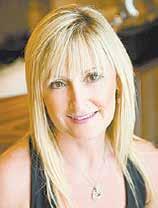
“Very few of us in this world will
ever be like Moses,” Rabbi Berg said. “But, once in a while, once or twice in a generation, there’s a Mark Jacobson, an individual who, like Moses, devotes his life and work to our ideals while knowing that we will end up passing the work to a better society, to the next generation.”

Over his long career, Jacobson has worked with 26 temple presidents, 23 rabbis of various levels of seniority, and seven educational directors. Under his watch, The Temple went through a $20 million rebuilding and expansion program, initiated an ambitious capital endowment campaign that doubled the amount of money that was expected to be raised, built a pre-school that is now at capacity, and earned accolades from the Reform movement and Newsweek Magazine that described The Temple as one of the 25 most dynamic congregations in America.
But in his retirement speech, the Temple executive director took most of his time singling out every one on his large staff for the contribution they have made to the success of the congregation.
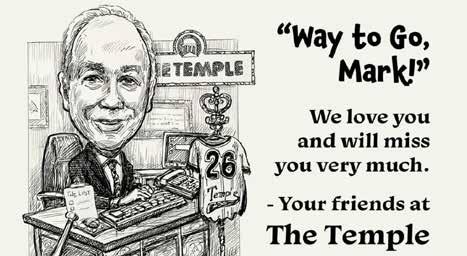
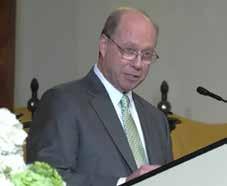
“On May 25th, 1966, I stood right here during my confirmation ceremony, and my part in that started out with the words, ‘Judaism is like a torch that illuminates all the corners of the world.’ Today, I say, thank you, my Temple family, for brightening my life and my world.” ì

ATLANTA JEWISH TIMES MARCH 31, 2023 | 11 NEWS
A video presentation that was shown during Jacobson’s retirement program was produced by Kelli Harran, Temple director of engagement.
Mark Jacobson was only a few years out of college when he was hired by The Temple.
Happy Passover Let SpecialTevents create the event of your dreams. visit: www.terrysaxeevents.net write: specialtevents@yahoo.com call: 404.216.7515 Terry Saxe, Atlanta's Event Specialist
Senior Rabbi Peter Berg hailed Jacobson as an inspirational and visionary leader.
Dorchinsky Receives 2023 Zionist Legacy Award
By Debbie Diamond
Cheryl Feingold Dorchinsky was awarded the Zionist Legacy Award from the World Zionist Organization for her work on behalf of the Atlanta Israel Coalition, a grassroots organization she founded in 2018 to unite the pro-Israel community in Atlanta and beyond.
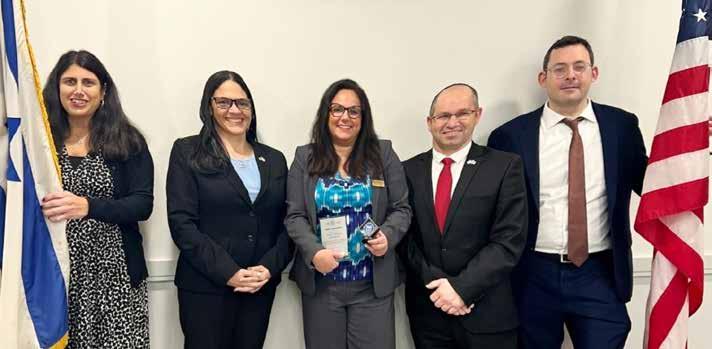
The award was presented during an Atlanta Friends of Israel event at Beth Jacob Synagogue. In recognizing Dorchinsky, the organization focused on the major impact that she and the Atlanta Israel Coalition has had in educating and advocating for Israel both in Atlanta and globally.


“Cheryl is a model for activism, ideology and Zionist leadership, not just for the Atlanta community, but for the Jewish world at large. The diaspora department of the World Zionist Organization strives to strengthen the bonds between the Jewish people and Israel. It is our belief that these two components – the people and the land – are inseparable from each other. Israel is a core part of the
Jewish identity. Regardless of a person’s religious affiliation, his connection with Israel should always remain a point of
pride in his identity. It is in this spirit that we selected Cheryl Feingold Dorchinsky as the recipient this year for her exem-
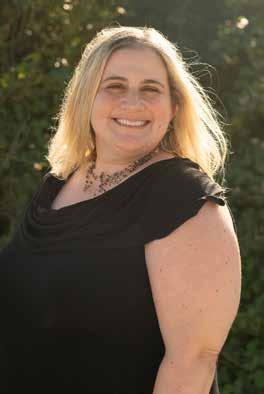
Shuman & Shuman, P.C. is a family law practice committed exclusively to guiding clients through matters of divorce and family law, custody, child support, alimony, division of property, pre- and post-nuptial agreements, post-divorce issues and a variety of other family related situations.

Attorney Eileen J. Shuman provides dedicated legal support for clients both in the courtroom and through alternative dispute resolution including mediation and collaborative divorce.
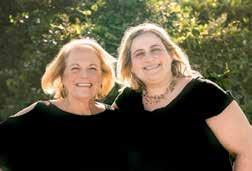
Eileen represents clients who have cases in Metro Atlanta and the surrounding counties.

12 | MARCH 31, 2023 ATLANTA JEWISH TIMES NEWS
1851 Peeler Road
Atlanta, GA. 30338 770.790.3700 | www.shumanfamilylaw.com
plary work,” said Nerya Meir, head of the diaspora department of the World Zionist Organization.
Suite A
BEST OF JEWISH ATLANTA Thank You for Voting Us Top 10 Law Firm in 2022
Happy Passover!
office@shumanfamilylaw.com
Cheryl Feingold Dorchinsky (center) with (from left) Tovah Shraga, vice president of special projects for IAC; Anat Sultan-Dadon, Counsel General of Israel; Nerya Meir, head of the diaspora department of the WZO; and Rabbi Yitzchok Tendler, executive director of Beth Jacob Atlanta.
Anat Sultan-Dadon, Consul General of Israel to the Southeastern United States, was also present and recognized Dorchinsky at the event for the work she does year-round to support Zionism and people’s connection to Israel.
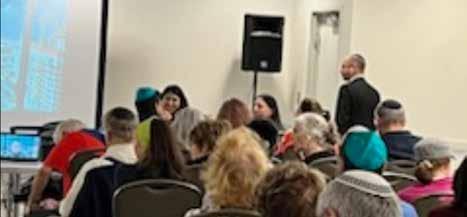
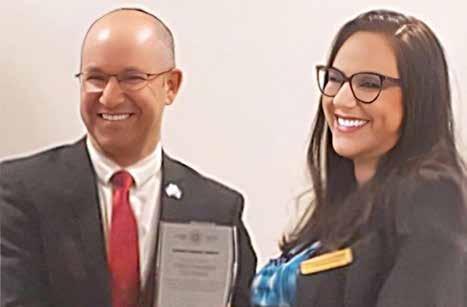

“It is not about the size of an organization. It’s about your heart and the passion you have for the state of Israel,” said Sultan-Dadon in acknowledging Dorchinsky’s work.

In accepting the award, Dorchinsky pointed out to those in attendance that they cannot take Zionism for granted. “I think Zionism is a beautiful word and that we should all embrace the term and use it more,” she stressed.
The Atlanta Israel Coalition fosters a non-partisan, multi-faith effort to amplify pro-Israel voices. Since its founding, AIC has hosted or partnered on more than 100 Israel-related educational programs and rallies. In 2022, AIC led a multi-faith Zionist global mission to Israel and an online virtual series of 12 tours throughout cities and sites in Israel. They also have hosted a variety of speakers on topics ranging from combating antiZionism and antisemitism to fighting the
BDS war in the entertainment industry. Through programming that educates, enlightens, and inspires, while simultaneously combating misinformation, the organization’s vision is a world free of anti-Zionism and antisemitism.
The Legacy Award is presented to one individual each year by the WZO. The 2022 recipient was Rob Schwartz, filmmaker and the executive producer of the documentary film, “Upheaval,” about the life of Menachem Begin. The WZO was founded by Theodore Herzl with the goal of building a Jewish state in Israel. Since the establishment of the modern state, the WZO continues to promote Zionism and strengthen the connection to Judaism, Zionism and Israel among Jewish people from around the world. Specifically, the department of Zionist activities in diaspora builds relationships with Jewish Federations, communities, and organizations all over the world to connect Jews to Israel through partnerships with local organizations, impactful experiences, and educational programs.
To get involved with the Atlanta Israel Coalition, please send an email to atlisraelco@gmail.com. ì

ATLANTA JEWISH TIMES MARCH 31, 2023 | 13 NEWS The Atlanta Perimeter Office • 4848 Ashford Dunwoody Road, Atlanta, GA 30338 770-394-2131 Office • HarryNorman.com Wishing you and your family a blessed celebration. ROBIN BLASS, REALTOR® 404-403-6561 Robin.Blass@HarryNorman.com LAUREN BLASS SOLOMON, REALTOR® 770-789-4464 Lauren.Blass@HarryNorman.com
Nerya Meir, head of the diaspora department of the WZO presents the award to Cheryl Dorchinsky on behalf of state of Israel.
Members of the community joined to watch the presentation.
Atlanta Celebrates Israel’s 75th Anniversary
By Fran M. Putney
This year, on Yom HaAtzmaut (Israel Independence Day), Israel will mark a milestone 75th (Diamond) anniversary of independence. In what promises to be an extraordinary community event, members of the Atlanta Jewish community, representatives from state and local governments, as well as non-profits will mark the occasion at the Atlanta Celebrates Israel @ 75 event on Wednesday, April 26 for an evening of solidarity, recognition, and celebration.
According to Israel Consul General to the Southeast Anat Sultan-Dadon, the Atlanta Celebrates Israel 75 program is not only a community celebration of the 75th anniversary of Israel’s independence, but also of 75 years of U.S.-Israel relations.
“The United States was the first country to recognize Israel’s independence on May 14, 1948,” Sultan-Dadon told the AJT. “From that moment, Israel and the United States have enjoyed uniquely close and extensive relations. These strong ties are reflected also in the
state of Georgia and the city of Atlanta’s relations with Israel as well.”
According to event co-chair Delilah Cohen, the Atlanta Celebrates Israel @ 75 event will take place at one of Atlanta’s most iconic spaces. Attendees will receive location details once registered for the
event, and can expect a festive evening of inspirational speakers, Israeli music and entertainment and delicious Kosher cuisine. A long list of VIPs will be attending, she said. CNN producer and speaker Nadia Bilchik will be the event presenter.

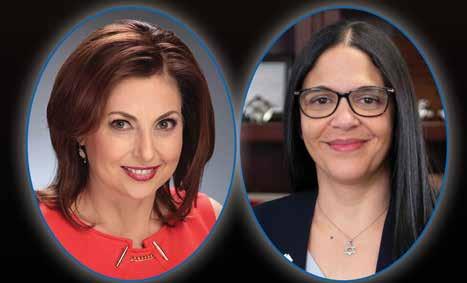

For her part, Cohen, who holds American and Israeli citizenship and describes herself as an advocate for Israel, said she sees this celebration as an
are also proudly honoring a diverse group of local leaders from different fields who each in their own way have contributed to the close relations with Israel, with the Light For Israel Awards.”
The celebration is the culmination of the efforts of more than 90 partner organizations and many sponsors. “I especially want to recognize the Michael Morris Family Foundation and the Mar-
IS RAEL ATLANTA


important way for the entire community, not just Jews, to celebrate unity for Israel.
“We need to bring together everybody, including Christians and Muslims, to show the diversity of supporters for Israel. Israel brings so much to the Middle East and to the whole world. This event gives us the opportunity to show unity and shine a light on this state that is celebrating its 75th year of independence,” said Cohen.
Consul General Sultan-Dadon, who will be the event guest speaker, said, “We
cus Foundation as the major sponsors of the event. The event is an opportunity to celebrate Israel’s 75th birthday with representatives of the wider Atlanta community, reflecting the broad support and friendship for Israel that we enjoy here,” Sultan-Dadon told the AJT.
Tickets for Atlanta Celebrates Israel @ 75 are $75 and on sale until April 20. Advance registration is required. Visit atlantacelebratesisrael75.com to purchase tickets and for more information about the honorees, event partners and sponsors. ì
14 | MARCH 31, 2023 ATLANTA JEWISH TIMES NEWS
Delilah Cohen, event co-chair of Atlanta Celebrates Israel @ 75.
ANTA 5135 Peachtree Pkwy #930, Peachtree Corners, GA 30092 (770) 817-8118 | forum@peterbrooke.com Great gifts for all occasions!
Atlanta Celebrates Israel @ 75 event presenters, CNN producer and speaker Nadia Bilchik, and Israel Consul General to the Southeast Anat Sultan-Dadon.
ATL
Light For Israel Honorees:
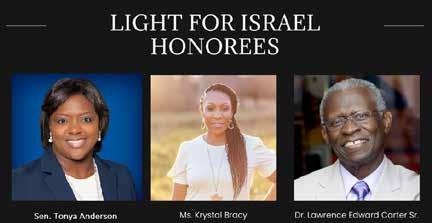


Sen. Tonya Anderson, State Senator & co-chair of Georgia-Israel Legislative Caucus
Krystal Bracy, director, Philos Black
Dr. Lawrence Edward Carter Sr., founding dean, Martin L. King Jr. International Chapel and professor of religion at Morehouse College
Dr. Robbie Friedmann, founding director Georgia International Law Enforcement Exchange, Andrew Young School of Policy Studies at Georgia State University
Darius Jones, founder and president, National Black Empowerment Council
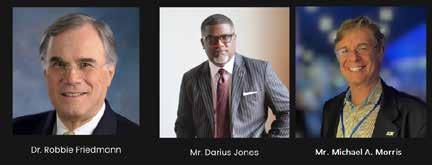
Michael Morris, owner and publisher, Atlanta Jewish Times
Doug Ross, vice chair, Birthright Israel Foundation
Samantha Strelzer, student and young professional leader
Helen Zalik, founder and president, Zalik Foundation

ATLANTA JEWISH TIMES MARCH 31, 2023 | 15 NEWS Please give to our Purim to Passover Spring Food Drive Join the Atlanta community and donate food items to the JF&CS Food Pantry. Let’s fill the shelves with goodness! Wishing you a wonderful holiday with family and friends. Visit jfcsatl.org/food-drive to learn more. HAPPY PASSOVER from your friends at JF&CS
At 85, Jerry Farber Still Has the Last Laugh
By Bob Bahr

It was standing room only and even very little of that as Jerry Farber’s many friends packed the Red Light Cafe near Piedmont Park to celebrate his 85th birthday. Despite his advancing years, the tall, lanky funnyman has lost none of his talent to keep his audience laughing, with his penchant for rapid fire, well timed and timely humor.
The organizer of the evening, Howard Osofsky, gave Farber a gentle, goodnatured ribbing before introducing him to the crowd. He reminded them that when Farber ran for Atlanta mayor in 1989, he wasn’t even registered to vote. His political pollster reminded the comedian that he had a recognition problem. Too many people, he said, knew him.
He may have been right because in that election he only received 2,100 votes, far behind the landslide winner Maynard Jackson, but just a few votes ahead of the other runners-up. They included, according to Osofsky a used car salesman, an Eastern Airlines flight attendant, and an
unemployed dishwasher. But if his popularity with voters was questionable back then, there was no doubt that during this big 85th birthday party, that Jerry Farber was loved.
Atlanta city councilwoman Mary Norwood read an official government proclamation recognizing him as “Atlanta’s Ambassador of mirth, music and storytelling and for over six decades as
an acclaimed and recognized treasure.” It went on to recount his selection as a three-time local winner of comedian of the year and his career as a longtime fixture at numerous Atlanta nightspots,
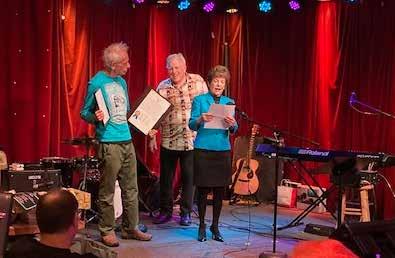
16 | MARCH 31, 2023 ATLANTA JEWISH TIMES
Councilwoman Mary Norwood presents Jerry Farber with a proclamation of appreciation passed by the Atlanta City Council.
NEWS HAPPY Passover Chag Pesach Sameach 335 Colewood Way NW Sandy Springs, GA 30328-2956 epsteinatlanta.org ai167890772330_5463 epst passover ad23_1.pdf 1 3/15/23 3:15 PM
Marilyn Monroe impressionist Sherri Winklemann serenades Jerry Farber.
including his own comedy club on Pharr Road in Buckhead.
A letter of appreciation was read from United States Sen. Jon Ossoff and he received a framed, hand-crafted laser carving of his name on black marble surmounted by a large and very imposing star.
There was a full evening of entertainment that included Sherri Winklemann doing her Marilyn Monroe impression of “My Heart Belongs To Daddy” to a very appreciative Farber. Also among the many performers during the evening was Rabbi Micah Lapidus, who teaches music at The Davis Academy. He has been a frequent performer at Neranenah, the Atlanta Jewish music festival.
Planning for the event, which began over three months ago, included a benefit for David Staton, a well-known, 55-yearold song writer and performer who has been waging a serious battle with a stage 3 cancer diagnosis. The evening, which featured an auction of an autographed guitar by Nashville star Wynonna Judd, raised more than $15,000 toward Staton’s medical bills.
Farber’s idea of celebrating his birthday over the years to raise money for those in need was something he said he learned from his parents as he was growing up in Greensboro, N.C. He pointed
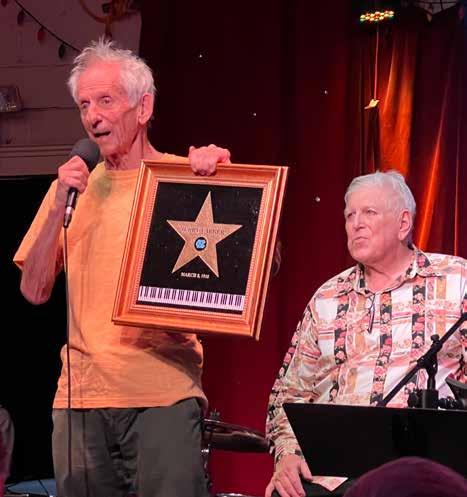
out that they always had the familiar blue and white metal box from the Jewish National Fund in the house. On their birthdays, they didn’t open presents, they donated money to those less fortunate than themselves. As Farber has grown older, he has come to fully appreciate that lesson.
“It makes you grateful to be healthy, even in my 80s, to be able to lend a helping hand. Part of that is because so many friends during my rough years didn’t leave me. They stayed around to help, and I needed help and so I guess that’s why I feel it’s so important to give back.”

A short film about Jerry’s later years was screened seven years ago at the Atlanta Jewish Film Festival. In the production he reflected on the ups and downs of his life, that included in his worst moments a raging gambling addiction that almost destroyed him. But in his 85 years, he has always had the ability to come back for the last laugh. He did again on his birthday at the Red Light Cafe.
Much of that resilience he credits to his ability to laugh at himself. It’s been a gift that has allowed him to reach across the footlights and touch an audience with his humor. Not only to help them laugh at life’s challenges but, as Farber says, to regain the strength he also needed to survive all these years. ì

ATLANTA JEWISH TIMES MARCH 31, 2023 | 17 NEWS Our assisted living is about the whole family and the whole YOU. Of course, we can help you with your daily needs. But did you know you will also have options for fitness, activities, healthy fine dining, and more? And assisted living services are tailored to you, so you’ll get just the right amount of help you need, when you request it. No matter if you need a little help or a lot, you’ll be amazed by the difference. AN SRG SENIOR LIVING COMMUNITY EQUAL HOUSING OPPORTUNITY ONSITE REHABILITATIVE SERVICES AVAILABLE 650 Phipps Boulevard NE • Atlanta, Georgia 404.496.5492 www.ThePiedmontatBuckhead.com CARF-ACCREDITED INDEPENDENT & ASSISTED LIVING LUNCH LEARN Thursday, April 13th • 11:30am Join us for an informative presentation on the benefits of senior living. Afterwards, take a tour and enjoy a delicious lunch prepared by our culinary team. To RSVP, please call 404.496.5492
Jerry Farber and Howard Osofsky with the birthday gift of a black marble star.
Jewish Atlantans Honored at Israel Bonds Conference


Longstanding Atlanta-based advocates for Israel and the Development Corporation for Israel/Israel Bonds were among Israel Bonds’ 2023 International Leadership Conference Honorees at the organization’s recent convening in Washington, D.C.
Adrian and Ilene P. Grant were among 11 honorees who were recognized at a special dinner hosted by Israeli Ambassador to the United States, Michael Herzog, at the Israeli Embassy in Washington.
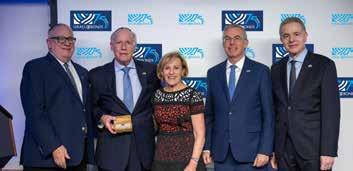
Adrian has served on the Israel Bonds National Board for the past 15 years and was chairman of the Atlanta Israel Bonds Council. Over the years, Adrian has been a member of the Atlanta boards of AIPAC, Birthright Israel, Jewish Federation of Greater Atlanta, and Friends of the Israel Defense Forces. He is a partner in the CPA and Advisory firm of Carr, Riggs & Ingram. Ilene is a retired college math professor.
“Ilene and I are so pleased to be honored by Israel Bonds,” Adrian Grant said. “We have been very involved in many Jewish organizations and boards
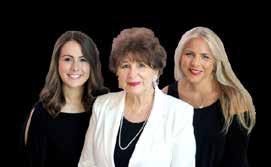
DID
supporting Israel. Israel Bonds provides us with a real opportunity to be directly involved in the growth and development of the state of Israel. It is so gratifying to visit Israel and see firsthand what Israel Bonds investments have done to enable the amazing growth and development of the state of Israel, and to help allow such a strong and vibrant economy.”
Additionally, Chuck Berk, the organization’s outgoing National Cam-

paign Advisory Council Chair, was also honored for his distinguished service to the organization. Berk, a prominent Atlanta-based businessman, is the owner and president of BCR Properties LLC. He previously owned R.S. Andrews, of Tidewater, opened a national At-Home Services Division at Home Depot and was vice president of Sears Home Improvements.
In addition to his role at Israel
HEAR?
Bonds, Berk is also the co-chair of the Republican Jewish Coalition of Atlanta and is the chairman of the Georgia Commission of the Holocaust board, appointed by Gov. Brian Kemp.
During the dinner, Berk told the audience, “I am often asked by colleagues, friends, family, what my most gratifying work has been throughout my career, and although I’m very proud of my work, my reply is always that it has taken place
18 | MARCH 31, 2023 ATLANTA JEWISH TIMES NEWS The Atlanta Perimeter Office | 4848 Ashford Dunwoody Road | Dunwoody, GA 30338 | BarocasFeldmanTeam@HarryNorman.com | HarryNorman.com (O) 770-394-2131 The above information is believed accurate, but is not warranted. This offer subject to errors, omissions, prior sale and withdrawals without notice. If your home is currently listed, this is not intended as a solicitation. AMY BAROCAS, REALTOR® (C) 404-790-0913 CALL US FOR MORE INFORMATION! PEGGY FELDMAN, REALTOR® (C) 404-310-0895 KELSEY BAROCAS, REALTOR® (C) 678-852-3169 THE BAROCAS & FELDMAN TEAM Fulton County homeowners over the age of 65 may be eligible for a new homestead exemption providing relief for the Fulton County Schools portion of property taxes!
YOU
Chuck Berk of Atlanta [center] is flanked by others recognizing his contribution to the National Campaign Advisory Council.
From left to right, Israel Bonds’ National and International Chairman of the Board Howard L. Goldstein, Adrian Grant, Ilene P. Grant, Israeli Ambassador to the United States Michael Herzog, and President and CEO of Israel Bonds Dani Naveh at Israel Bonds’ International Leadership Conference in Washington, D.C. // Photo Courtesy of Israel Bonds.
outside of business, taking a leadership role in the Jewish community, most especially with Israel Bonds. I began that work in Atlanta decades ago and, over time, I’ve joined a network of peers across the country and around the world who share my commitment to maintaining a prosperous state of Israel by investing in Israel bonds.”
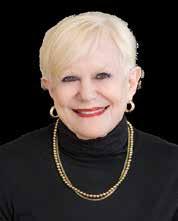
The Grants and Berk joined other honorees from across the U.S. at Israel Bonds’ International Leadership Conference in Washington, D.C., from March 12-14. Israel Bonds’ National and International Board and Council members came together to celebrate Israel’s upcoming 75th birthday.
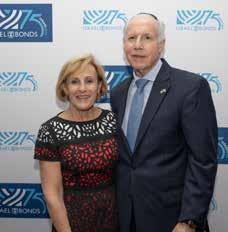
Ambassador Herzog congratulated the honorees, saying, “Israel Bonds International Leadership Conference has a special meaning this year as we mark the 75th year of independence of the Jewish, democratic State of Israel. This year, we also mark 75 years of the unique alliance between Israel and the United States of America, our closest ally. In its 75 years of existence, the State of Israel has been propelled to success by a variety of important supporters and organizations and a key one is Israel Bonds. Perhaps, it has become a cliché, but it’s true when they say, ‘it takes a village.’ Our village is made up [of these] honorees and I want to take this opportunity to congratulate and thank each and every one of you.”
Congratulating both Berk and the honorees, Israel Bonds’ National and International Chairman of the Board, Howard L. Goldstein, said, “As someone who’s been involved in Israel Bonds for over 40 years, it’s gratifying to honor outstanding advocates for the Jewish state. Each of our honorees and Chuck Berk represent what it means to be an exemplary lay leader. Together, we’ve seen Israel achieve the impossible and we’re eager to see what other triumphs are in store for the next 75 years.”
Dani Naveh, president and CEO of Israel Bonds, added, “We are so proud of Adrian and Ilene P. Grant, who are role models for unconditional support for the State of Israel and its people. Our honorees play a decisive role in Israel Bonds campaigns, with their support and their valuable introductions, which enable Israel’s rapid evolution into a global leader in pioneering cutting-edge technologies — all while making a financial investment on a personal level. This win-win proposition offered by Israel Bonds is poised to stand the test of time.
“As for Chuck Berk, Israel Bonds is grateful for his faithful service to the organization and, while I look forward to working with his successor, Larry Olschwanger, I’m confident that Chuck will continue to be a valuable resource to me and the organization as a whole.”
Berk told the AJT, “I’ve been honored to serve as Israel Bonds National Campaign Chair for three years. We generated over $1 billion in bonds investments each year.”
For 72 years, Israel Bonds has focused on one mission: to generate financial support for the building and development of Israel’s economy. Its longstanding unwavering support for Israel’s strong democratic principles and its dynamic economy is the driving force behind the organization’s vision.

As such, with political protests sweeping Israel and abroad, Israel Bonds is working through periods of heightened passions and political rhetoric that’s leading to demonstrations and protests. As a U.S.-based financial organization, Israel Bonds respects people’s rights to engage peacefully in the democratic process, both in the U.S. and in Israel. The organization continues to maintain that any attempt to politicize their work is unhelpful and misplaced. Israel Bonds does not endorse any political position of any politician, administration, or ideology. That is why it hopes people will recognize the importance of ensuring politics does not impact their good work.
Berk stated to the AJT, “Israel Bonds is not a political organization and deserves support from all Jews to strengthen our homeland. Investing in Israel counters political groups which are trying to boycott, sanction and divest in Israel.”
To date, the organization has secured more than $48 billion in investments worldwide since its first bonds were first issued in 1951, with the proceeds playing an instrumental role in Israel’s transformation into a groundbreaking global innovator in various industries. ì

Compiled by AJT Staff
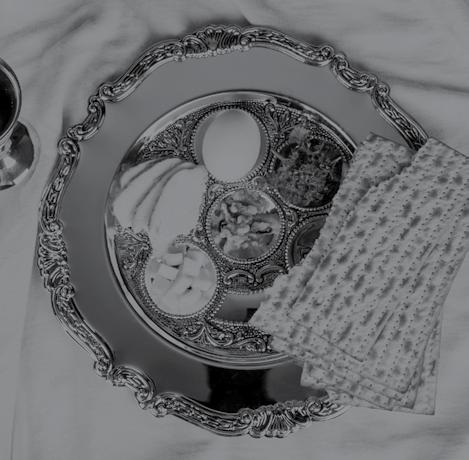
ATLANTA JEWISH TIMES MARCH 31, 2023 | 19 NEWS C: 404.281.0097 | O: 404.233.4142 Sandy.Abrams@HarryNorman.com SANDY ABRAMS HARRY NORMAN, REALTORS® 532 EAST PACES FERRY ROAD, ATLANTA, GA 30305 | 404.233.4142 | HARRYNORMAN.COM Passover HAPPY Wishing everyone a wonderful & sweet Passover! This is not an offering, which can be made only by prospectus. Read the prospectus carefully before investing to fully evaluate the risks associated with investing in Israel bonds. Issues subject to availability. Member FINRA. Photos: iStock Development Corporation for Israel Brad Young, Executive Director 404.817.3500 bradley.young@Israelbonds.com YOUR BOND WITH A NATION OF LIMITLESS POTENTIAL israelbonds.com WITH GIFTS OF ISRAEL BONDS Perpetuate the Legacy of Passover
Ilene P. Grant and Adrian Grant at Israel Bonds’ International Leadership Conference in Washington, D.C.
‘Hidden Heretics’ the Secret World of Ultra-Orthodox
By Bob Bahr
This year’s Tenenbaum Lecture at Emory University’s Tam Institute for Jewish Studies earlier this month presented a view of ultra-Orthodox life that few have been privileged to explore. It is the world of what anthropologist Ayala Fader, who teaches at Fordham University, calls “hidden heretics,” or those who have experienced what she describes as “life changing doubt.”
These are Jews, she found, who are mostly married and with children, who are imbedded in the deeply observant Hasidic communities in New York City. Nonetheless, they no longer believe in the basic religious dogma that form the spiritual backbone of their individual and communal lives. While they may still outwardly practice social and religious norms, privately, Fader said in her Tenenbaum Lecture, their doubts shape a very different approach to everyday Jewish life.
“It’s a kind of doubt that challenges the entire theological structure of extreme Jewish orthodoxy. This is life

changing doubt that often leads people to disrupt or stop religious practice.”
Professor Fader’s study of hidden heretics was the subject of her book, of the same name, which was published in 2020 and was a finalist in the National Jewish Book Award and the Sami Rohr
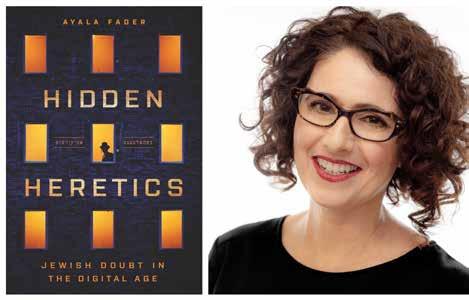
Prize for Jewish Literature. During her five years of research, she explored how men and women, often with large families of children and adolescents, navigated the difficulties that their choices about religious life presented to themselves and those close to them.
Unlike the recent Netflix series, “Unorthodox,” so-called hidden heretics have made no attempt to flee their world.
What makes “Hidden Heretics” different from recently popular books, films and other revelations of the ultra-observant Jewish lifestyle is that it does not portray these individuals fleeing from their families and the structured life they have led. They stay, to live out their lives

20 | MARCH 31, 2023 ATLANTA JEWISH TIMES NEWS
Fordham University professor Ayala Fader based her Tenenbaum Lecture on her book, “Hidden Heretics.”
surrounded by a system of belief they no longer accept.
Drawing back the curtain on this secret world, Fader describes how they live out their new lives, how they “secretly build relationships and fulfill their emerging dreams and desires,” as she describes it, despite the determined efforts of a network of rabbis and religiously observant therapists and life coaches who work to alter their behavior and their beliefs.
“Hidden heretics, also sometimes called ITC or In The Closet, are part of a broader 21st century generational crisis of authority among the ultra-Orthodox,” Fader believes. “Despite an increasingly robust demographic growth in that community, there have simultaneously been loud struggles over knowledge and truth. Hidden heretics pose dangerous questions in this context about who should have the authority for making individual life choices in the digital age?”
The book, which was written with the support of grants from the National Science Foundation and the National Foundation for the Humanities, also explores the role that computers and the Internet, as well as small, portable, smart cell phones, have played in helping to build an alternate community for those who have set themselves adrift from those around them.

It is what sets them apart, as this anthropologist of religion describes it from previous generations of the doubtful. The connections that the digital world offer allow these modern-day spiritual icono-
clasts to build trust among themselves and to arrange clandestine meetings in a world which has generally been forbidden to them.

She followed them to their chat rooms and closed groups on Facebook, Twitter, and Instagram. In the new virtual networks of friends that formed online, she also found that many had created a way to survive the depression and anxiety that often accompanied their new lives, particularly, when it came to living with a spouse who remained traditionally observant and children who maintained their belief.

“What all hidden heretics told me was that the Internet, particularly social media,” Fader told her Emory audience, “saved them from thinking that they were actually crazy, which is a common communal explanation. Or from thinking that they were alone in the world. These networks on social media and, later, in person create what I call a ‘heretical counter-public.’”
Whether these relatively small number of active non-believers can make a lasting difference in the largely insular and hierarchical world of black hats and caftans is not at all certain. But the movement, with the support of social media, Fader believes, is already making itself felt.
“I think they are actually changing their communities in interesting kinds of ways. There’s a new category that people call a Hasidic-lite or modern Hasidic, which is pushing back against some of the stringency while still embracing the esthetics of the ultra-Orthodox.” ì
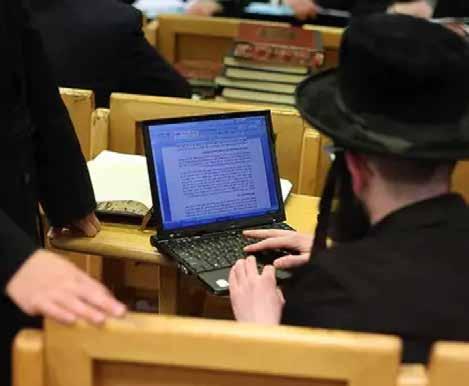
ATLANTA JEWISH TIMES MARCH 31, 2023 | 21 NEWS
Eldercare Companions Serving Atlanta and Surrounding Areas Since 2005 • Discounted Rates
Hourly and Live In Caregivers
Driving to Errands/Appointments
Exercise/Social Activities/Mind Stimulation
Meal Planning/Preparation/Cleanup
Light Housekeeping/Laundry
Medication Reminders
Assistance Showering/Dressing
Hospice Support
Short Term and Long Term Caregivers
Condition Specific Caregivers Extensive Background Checks on All Caregivers Committed to Your Safety We are strictly following CDC Guidelines for COVID-19 Author of Award Winning “Aging Parents and Options in Care” A Simple Handbook Locally Owned byAbramsHillary 770-977-9111 www.EldercareCompanions.com Thank you for Voting us Top 10 Best Home Health Care! We File Long Term Care Insurance
What sets hidden heretics apart from other non-believers among the ultra-Orthodox is their use of online social media.
•
•
•
•
•
•
•
•
•
•
Jewish Residents Upset Over Antisemitic Graffiti

 By Jan Jaben-Eilon
By Jan Jaben-Eilon
A police report was filed with the Gwinnett County Police Department a day after swastikas and Heil Hitler were
discovered March 13, drawn into pollen on a sliding board in the playground area of the Lockridge Forest subdivision. The 450-home subdivision, partly in DeKalb County and partly in Gwinnett County,



reportedly includes several Jewish homeowners who are upset at both the incident and the subdivision’s response.
The police report was filed by Chet Roberts, president of the swim and tennis committee. He sent an email three days after the discovery to members of his group, which doesn’t include the full subdivision owners, saying: “It’s been brought to our attention that some hateful rhetoric was scrawled in some pollen that had collected on one of the children’s slides. We have contacted the proper authorities regarding this issue and are putting the issue in their hands to address this particular issue.”
He also wrote that, “As a board, we have ongoing discussions about incidents that have and continue to happen at the pool that go against our rules and regulations. To address these incidents, our discussions include installation of motion lights, lighting upgrades in darker areas, camera installations and routine monitoring of the club by Gwinnett PD when available. We are asking each member of our club to maintain vigilance and report anything illegal to the proper authorities or to contact the board with any questions or concerns.”
Roberts didn’t respond to several attempts to reach him for comment.
The graffiti was discovered by California relatives of Rissa Shapiro, whom they were visiting to celebrate her mother’s 95th birthday. She said she called Roberts to let him know and she took several photos which she shared with her neighbors.
“I don’t know if it was kids or not
[responsible for the graffiti], but it was frightening,” she said. Her 11-year-old relative didn’t understand why the adults were upset, saying that he didn’t see any dirty words. So, the adults had to explain the reference to the Holocaust, which was upsetting for them.
Shapiro, who has lived in the subdivision for more than two years, said that Roberts told her that he would contact State House Rep. Esther Panitch, but when the AJT contacted her, she said she had not “yet” been contacted.
One of the residents of Lockridge Forest said she was upset not only by the graffiti, but also by her subdivision’s response. “Nothing was really done. The email was sent to the swim and tennis members but that’s not many people,” said Risa Jennison, who has lived in the subdivision about three years. She pointed out that her father lived through the Holocaust, losing all his family members except a brother.
The subdivision, she charged, “Is just sweeping it under the rug. The neighborhood needs to know what’s going on. There are a lot of Jewish people in the neighborhood,” citing some across her street and behind her house.



She added that she was particularly concerned that the five- and six-yearold children that play on the equipment would see the graffiti, which she acknowledged, was probably drawn by teenagers.
Shapiro said that the graffiti was gone days later, but she didn’t know if Roberts had cleaned it up or the rain had just washed away the pollen. ì

22 | MARCH 31, 2023 ATLANTA JEWISH TIMES NEWS
Securities offered through LPL Financial, member FINRA/SIPC. Advisory services offered through IFG Advisory, LLC, a registered investment advisor. Linea Private Wealth Management, Integrated Financial Group, and IFG Advisory, LLC are separate entities from LPL Financial. Tracking # 415550 www.lineawealth.com We can help you make it happen. What will your Generosity story be? 300 Galleria Parkway, SE, Suite 630, Atlanta, GA 30339 770-731-8500 | info@lineawealth.com
Graffiti was discovered on March 13. Police report was filed the next day.
Residents of the Lockridge Forest subdivision are upset over antisemitic messages that were written in a layer of pollen that had gathered on neighborhood playground equipment.
Reach Into the Refrigerator, Not Just the Medicine Cabinet
By Valerie, Persahd M.D., Buckhead
Dr. Pershad attended medical school at George Washington University and completed her residency in internal medicine at the North Shore University Hospital and Long Island Jewish Medical Center. She is board certified by the American Board of Internal Medicine and a Functional Medicine practitioner certified by the Institute of Functional Medicine.
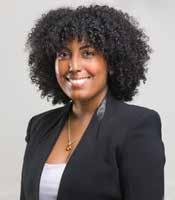
Have you and your doctor talked about “food as medicine” lately? Maybe not, so okay -- I’ll make this my chance to tell you about my patient Irma. While we’re here, let’s also talk over a swimming lesson that you’d do well to avoid.
Irma (not her real name) is a health worker, a friendly wife and mom in her early 50s. She has rheumatoid arthritis that can generate achey, swollen knees, wrists, and hands. Her rheumatologist had prescribed two medicines that were of some help, but she was hoping to avoid them -- and their side effects -- when possible, and to feel better.
This kind of arthritis is made worse by a more general clinical picture of inflammation. That, in turn, can be affected by diet, and we can be thoughtful about how we use food to support our bodies while managing a medical condition. Irma’s habits were pretty good. She doesn’t order out a lot, usually eats at home.
But, it turns out, she has a sweet tooth, and she also ate quite a lot of refined, packaged food products: white bread, pastries, breakfast cereals, waffles. We have to work along with prescribed medical treatment, but rather than reaching into the medicine cabinet again as a next step, we talked about what’s in the refrigerator.
Generally, more research is needed about how diet relates to gut health,
and specifically, how diet influences rheumatoid arthritis. But we know that over time those processed, packaged foods can have an inflammatory effect. Sometimes they even lead to the leakage of inflammatory food antigens from the gut and into the bloodstream.

My Rx: fewer starches and carbs and bready foods, and a lot more fruits and green vegetables. Sometimes foods rich in omega 3 fatty acids can help this condition, too, along with foods that have anti-inflammatory properties, like turmeric and ginger.
Changing these habits takes time and focus. Therapeutic diets are short-term and the goal is finding a long-term sustainable plan for managing this kind of chronic disease. But Irma’s symptoms over almost a year improved so much that her doctor canceled one of her meds and reduced the dosage of the other one. Now she takes regular walks of a half-hour or more, and more movement leads to an even happier body. The medication is an important aid, but the dietary changes have worked well.
As one of many recent, useful studies of food as medicine point out, this is not just about rheumatism and similar sources of joint pain. Diet can seriously affect a range of chronic disease risk factors and outcomes among patients with either pre-diabetes, type 2 diabetes, high blood pressure, elevated cholesterol levels, obesity, or a combination of these disorders.
But despite “overwhelming evidence” demonstrating the impact of diet on health, many medical schools don’t require that students take basic nutrition courses. That’s one source of trouble.
Another is that unwelcome swim I mentioned, in the Sea of Misinformation on the internet. You can even find the “waffles diet” online? C’mon now!
At least 60 percent of U.S. consumers use the internet for medical information, according to another comprehensive study released last spring. On the web, “baseless trends and sensationalist news create opportunities for misinformation to proliferate,” the study concludes. Listen to your physician, not your Twitter feed, for what you need.
When your risk factors have been carefully calculated by your doctor, and the most reasonable lifestyle alternatives are considered, then diet may well be part of the picture. It is not the whole-medicine-cabinet picture, but the whole-health picture that I help my patients strive for.
Looking for Guidance on Making Healthy Choices?
I prioritize new research and healthy lifestyle changes into my prescriptions by allowing for longer office visits and physicals. The journey to optimal health looks different for everyone, and WellcomeMD can help!
We limit memberships so that
each of my patients has far more access to time with me. My patients have my cellphone number and email address for emergencies.
Membership medicine (sometimes called “concierge medicine” reestablishes the kind of personal relationship with your physician that was once commonplace. We take advantage of the many advances in treatment and technology – treatment is more personal, pro-active, and effective.

• Consider the cost of avoiding a preventable disease, the value of early detection of serious health problems, and ready access to your doctor who knows you.
• Unhurried, 30-minute consultations or video conference appointments -- or just a quick call or text – you choose.
To schedule a tour of our practice and a free consultation with me, please call our membership director at (678) 324-5333 or visit WellcomeMD at wellcomemd.com.

ATLANTA JEWISH TIMES MARCH 31, 2023 | 23 Paid Content by WelcomeMD
ADVERTISEMENTPaid for by WelcomeMD
91 W Weiuca Rd NE Bldg A, Ste 1000 Atlanta, GA 30342 Wellcomemd.com (678) 324-5333
Valerie Pershad, M.D.
Dr. Valerie Pershad & Dr. Edward Espinosa.
JFF's CEO is Invited to White House Women’s Forum
By Debbie Diamond
Elana Frank, founder and CEO of the Jewish Fertility Foundation, was selected as one of 70 Jewish women from across the United States to participate in the inaugural Jewish Women’s Forum at the White House this month. The summit was held to commemorate Women’s History Month and bring together activists, influencers, rabbis, and others to discuss antisemitism, women’s issues and subjects related to the Jewish community.
According to Shelley Greenspan, White House policy advisor for partnerships and global engagement, “We selected Jewish female leaders who are working to improve the lives of people in their communities.”
Attendees heard from Second Gentleman Doug Emhoff, and attended briefings with several senior White House officials, including Ambassador Deborah Lipstadt, special envoy to monitor and combat antisemitism; Anne Neuberger, deputy national security advisor for cyber and emerging technology; Latifa Lyles, special assistant to the president for gender policy; and Rosie Hidalgo, senior advisor on gender-based violence and special assistant to the president. Guests also attended a special reception on Capitol Hill at the Rayburn House Office Building with Jewish women members of Congress. Those attending included Reps. Debbie Wasserman Schultz (D-FL), Jan Schakowsky (D-IL), Kathy Manning (D-NC), Elissa Slotkin (D-MI) and Sara Jacobs (D-CA), as well as Ambassador Lipstadt.
“A highlight for me was meeting Rep. Sara Jacobs and learning of her own fertility journey. I was also very impressed with Anne Neuberger, who

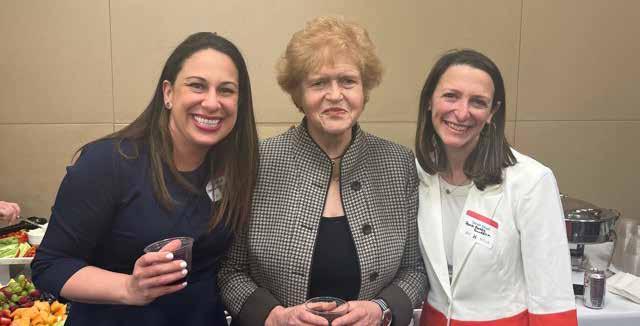
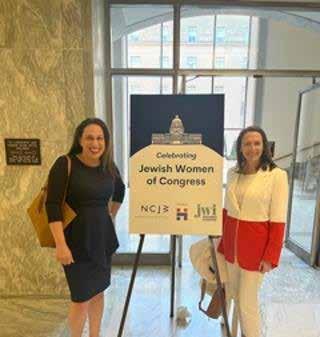
is an observant Jewish mom, originally from Borough Park. I was happy to share more about the Jewish Fertility Foundation with them and discuss reproductive rights, access, and justice,” said Frank.
“It was a gift to be at the White House among these change-making women and to have the opportunity to discuss reproductive rights with many of our country’s leaders,” she added.
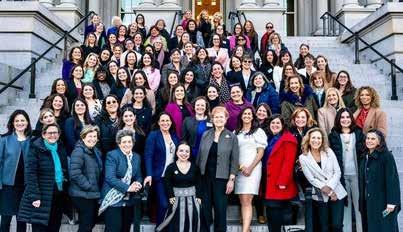
JFF, founded in 2015, provides financial assistance, educational awareness, and emotional support to people facing medical fertility challenges. Based in Atlanta, the organization also has offices in Washington, D.C., Denver, Pittsburgh, Birmingham, Cincinnati, and Tampa Bay. To date, JFF has distributed
161 grants and $1,351,000 in total grants, loans, and clinic discounts.
Frank, who has three sons, mentioned that she is fortunate to have a supportive husband, which makes a big difference as she frequently travels to the six other JFF offices. The Denver and Washington, D.C. organizations are the most recent additions, and Frank was able to spend time at the D.C. office following the Jewish Women’s Forum to meet with the JFF Advisory Council, clients, and funding partners.
Ever the involved, doting mother, Frank pointed out that the big win for her three boys was when she returned home with White House-stamped Hershey’s Kisses in hand. ì


24 | MARCH 31, 2023 ATLANTA JEWISH TIMES NEWS
Elana Frank and Sarah Shah with Deborah Lipstadt, special envoy to monitor and combat antisemitism.
The participants at the Jewish Women’s Forum gather before briefing.
JON SHAPIRO jonshapirorealtor@gmail.com 404-735-3855 RE/MAX AROUND ATLANTA 404-252-7500 www.jonshapiro.com since 1991 ON SHAPIROJGROUP The Family Business Every Home. Every Time. Happy Passover!
(From left) Elana Frank and Sarah Shah, manager of D.C. office, at the Capitol Hill event.








THE BOYS ARE BACK APR 6-12 AT TRUIST PARK *First 15,000 fans *First 3,000 kids GIVEAWAYS & CELEBRATIONS B-RUSH KIDS GIVEAWAY* APR 9 BLOOPER BOBBLEBODY GIVEAWAY* APR 11 TOGETHER WITH 2022 AWARD WINNERS RECOGNITION APR 7 MAGNETIC SCHEDULE GIVEAWAY APR 6 & 7 MARCH / APRIL HW HSTLSD CINKC SDSDHOU MI AMNY MAY LB MI TORTXTAS ADPHIP PHOA JUNE 67 ARMNSH DETDCOLC COIPCIN MIN JULY CLECLETB ALL-SCW MIL BOSB RZ MIL LA AUG AACCHC CPNY MNYNYYSFSF MNYMSF COOL SEPT CT AD WS LALS PH MIHISH CH 2023 SCHEDULE BRAVES.COM/TICKETS APR 6-9 APR 10-12 PRESENTED BY
Atlanta Rabbis Tread Softly Into Israeli Crisis
By Jan Jaben-Eilon
For the last 12 weeks, hundreds of thousands of Israelis have flocked to the streets to protest the efforts of Prime Minister Benjamin Netanyahu’s coalition government to overhaul the country’s judicial system. Most recently, more than one-half million Israelis carried Israeli flags and various posters in more than 100 cities across the country to plead with the government to halt what critics are calling a drastic change in the country’s balance of power that would result in a loss of democracy.
And for the last five weeks – through the last Saturday of March – Israelis in Atlanta, as well as concerned American Jews, have held supportive protests in front of the Consulate General of Israel to the Southeast in Midtown Atlanta. At the same time, however, only a few Atlanta rabbis have dared to tackle the controversial subject at their congregations.
Temple Sinai is one exception to that apparent rule. For weeks, in the Reform congregation’s newsletters, the rabbis have boldly broached the subject. “We
are definitely finding ways to address the judicial upheaval and growing rifts in Israeli society,” said Senior Rabbi Ron Segal. In addition to visiting teachers and Shabbat morning Torah studies, Temple Sinai is also planning a virtual evening discussion after Passover “to which all in the congregation will be invited.”

And that is how most Atlanta rabbis appear to be addressing the current crisis
“Many of us are holding space for conversations within our congregations, but [we] are taking the lead from our community Israelis at this point,” noted Temple Beth Tikvah Rabbi Alexandria Shuval-Weiner
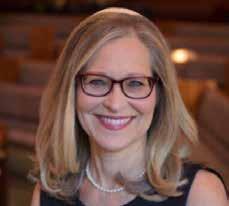
in Israel’s democracy, if at all: Only within their congregations. As Temple Beth Tikvah Rabbi Alexandria Shuval-Weiner noted, “Many of us are holding space for conversations within our congregations, but [we] are taking the lead from our community Israelis at this point.”
As president of the Atlanta Rabbinical Association, Shuval-Weiner added that “there is no ARA coordinated programming taking place at this time.”
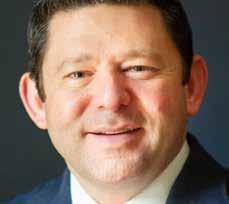
In other congregations, the discussions about the turmoil occurring in Israeli society are kept very hush-hush, with only congregants invited and nonmembers strictly kept away. The conversations are “designed to be a safe place to learn and ask questions,” as one rabbi described it.
On the other hand, Rabbi Natan Trief, director of adult learning at Temple Sinai, was open about the 10-part Melton class focused on Israeli identity that he just started teaching in March. “We are discussing the upheaval at length,” he said. But again, the classes are only for Temple Sinai congregants.
Trief, who holds an Israeli passport along with his American passport, told the AJT that among his congregants, he detects “mostly confusion and consternation. There’s a lot of anxiety as they learn more. Many feel the judicial overhaul caught everyone by surprise.” As he pointed out, Netanyahu’s Likud Party didn’t talk about its plans for the judiciary prior to last November’s election.
While he tries to present both sides of the argument concerning the Israeli government’s legislative proposals, the “frightening pace they’re pushing this through,” is also of concern. As recently as March 23, Netanyahu reiterated that his government plans to approve its judicial changes before Passover, when the
“The consistent message is that you can love a country and not agree with any given administration or its policies,” according to Temple Kol Emeth Senior Rabbi Larry Sernovitz
Knesset – Israel’s legislature – starts its spring hiatus for the month of April.
“We never shy away from talking about Israel,” Trief said about his congregation. “Israel is my passion, and it would be a tragedy if the synagogue avoided it because it was too hot an issue.” Trief, who made Aliyah while in his 20s, met his wife, Temple Sinai Rabbi Samantha Shabman Trief, in Israel.
In his Melton classes at Sinai, Trief focuses on Jewish identity in Israel. The course had been planned due to Israel’s upcoming 75th anniversary, April 26, but the current crisis is addressed because “this legislation has to do with identity politics.”
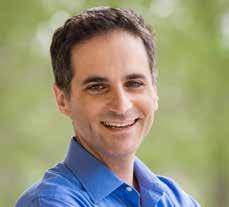
Of the 36 congregants who attend the classes, many had not heard about the onslaught of protests in Israel that now include dozens of Holocaust survivors who contend that they have lived through a similar experience, and, more significantly, hundreds, if not thousands, of army reservists who have announced that they won’t report for duty.
“There is not exactly a consensus” among the Melton students, Trief said, but he has seen only one email defending the government’s judicial overhaul.
More than one Atlanta rabbi is carefully watching the experience in other congregations before tackling the controversy head-on. But Senior Rabbi Larry Sernovitz at Temple Kol Emeth, told the AJT that in anticipation of his congregation’s trip to Israel in May, they “will be having an orientation that includes both the history of Israel and what is going on now. The consistent message is that you can love a country and not agree with any given administration or its policies. We must continue to learn and make our voices heard when we disagree. This is the hallmark of what a democracy is all about.” ì
26 | MARCH 31, 2023 ATLANTA JEWISH TIMES NEWS
“Israel is my passion, and it would be a tragedy if the synagogue avoided it because it was too hot an issue,” said Temple Sinai’s Rabbi Natan Trief


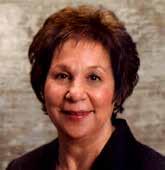
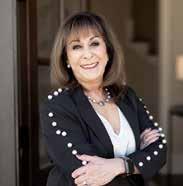
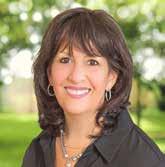
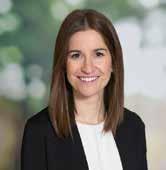
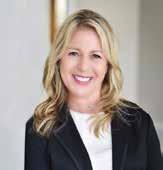
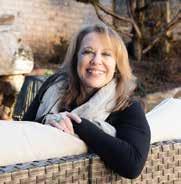
ATLANTA JEWISH TIMES MARCH 31, 2023 | 27 The Atlanta Perimeter office • 4848 Ashford Dunwoody Road, Atlanta, GA 30338 • 770-394-2131 Office • HarryNorman.com KELSEY BAROCAS 678-852-3169 Best wishes of good health to you and your family, from ours! H appy P assover If your home is currently listed for sale, this is not intended as solicitation. PEGGY FELDMAN 404-310-0895 AMY BAROCAS 404-790-0913 MELANIE WHITE 404-915-9622 GLORIA MILLER 404-580-0181 STAR NEWMAN 678-360-8615 CAROL YOUNG 404-326-9236 DANA ROTENSTREICH 919-539-7619 ROBYN G. ZIMMERMAN 404-219-2191
Team Israel Outmatched at World Baseball Classic

There’s a reason they called it the “Pool of Death.”
After a stirring 3-1 openinground, Game 1 win against Nicaragua in the World Baseball Classic, Team Israel dropped its next three games against the heavyweights of Pool D—Puerto Rico, Dominican Republic, and Venezuela, by scores of 10-0, 10-0, and 5-1, respectively—resulting in their elimination from this year’s WBC.
David Ostrowsky

Unlike the 2017 edition of Team Israel, which had an impressive run given its many amateur and Minor League players, this year’s club, managed by firsttime skipper and former big league AllStar Ian Kinsler, was stacked with Major Leaguers, albeit without the services of Max Fried and Alex Bregman, the latter of whom opted out, primarily because

he is recovering from a broken left index finger suffered during the World Series.
Team Israel was outscored by a col-
lective margin of 25-1 in its final three games (it didn’t get a runner on base in the shutout loss to Puerto Rico) but, by virtue of finishing in fourth place out of the five-team pool, Israel punched its ticket to the next World Baseball Classic in 2026.
“It’s a good gauge for these guys to understand the level of play, what it takes to win games here,” said Kinsler before Team Israel took on Venezuela in its final WBC game. “I think in the past Team Israel has been in pools that are a little bit more friendly.
“You know, this is obviously…going into the tournament everyone knew this pool was the most difficult. Basically, three All-Star teams, Major League AllStar teams. It was very difficult for Team Israel, ourselves, and Nicaragua. It’s just a difficult pool.
“So, for our players, for them to understand that, to experience that, and know what it feels like to play at this level, is important.”
Hours later, following Israel’s 5-1 loss to Ronald Acuña, Jr. and the Venezuela team, one that would ultimately fall to the U.S. in the quarterfinals, Kinsler was asked what he considered to be the highlight of Team Israel’s four-game stint at the WBC, held at Miami’s LoanDepot Park earlier this month. The answer: the eye-opening performance of Jacob Steinmetz, the 19-year-old native of Woodmere, N.Y., who became the first Orthodox Jew to be drafted by Major League Baseball when the Arizona Diamondbacks called
his name in the third round of the 2021 MLB Draft.
Indeed, in Team Israel’s third game of this year’s WBC, an eventual 10-0 loss to the DR, Steinmetz showed tremendous poise while flashing signs of boundless potential by whiffing three household names: six-time All-Star Manny Machado, two-time All-Star Gary Sánchez, and 2022 ALCS and World Series MVP Jeremy Peña. Although Kinsler, well aware of Arizona’s investment in the young righty, pulled Steinmetz in the second frame, the stud teen pitcher faced the entire Dominican lineup while only yielding two hits and a single run.
“It’s a good experience for him [Steinmetz],” noted Kinsler. “It’s the loudest environment he is ever going to pitch in. He is a young age right now. He is still learning. So that’s really going to help him moving forward.
“But, you know, stuff-wise, he really showed up. He was able to calm himself down, keep his composure and throw the ball well against an obviously all-star lineup. I think it was a big confidencebuilder for him.”
For Team Israel, there were confidence-builders throughout the four games in South Florida, even though the final three contests ended in lopsided defeats. Against Nicaragua, in the opener of Pool D play, the Israel ballclub, one whose journey has been largely supported by Jewish National Fund-USA and its Project Baseball initiative, was down 1-0 in the eighth inning facing Jonathan
28 | MARCH 31, 2023 ATLANTA JEWISH TIMES SPORTS
Garrett Stubbs, who has been on two different pennant-winning teams over the past couple Octobers, had the biggest hit for Team Israel during this past World Baseball Classic with his two-run double against Nicaragua // Photo Credit: Rob Tringali/MLB Photos
Loáisiga, the standout reliever for the New York Yankees. After Spencer Horwitz (Triple-A prospect for the Toronto Blue Jays) cracked an RBI single to tie the game, Philadelphia Phillies catcher Garrett Stubbs, who would later be removed from the World Baseball Classic with a sore knee and replaced with his younger brother, C.J., blasted a two-run double to the left-center field gap to seal the 3-1 win. Five Israel pitchers, including IsraelAmerican starter Dean Kremer (Baltimore Orioles) limited Nicaragua to four hits while punching out 12, while big league veteran Robert Stock pitched a scoreless ninth inning to get the save.
Like many teams in the WBC whose players ultimately declined to participate because they are nursing injuries or mindful of not risking them when free agency looms, Israel’s eventual roster looked very different from how it was projected to be.

“Going into the next WBC, to be able to get commitments from the players that are eligible to play that are good big-league players,” Kinsler responded when he was asked on the final day of Israel’s WBC competition of what was needed for the team to take the next step. “So next WBC, if there’s a way for us to get ahead of that and have the roster that is available to us, I think would be important.”
Although it is unknown whether Kinsler will be the skipper for Team Israel in three years, the WBC managerial experience certainly helped him reconnect with his Jewish roots.
“Having to go to Israel and gain my citizenship was very eye opening,” acknowledged Kinsler, whose father is Jewish and grew up celebrating Chanukah and Passover on occasion. “Just getting all the information and everything that country has to offer and the historical background of the Jewish people, really, and the country of Israel.
“It just brings you closer. You just learn more and more about yourself and your family and how and why all of this is happening. I don’t think I even really know still, but the more you learn, the closer you feel for sure.” ì
PREPARE YOURSELF FOR A WORLD OF WONDER.
With incredible exhibits and over 11 million gallons of aquatic wonders, there’s more fun around every corner at Georgia Aquarium. Get tickets today at georgiaaquarium.org

ATLANTA JEWISH TIMES MARCH 31, 2023 | 29 SPORTS
Nineteen-year-old Jacob Steinmetz caught the attention of baseball fans worldwide--not to mention All-Stars on the Dominican Republic team--with his impressive work in Game 3 // Photo Credit: Rob Tringali/MLB Photos
Jewish NHL Winger is Also a Published Author
By David Ostrowsky
A search for Edmonton Oilers left wing Zach Hyman on Amazon doesn’t bring up any signed memorabilia or game-used gear—like there would be for many pro athletes in one of the four major North American sports. But it does bring up books—not about him—but, rather, by him.

Indeed, the 30-year-old Toronto native and eight-year NHL veteran whose Jewish day school education began at the United Synagogue Day School and continued at the Community Hebrew Academy of Toronto Tanenbaum Campus for high school, where he met his future wife, Alannah, with whom he now has two young sons, is the proud author of multiple children’s books.
Last decade, during the early years of his NHL career, which he spent for his hometown Maple Leafs, Hyman wrote three picture books for young readers: “The Bambino and Me” (a baseball fantasy set in 1920s New York, featuring Babe Ruth, that touches on the nostalgia of childhood summers); “Hockey Hero” (a feel-good story about a shy young boy who finds his hockey chutzpah at a PeeWee tournament); and “The Magician’s Secret” (an action-adventure tale featuring a grandfather and grandson duo). All three books garnered strong literary reviews, proved to be commercial successes, and continue to sell well today.
But now that he’s a father of an infant and toddler, ironically (or perhaps, understandably) plans for writing more children’s books have been put on ice.
“I have two little boys so I’m busy. I have my hands full with them,” he acknowledged to the Atlanta Jewish Times during a recent interview.
He’s also got his hands full with hockey. This spring, in fact, he’s hoping to author a happy ending to what’s been a storybook season for him personally, having recently cracked the 30-goal mark for the first time while racking up assists at a prolific rate in helping the Oilers contend for their first Stanley Cup title since 1990.
Not that he cares to go into detail about his personal accomplishments; discussion about his career-best season invariably shifts toward the team, the one with the league’s two premier offensive players, Leon Draisaitl and Connor McDavid, the latter of whom is a generational talent and putting the finishing touches on a career year himself.
“We have a great team,” Hyman responded when asked about his outlook
for the balance of the 2022-23 campaign. “We’re just going at it and just trying to win these close playoff-like games. It has been really fun. It has been awesome. We have got a good group of guys.”
What’s been the key for the breakout campaign?
“Just trying to improve every year. Just going into the hard areas and trying to capitalize a little bit more.”
Hyman, who was chosen by the Florida Panthers in the third round (No. 123) of the 2010 NHL Draft and, ultimately, tallied 185 points (86 goals, 99 assists) in 345 regular-season games with the Maple Leafs, may not care for bringing attention to his personal on-ice achievements, but he is intent on bringing awareness to societal antisemitism. In late January 2022, his Oilers were visiting the Ottawa Senators when the now-infamous truckers’ rally protesting pandemic precautions rolled through Canada’s capital. There was an abundance of Nazi-related signs and banners on full display and, as a lifelong devout Jew, Hyman felt inclined to share his thoughts publicly.
“It’s disturbing and disheartening to see that antisemitism is on the rise, unfortunately, which is crazy nowadays,” Hyman said in an interview with The Athletic. “Seeing that and being Jewish and
being proud of my heritage — and it was just Holocaust Memorial Day a couple days ago — and it was right around the time the swastikas were up.
“Hopefully, I can bring awareness that things like that aren’t OK. It was just disturbing to see that.”
One of the primary reasons that Hyman signed with the Edmonton Oilers as a free agent in July 2021 was because the capital of Alberta has a vibrant Jewish community. And, true to form, several months later in December 2021, he lit the first candle of Chanukah at the Giant Menorah Lighting in Edmonton with Chabad Rabbi Ari Drelich.

For the hockey-crazed city of Edmonton that lives and dies with the fortunes of its beloved Oilers team, he’s also been a good fit from a public relations perspective. A sizable media contingent hovers around the team on a daily basis and the ever poised and accountable Hyman is a go-to skater for a thoughtful postgame soundbite, win or lose. Such graciousness was on full display when Hyman met with reporters following his team’s 7-4 loss to the Maple Leafs earlier this month—his first true homecoming (Canadian rinks remained mostly vacant last year) and one in which his guys were ambushed for six goals over the final two periods.
“Going forward, you’re going to play only good teams in the playoffs and teams like Toronto who have that kind of firepower,” he noted. “And you’ve got to be able to learn how to stop momentum. You’ve got to be able to find a way to stop the bleeding and to find your game again, especially in a building that’s excited about the game.”
After this season, Hyman’s got five years remaining on the seven-year, $38.5 million contract he signed in summer 2021, one that’s looking like a nifty teamfriendly bargain at this hour. The deal was structured in such a way that the Oilers will have the flexibility to buyout its final two years when Hyman hits his mid-30s—a time when many a hockey player starts breaking down from years of jolting mid-ice collisions and boneshattering forechecks. But at this point, it’s hard to imagine the Oilers brass going in that direction.
“Zach is a Swiss Army knife type of player,” said Edmonton head coach Jay Woodcroft. “He’s good on the wall. He’s a foxhole and trenches type player. Someone who takes pride in the little details in his game. He goes to hard places. He does work for other people. He’s integral to everything we have going on right now here with our team in Edmonton.” ì
30 | MARCH 31, 2023 ATLANTA JEWISH TIMES
SPORTS
While often overshadowed by superstar teammate Connor McDavid, Zach Hyman is quietly enjoying a breakout season for Edmonton this year.
Zach Hyman is a man of many talents. The Edmonton Oilers’ sturdy left winger is an accomplished children’s author who has three books to his name // Photos Courtesy of Edmonton Oilers Hockey Club.

Sheba Medical Center Hosts Pediatric Cancer Treatment Symposium
Sheba Medical Center, Israel’s largest medical center and a Newsweek ranked world’s best hospital for the last five years, hosted a first-of-its-kind pediatric cancer treatment symposium for Palestinian healthcare professionals from the West Bank and Gaza. The event, hosted in Sheba’s
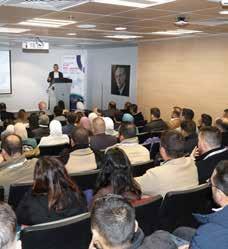
Today in Israeli History
ISRAEL PRIDE
TODAY IN ISRAELI HISTORY
Edmond and Lily Safra Children’s Hospital, aimed to empower medical students and healthcare professionals from the region by highlighting the latest advances and innovations in cancer treatment, including CAR T-cell therapy, and outlining Sheba’s unique approach to pediatric cancer care.
“We are hosting our Palestinian colleagues today not just to share with them the latest innovations and advancements in pediatric cancer treatment, but because collaboration with Palestinian physicians and health institutions is key to advancing healthcare in the region,” said Prof. Itai Pessach, director of the Edmond and Lily Safra Children’s Hospital, in his opening address. “We are committed to working together to make a meaningful difference to the lives of our patients, and theirs, and to promoting peace and cooperation in the field of medicine.”
Titled ‘Recent Advances in Cancer Treatment 2023,’ the symposium was attended by leading Sheba oncologists, and clinicians and healthcare providers from the West Bank and Gaza alongside senior figures from the Palestinian Authority Health Ministry. The event provided an invaluable platform for participants to meet and exchange knowledge, experience, and ideas on how to advance pediatric cancer treatment in the region.
April 4, 1920: The Nebi Musa festival, a pilgrimage to the site Muslims believe to be Moses’ grave near Jericho, breaks into rioting in Jerusalem’s Old City, killing five Jews and four Arabs over three days.
Runners Race to Save Lives in Jerusalem Marathon
Nearly 200 people recently ran in support of United Hatzalah in the Jerusalem Marathon. The runners, ranging in age from 1 to 89 years old have raised more than $100,000 in support of the communitybased EMS organization ahead of the race. The sum will go towards purchasing new vehicles and medical equipment, as well as training additional volunteers.
This year, a significant portion of those running for United Hatzalah ran as part of Team Avraham, named after a teenager, Avigdor Chai Avraham Lifshutz z”l, who passed away two years ago. Avigdor Avraham’s father, Mark, told Eli Beer prior to

the race that his son was a big fan of United Hatzalah’s efforts and read about the organization through the stories that are printed in a weekly periodical known as the Torah Tidbits. The Lifschitz family invited friends and relatives to run and raise funds in order to donate a rescue ATV in his memory. The ATV is a powerful four-wheel vehicle that will be used for rescue operations in locations where the terrain doesn’t allow access by ambulance or motorcycle.
Among the runners were also 11 United Hatzalah volunteer first responders.
Runners met with United Hatzalah president and founder Eli Beer, who thanked them for their efforts on behalf of the organization.
“You are all becoming partners in our lifesaving mission,” Beer told them. “There are times in my life when I get inspired, and I am inspired by all of you. For weeks, you have been training and fundraising before the race. It required significant effort and time on your part. You are not only going to run, you are literally going to save lives. I want to thank you from the bottom of my heart. Drink enough water before and during the run, and most importantly, enjoy the run through the beautiful streets of Jerusalem.”
Compiled by AJT Staff
April 12, 1951: The Knesset establishes the 27th of Nisan as Yom HaShoah, Holocaust Memorial Day. The date is chosen because it is close to the start of the Warsaw Ghetto uprising without intruding on Passover.
Gali Atari and Milk & Honey perform “Hallelujah” at the 1979 Eurovision Song Contest.

March 31, 1979: Israel wins the Eurovision Song Contest for the second consecutive year as Gali Atari and Milk & Honey take the title in Jerusalem with “Hallelujah.” Israel won in 1978 with “A-Ba-ni-bi.”
April 1, 1948: Nine Jews are killed and 17 others are wounded in an attempt to move a 60-truck convoy of food and other supplies to Jerusalem through Wadi Sarrar. It is the second time the convoy has failed.
April 2, 1947: The British government notifies the United Nations that it plans to bring Palestine’s future before the next General Assembly session and that it wants a special commission to make recommendations.
April 3, 1994: Maj. Gen. Aharon Remez dies in Jerusalem at 74. A fighter pilot with the Royal Air Force in World War II, he served as the second commander in chief of Israel’s air force from July 1948 to December 1950.

April 5, 1977: Tennis player Jonathan Erlich, known as Yoni, is born in Buenos Aires. His family makes aliyah when he is one. He teams with fellow Israeli Andy Ram to win the Australian Open in January 2008.

April 6, 1999: An IDF medical mission flies to the former Yugoslav republic of Macedonia (now North Macedonia) to care for refugees from Kosovo. The hospital treats more than 1,560 people in 16 days.
April 7, 1977: Maccabi Tel Aviv wins its first European basketball championship by defeating the two-time defending champions, Mobilgirgi Varese of Italy, after upsetting the Soviet team CSKA Moscow in the semifinals.
April 8, 1929: The fourth Palestine and Near East Exhibition opens in Tel Aviv, which is celebrating its 20th anniversary, to showcase the commercial and industrial activity of the Jewish area of settlement.

April 9, 1973: Ehud Barak leads a successful seaborne commando raid on Beirut to kill three PLO officials connected to the Munich Olympics massacre: Mohammed Yousef al-Najjar, Kamal Adwan and Kamal Nasser.
April 10, 2002: Eight passengers on a commuter bus in Haifa, including the 18-year-old niece of Israel’s U.N. ambassador, are killed in a Second Intifada suicide bombing claimed by both Hamas and Islamic Jihad.
April 11, 1909: Sixty-six families gather on the dunes outside Jaffa to claim lots in the new neighborhood of Ahuzat Bayit (“Homestead”), marking the founding of Tel Aviv. White and gray seashells connect families to lots.
April 13, 1971: Israeli Prime Minister Golda Meir meets with leaders of the Black Panthers, a Mizrahi activist group protesting social injustice and discrimination. The group is not affiliated with the U.S. Black Panthers.

April 14, 1871: Germany is established as an empire under Prussia’s Wilhelm I, expanding the civil and political rights granted to Jews in some German states in 1869. But emancipation inspires more virulent antisemitism.
Items are provided by the Center for Israel Education (israeled.org), where you can find more details.

32 | MARCH 31, 2023 ATLANTA JEWISH TIMES
Marathon runners are pictured after running in the Jerusalem Marathon to support United Hatzalah // Photo Credit: United Hatzalah
Sheba Medical Center hosted a firstof-its-kind pediatric cancer treatment symposium for Palestinian healthcare professionals from the West Bank and Gaza.
Jonathan Erlich has won 20 professional doubles titles.
// By si.robi via Wikimedia Commons
A poster promotes the 1929 Palestine and Near East Exhibition in Tel Aviv.
A Black Panther poster in Hebrew reads, “War on poverty — not the poor.”
While we will charge $75 per ticket to help defray costs, it will not be enough to fully underwrite the occasion. Our hope is that families like yours, who are pillars of leadership in our community, will consider sponsoring the event at $25,000 Level, but of course every amount will be greatly appreciated.



Global Speaker and CNN Producer, Nadia Bilchik
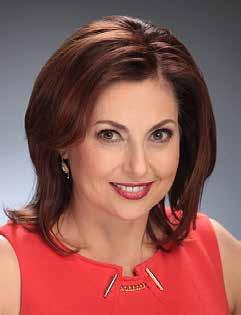
Guest Speaker

Consul General of Israel to the Southeast, Anat Sultan-Dadon
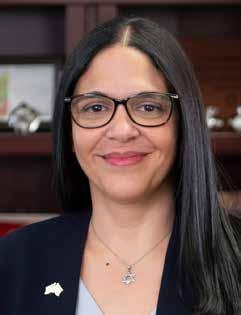

ATLANTA JEWISH TIMES MARCH 31, 2023 | 33 www.AtlantaCelebratesIsrael75.com Come and Celebrate Israel’s 75th Anniversary with Us Reception and Program
Ha’atzmaut, Wednesday April 26, 2023 at 6 p.m.
Yom
Atlanta Celebrates Israel’s 75th Become a Sponsor Today www.AtlantaCelebratesIsrael75.com Get Your Ticket Now
Event Presenter
Why Doesn’t Israel Have a Constitution?
 By Jan Jaben-Eilon
By Jan Jaben-Eilon
For 20 years, the Jerusalem-based Israel Democracy Institute, co-founded by Bernie Marcus, has been advocating for Israel to create and adopt a constitution. The current crisis in Israel that has spurred hundreds of thousands of IDF reserve officers, high-tech entrepreneurs, academics, economists, and average citizens to protest all over the country finally may provide the impetus to do so.
That crisis resulted from the current right-wing government’s aggressive drive to swiftly pass legislation that would overhaul Israel’s judicial system. Of the eight specific efforts to change the rules that, critics say, will weaken the judiciary, one has already passed in the Knesset, as of this newspaper’s deadline. The goal of the coalition government, led by Prime Minister Benjamin Netanyahu, is to pass as many of the bills as possible by Passover, when the Knesset starts its spring vacation.
“I hope this crisis won’t be wasted,”
said IDI President Yohanan Plesner, in an interview with the AJT when he was in the United States for the Jewish Funders Network International Conference in March. “We’re in a constitutional crisis with signs of a potential implosion,” which, he said, is the result of a lack of state constitution.
The U.S. Constitution was passed in 1789, superseding the Articles of Confederation which were created in 1777, nearly a year and a half after the country declared its independence. The constitution defines the fundamental basis of U.S. federal law outlining three principal branches of the government and their jurisdictions. It is the oldest written national constitution currently in effect.
Israel is about to celebrate the 75th anniversary of its declared independence in 1948. The country didn’t adopt a constitution at that time because the ultra-Orthodox parties at the time vetoed it. Plesner said the fact that Israel doesn’t have a constitution means it has an “extremely fragile constitutional founda-
tion. A constitution sets the rules of how to govern a country so in moments of crisis like this, the weakness is being mani-

fested.”
He explained that instead of a constitution, the country built a quasi-con-

34 | MARCH 31, 2023 ATLANTA JEWISH TIMES ISRAEL NEWS
SCHEDULE YOUR TOUR TODAY! (404) 602-0569 ALL-INCLUSIVE RETIREMENT LIVING 335 Hammond Drive | Sandy Springs, GA 30328 | HammondGlen.com 24/7 Dining with Chef-Prepared Meals Newly Remodeled Apartments Daily Wellness and Fitness Programs Transportation to Appointments and More!
“We’re in a constitutional crisis with signs of a potential implosion,” which, IDI President Yohanan Plesner said, is the result of a lack of state constitution.
stitution in chapters, known as Basic Laws. But there is no special procedure on what is required to pass a Basic Law, so they “are not protected in any way. Only a simple majority is needed to sufficiently change the checks and balance.” And that is what the current government is doing with its proposed set of legislation.
Unlike the U.S., the executive and legislative branches overlap. If the current legislation is passed, the executive branch will have more power over the currently independent judiciary branch.
According to Plesner, Marcus and the late U.S. Sec. of State George P. Shultz – once chairman of IDI’s International Advisory Council – were the visionaries behind IDI’s move to create a blueprint for the country’s eventual constitution. They “realized it was too risky for an Israel with a divided and diverse society… to survive without an agreement on the rules of the game.”
IDI, an independent center of research dedicated to strengthening the foundations of Israel democracy founded in 1991, drafted a “Constitution by Consensus” that included proposals to entrench basic rights on equality, along with recommendations for a formula to define the separation of powers in Israel. The Institute is revising its proposal for Israel’s 75th birthday.
According to the IDI website, explaining the “Constitution by Consensus,” it is the product of two years of deliberations by 100 public figures from across the political spectrum, and it is the “first attempt in the history of Israel
to trace the contours of a constitutional order that is potentially acceptable to a large majority of the population. Due to its success in capturing the elusive balance between the Jewish and democratic foundations of the State, IDI’s draft has become the basis for the constitutional debate taking place in the Knesset today.”
One goal of the “Constitution by Consensus” is to anchor the commitment to the principles stated in Israel’s Declaration of Independence. Another aspect will be to complete a Bill of Rights.

“In hindsight,” said Plesner, “it was premature” when the blueprint was first proposed. “There was not enough ripeness.” He said the country “missed our previous constitutional moment,” but he is hopeful that the country is ready for a constitution now. Representatives from the IDI have been meeting with Israeli President Isaac Herzog who has tried to bridge a compromise between the coalition government and the opponents of the proposed judicial overhaul.
“This is a most serious proposal. It provides a framework,” but doesn’t solve all the problems of religion and state, said Plesner. But he believes it is the minimum required for now.

In addition to working with Herzog, the IDI is trying to educate the Israeli public about the proposed framework for a constitution. Plesner said polling shows that 70 percent of the Israeli public think the country needs a constitution.
“The leaders shouldn’t let this constitutional moment go to waste,” he stressed. ì
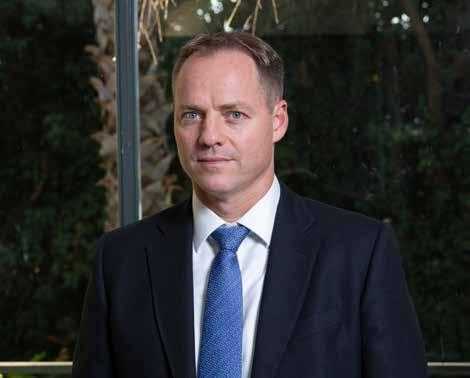
ATLANTA JEWISH TIMES MARCH 31, 2023 | 35
ISRAEL NEWS
chattnaturecenter.org/awe | 770.992.2055 9135 Willeo Road | Roswell, GA 30075 celebrate nature FRIDAY, APRIL 14 | 6:30-11PM PURCHASE TICKETS TODAY » Drinks, Dinner & Dessert » Live Music and Auction » Individual tickets or full tables available » Support CNC and become a sponsor
New Hillel UGA Building Opening This Fall Molly Blank Concert Series Connects Generations
Hillels of Georgia and Hillel UGA are pleased to announce the public phase of their capital campaign to develop a new facility, centrally located across the street from the UGA campus. Hillel UGA will serve as home to its 1,500 Jewish students, its programs, and activities, as well as support other university initiatives and serve as a gathering place for the Athens Jewish community. To date, HGA has raised more than $6.4 million, more than 80 percent of its $8 million capital campaign goal, with the lead gift coming from The Marcus Foundation.

The purpose of the capital campaign is to create a welcoming and highly functional place to call home. In 2021, HGA’s board of directors determined Hillel UGA had outgrown its current location. After looking at expansion and other renovation options, it was clear that the best path forward was to seek a new home — as a way to accommodate Hillel’s growth while also creating a place to welcome, convene and collaborate with the broad-
er university and Jewish community.
“Following the lead of the generosity of The Marcus Foundation, the quiet phase of the campaign raised significant commitments from Sanford Orkin, Ann & Jay Davis, Helen & David Zalik and other lead gifts. We are using this momentum to reach out to other family and friends, alumni and the Athens and Atlanta communities. We are confident that together we will achieve our goal,” said Wayne Keil, interim CEO.
To participate or for more information, contact Wayne Keil, interim CEO at 470-905-1800 or via email at wayne@hillelsofgeorgia.org.
Compiled by AJT Staff
The Molly Blank Concert Series at The Breman Jewish Heritage Museum on Sunday, March 12 demonstrated that impressive musical performance can sometimes transcend age differences. The concert brought together 34-year-old Atlanta pianist Joe Alterman and one of the world’s
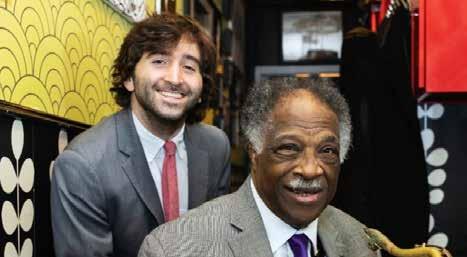
Compiled by AJT Staff
Pickleball Tournament Fundraiser set for April 16
Calling all pickleball players… on Sunday, April 16 Atlanta-based pediatric brain tumor research organization, Ian’s Friends Foundation, will be hosting their 2nd Annual IFF Pickleball Open at the Atlanta Pickleball Center on Sunday, April 16 from 1 p.m. to 5 p.m. Grab your paddles and mark your calendars for a fun day on the courts while raising funds for pediatric brain cancer research.

The Atlanta based organization, IFF was founded in 2006 by Phil and Cheryl Yagoda after their son, Ian, was diagnosed with an inoperable brain tumor at the age of two. They started IFF to fill the void of the lack of pediatric research available for their son and the approximately 28,000 children living with brain tumors – the number one cause of death by disease in children under 20 that receives less than 1 percent of funding from the National Institute of Health. The organization’s unwavering mission has always been to find a cure for pediatric brain tumors by funding groundbreaking therapies and research and supporting labs across the globe. This research can raise survival rates, improve patient care, and hopefully find a cure.
“We made it our mission to prioritize pediatric brain tumor research and help spread awareness of this disease,” said Phil Yagoda,
founder of Ian’s Friends Foundation. “For us, it is a labor of love and a mission that is close to our hearts. At the end of the day, the greatest gift you can give to a parent is the life of their child.”

Tickets to the annual charity tournament are available for purchase at http://bit. ly/3nqioXo
There are two options for ticket sales, you can purchase a spectator ticket for $35 or a team ticket for $100 (each team includes two tickets).
Compiled by AJT Staff
36 | MARCH 31, 2023 ATLANTA JEWISH TIMES BUSINESS
Joe Alterman and Houston Persons (front) are pictured during a performance at The Breman Jewish Hertiage Museum // Photo Credit: Bob Bahr leading tenor jazz saxophonists, 88-yearold Houston Persons. The concert earned both of them a lengthy standing ovation. Alterman is also executive director of Neranenah -- the Atlanta Jewish music festival.
Etz Chaim Launches ‘Art for a Mitzvah’ Project
Seder Elevates Women of the Haggadah
By Jan Jaben-Eilon
Three years after the Atlanta section of the National Council of Jewish Women held its annual community women’s seder on Zoom due to the pandemic, the group sold out its event on March 26 at Congregation Shearith Israel.
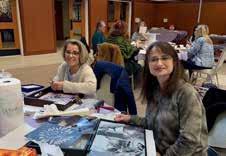
A waiting list was created after 90 people signed up for the seder that was also co-hosted by Ma’alot, a spiritual community led by Rabbi Ariel Root Wolpe.
According to Sara Duke, co-chair of the seder, the women’s seder was to include “a huge mix of women,” with many under age 40. While many of the women – some with teenage children – were members of Shearith Israel, the group also included NCJW members, Emory University professors and many from intown neighborhoods.
“I’ve been quite amazed myself,” said Duke, who is also on the board of NCJW. “At first we didn’t expect more than 60.”
According to Wolpe, she was asked to get involved in the annual women’s seder by NCJW president Sherry Frank. “She had seen me lead concerts and services at Congregation Or Hadash. They wanted to hold it at Shearith Israel, which doesn’t have any female clergy.”
By Fran M. Putney
In June 2022, Etz Chaim’s Rabbi Daniel Dorsch led a congregational trip to Israel. One of the visits in Jerusalem was to Yad LaKashish, a 63-year-old non-profit organization that engages more than 300 immigrant seniors to connect them into Israeli society through creative art projects. The finished artworks are sold and given to those who are in need.
Etz Chaim congregant Lynne Johannesen was particularly impressed with the program. Upon returning to Atlanta, she decided to start a congregational project based on the Yad LaKashish model called “Art for a Mitzvah.”
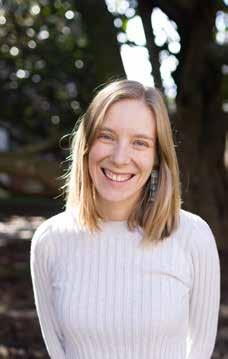

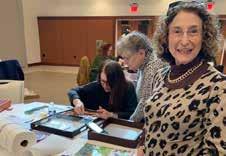
According to Johannesen, who sent a letter explaining the project to the Conservative, Marietta-based congregation: “The goal is to develop a self-sustaining program wherein all involved perform this mitzvah and, at the same time, feel happy, engaged, creative, self-satisfied, and involved with a sense of purpose and belonging.”
Sixteen women attended the launch
of “Art for a Mitzvah,” starting in midJanuary, participating for five Wednesdays at the shul. In all, they put in 240 hours and created 24 colorful, artful collaged wood trays. Many have sold, but the remaining works, which vary in size, are available for purchase ($54 each) on the Etz Chaim website at www.etzchaim. net/art-mitzvah.
Half of the proceeds will be donated to Yad LaKashish in Israel, while the remainder will go toward purchasing supplies for the next congregational project. The artists for the tray project were: Galina Barshay, Tammy Cohen, Janice Etscovitz, Lori Gilbert, Myra Goldberg, Lauren Gray, Bernice Isaac, Lynne Goldman Johannesen, Donna Krodman, Arlene La Vine, Fern Meharg, Roz Reiss, Miriam Rosenbaum, Bonnie Roth, Cindee Sapoznik, Marsha Shrago and Melissa Sklar.
The congregation will launch its second “Art For A Mitzvah” project starting at the end of April. It will be a woodworking project led by congregant Hank Needle, in which participants will craft Shabbat candle boxes.
Ma’alot is a two-year-old organization. According to its website, Ma’alot –which means “elevate” in Hebrew – is a “spiritual community that comes together to observe Shabbat and holidays, celebrate lifecycles, meetup for cultural and social gatherings, provide life-long education, and build spiritual relationships with one another and the Holy One.” It was launched by Wolpe and her husband, Jon Mitchell. Also a singer, Wolpe met her husband in a band and collaborated with him to record her second album.
The theme of this year’s women’s seder was Dayenu, which means “enough.” In the introduction to the Haggadah, which Wolpe adapted from last year’s Haggadah, she explains that Dayenu has two messages for women. As a statement, it means that women have accomplished a lot, and they should celebrate their efforts and successes.
The second message is “lo Dayenu,” it is “not enough,” and states the Haggadah introduction. “Not until society recognizes the full potential of each woman, not until our culture values her equally, not until the world protects women from violence and coercion instead of crush-
“As women we often feel we’re not doing enough. It’s the superwoman complex. But Dayenu, what you’ve done is enough,” said Rabbi Ariel Root Wolpe.
ing us underneath the power and egos of others, will it be enough,” she wrote.
Wolpe told AJT that she has been building on the message of Dayenu. “As women, we often feel we’re not doing enough. It’s the superwoman complex. But Dayenu, what you’ve done is enough.”
In contrast to previous community seders, Wolpe facilitated a process for each table to lead part of the seder, exploring the women who are important to the story in the Book of Exodus, but not named in the traditional Haggadah. Each table was to create a blessing or a prayer for each of the Passover story’s women, notably Miriam, Yocheved, Batya, Shifra and Puah.
According to Wolpe, Ma’alot’s approach is to “use the arts and improvised learning to make Judaism come alive.”
In the Passover story, Miriam is the sister of Moses and Aaron. Yocheved is their mother. Batya is Pharoah’s daughter who saved the baby Moses, and Shifra and Puah were the midwives who refused Pharoah’s orders to kill the firstborn son of every Hebrew family.
Each of the four cups of wine was dedicated, in the Dayenu Haggadah, to the women as well, who are referred to as “sheros.” NCJW celebrates a number of women, referred to as sheros, at their annual fundraiser.
ATLANTA JEWISH TIMES MARCH 31, 2023 | 37 BUSINESS
Volunteers at Etz Chaim are pictured creating collaged wood trays as a fundraising project called, “Art for a Mitzvah.”
Etz Chaim has started its “Art for a Mitzvah” project to raise funds for Yad LaKashish, a nonprofit organization in Israel.
Etz Chaim is selling collaged wood trays as a fundraiser to support Yad LaKashish, a nonprofit in Israel that integrates immigrant seniors into Israel society.
Sausage — er, Law — making, Part Two
Welcome to part two of how sausage — er, law — is made.
Part one (my last column) ended with the Georgia House approving legislation that would adopt the International Holocaust Remembrance Alliance definition of antisemitism as the state’s standard.
How will part two end? As I write this, on Tuesday, March 28, I don’t know.
By the end of Wednesday, March 29, the last — and most chaotic — day of the General Assembly session, we’ll know.
For this legislation to reach the desk of Republican Gov. Brian Kemp, the Senate and then the House must pass the bill — before the gavel comes down and “sine die” (Latin for “let’s get out of here”) is declared.
No matter how this ends, Jewish Atlanta’s major organizations will want to figure out how their top legislative priority reached such a precarious state. In the parlance of March Madness, the game plan went awry, the opponent proved more wily than anticipated, and unforced errors did not help.
The IHRA definition itself seems straightforward: “Antisemitism is a certain perception of Jews, which may be expressed as hatred toward Jews. Rhetorical and physical manifestations of antisemitism are directed toward Jewish or non-Jewish individuals and/or their property, toward Jewish community institutions and religious facilities.”
The 11 examples of antisemitism that come with it have proven more problematic. Those include accusing Jews outside of Israel of dual loyalty, comparing Israel to Nazis, calling Israel “racist,” “denying the Jewish people their right to self-determination,” and applying standards to Israel “not expected or demanded of any other democratic nation.”
Throughout its legislative journey, the bill’s opponents raised fears of the IHRA definition being “weaponized” to stifle free speech over Israeli treatment of the Palestinians, particularly on college and university campuses.
No matter how many times the bill’s supporters rebutted those claims — citing the bill’s language as evidence that there would be no free speech ramifications — some Republicans and Democrats on the key committees appeared unconvinced.
The vocal presence in hearings of Jews opposed to the IHRA definition may have sur-

prised legislators who presumed a monolithic Jewish stance on the issue. The opponents’ behind-the-scenes lobbying (particularly in the House) caught supporters off-guard.
The distribution of antisemitic flyers in heavily Jewish neighborhoods in Dunwoody and Sandy Springs in early February — including in Panitch’s driveway — was seen as a boon to chances of passage.
When the process started, the bill’s Jewish backers wanted Georgia to join the 30 states, 40 countries (including the U.S. government, per an executive order by thenPresident Donald Trump), and 1,100 non-governmental institutions that already adopted the IHRA definition of antisemitism — “the gold standard,” members of the House and Senate repeatedly were told.
The Jewish backers of House Bill 30 had wanted only a reference to the IHRA definition, to prevent any future legislature from changing its wording.
But when the bill was kicked back to the Judiciary Committee by the Rules Committee chair, the IHRA language was added. The 136 to 22 margin by which HB 30 passed the House belied what a co-sponsor, Jewish Democratic Rep. Esther Panitch, called its “tortuous” path.

[Definition of an unforced error: The bill’s chief sponsor, Republican Rep. John Carson, a Baptist from Marietta, publicly calling opponents “a loud group of ‘quote-unquote Jews,’ that are opposing this because they support Palestine and do not support Israel and the Jewish people.”]
HB 30 “crossed over” to the Senate — where things really got weird.
The bill appeared to die when it was “tabled” unanimously by the Senate Judiciary Committee. But, to borrow from Monty Python, the parrot was not dead, just resting. The parrot — er, legislation — became what the denizens of the Gold Dome call a “zombie bill.”
The bill was resurrected in the Senate Children and Families Committee, at the expense of House Bill 144, a measure already on the committee’s agenda, dealing with children under the state’s care. The original language of HB 144 was replaced with an amended version of HB 30.
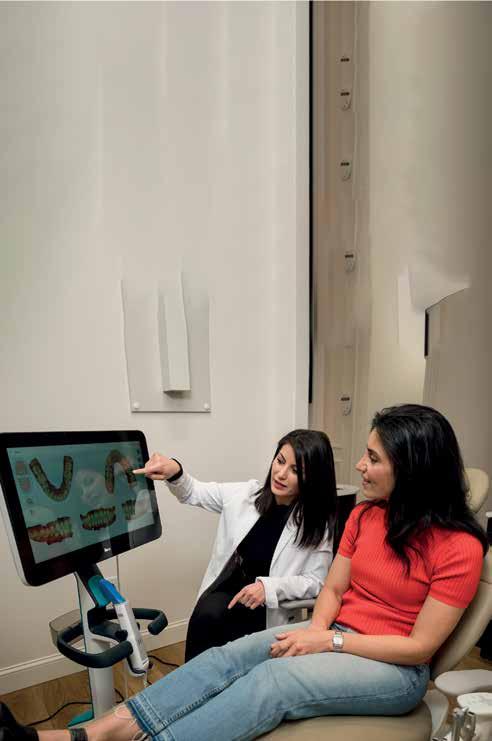
Now you had a Senate bill that only referred to the IHRA definition, but also the House-passed version with the definition language.
So, on the last day of the 40-day legislative session, would the Senate approve its version and would the House accept that?
Beats me. This may be a “zombie column” that comes back to life with an update. ì

38 | MARCH 31, 2023 ATLANTA JEWISH TIMES OPINION
Serving Alpharetta, Johns Creek, Roswell, Dunwoody and Sandy Springs Dr. Shima Shahrokhi Dentistry You Can Trust. Taking care of you like we take care of our own family Limited Time Only: $149 New Patient Exam and Cleaning. 8465 Holcomb Bridge Road, Suite 650 Johns Creek, GA 30022 (404) 809-4400 rivermontdental www.rivermontdental.com smile@rivermontdental.com Scan the QR code to learn more or book an appointment!
Dave Schechter
OPINION
Rabbi Arnold Goodman (z”l)
When I think about Rabbi Arnold Goodman, of blessed memory, I almost invariably first remember my pre-bar mitzvah experience with him. In those days, at the Adath Jeshurun in Minneapolis, bar and bat mitzvah celebrants did not offer a D’var Torah on the weekly Torah Portion or Haftara. Instead, we wrote original prayers we offered at the end of the Torah service as the Torah Scroll was returned to the Ark.
munity. Now, I saw a Rabbi Goodman who cared deeply about the well-being of our (and his) congregation long after he had ceded spiritual leadership of it. Now, I saw a Rabbi Goodman who was always striving – to learn more, to teach more, and to stimulate others’ thinking and actions.
Rabbi Neil Sandler Guest Contributor


Prior to my bar mitzvah, I wrote my draft prayer and sent it to Rabbi Goodman for his review. On the appointed day, my father and I went to the Adath office to pick up my final draft, as “edited” by Rabbi Goodman. This was the moment when I discovered that Rabbi Goodman was a magician! I hardly recognized a word in my prayer! Presto chango! It was all so different from what I had written! Today, more than 50 years after my bar mitzvah, I can remember only one phrase in that prayer, “As I don this tallit…”
I remember turning to dad after reading that phrase and asking, “Who is ‘don’ and what is he doing in my bar mitzvah prayer?”
That was hardly the only magic that Rabbi Goodman performed over the course of his long and distinguished career in the rabbinate. If “magic” can loosely be thought of as envisioning and creating what might seem unimaginable, Rabbi Goodman truly was a magician. More accurately, he was a visionary and a model to learn from and emulate, especially for rabbis who served Conservative congregations.
In Minneapolis, and then here at Ahavath Achim, Rabbi Goodman brought a vision and plan to implement full egalitarian participation in worship. In 1975, the Adath Jeshurun, under Rabbi Goodman’s leadership, built the Kallah Center in a rural Minneapolis suburb. The concept, creating Jewish immersion experiences outside of summer camps, was still novel at the time. It was also very effective.
And then there was that Rosh Hashana sermon later that year. As a teenager, I didn’t really pay much attention to sermons (I was repaid for that cavalier attitude about sermons many times throughout my career). In 1975, at age 19,
and spending my last High Holidays in Minneapolis, I listened to Rabbi Goodman speak. He yelled in anger. He prodded and, most importantly, he pushed people to act. Everyone was frozen in their chairs, mesmerized by what they were witnessing. What they were witnessing was the unveiling of a vision for the “Chevra K’vod HaMet,” an expression of a congregation’s loving care for a deceased individual and his/her loved ones that supplemented the Chevra Kaddisha’s preparation of the body for burial. My parents, of blessed memory, insisted that the Chevra K’vod Hamet provide its services at the time of their deaths. Without Rabbi Goodman, this choice likely would not have been available.
I was a “shul kid.” My family was a “shul family.” I remember formal Shabbat dinners and the delicious food at the Goodman’s home. I remember singing Shabbat songs around the table…and to hearing my rabbi who didn’t have the best voice. I remember watching Daniel (aka, Dr. Goodman) run around shul and sometimes get in trouble as I stood back to assure that I would not get caught up in this behavior “unbefitting the shul.” The Goodmans and others at the Adath created a supportive environment that enabled eventual rabbis, future Jewish professionals, and good, committed, and caring Jews to take root and then, “fly” on their own.
Here is a personal piece of Rabbi Goodman’s “magic”…convincing me to go to rabbinical school. In December 1977, I visited with Rabbi Goodman back in Minneapolis after having begun non-rabbinical school studies at the Jewish Theological Seminary. I was planning to spend one year at the seminary and then move on to a graduate program elsewhere. Rabbi Goodman explained why he thought I should go to rabbinical school. His advice was sound and helpful…and now, more than 40 years later, I can reflect on a fulfilling career in the pulpit rabbinate.
When I succeeded Rabbi Goodman at Ahavath Achim, we developed a renewed relationship that brought each of us deep satisfaction. Although I had been a colleague of Rabbi Goodman for more years than I had been his congregant, prior to my coming to AA, our relationship was that of a rabbi-former congregant. Now, the relationship grew in depth, caring and, yes, love. Rabbi Goodman would often call me to wish me well as Susan and I celebrated simchas over the years. Sometimes, he would call just to check in with me.
Whenever Rabbi Goodman came to Atlanta for his scholar–in-residence weekends (Shabbat learning experiences that often left me speechless as I watched him share with the congregation), he and I would sit for an hour or more to talk. He always asked about my family members – here and back in Minneapolis. Rabbi Goodman would always fill me in on his ever-expanding family. Then we would really talk. Our conversations were no longer the kind that rabbis and former congregants share. Now, the conversations were between rabbis who shared a love for the same congregation and com-
Rabbi Arnold Goodman, of blessed memory, was a wonder. His service to the Holy One, Israel, and the Jewish people brought continuing blessings and benefit to many people throughout his entire life.
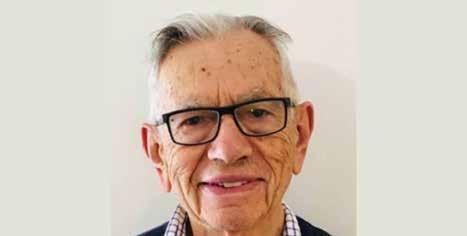
A final word on the relationship Rabbi Goodman and I shared. I was named Senior Rabbi of Ahavath Achim Synagogue 20 years ago. Shortly thereafter, I attended the Rabbinical Assembly Convention in Israel. When I saw Rabbi Goodman, we embraced. Then, we sat down. I told Rabbi Goodman that, irrespective of my advancing age, I would never call him “Arnold.” To me, he would always be “Rabbi Goodman.” And so, it was for 20 more years.
Rabbi Arnold Goodman, of blessed memory, was a wise advisor to me. He was my mentor. He was my friend. I have always appreciated it when someone introduces me to someone I don’t know and says, “This is my rabbi.” I feel the warmth, respect, and pride in that statement.
In that spirit, I conclude with heartfelt words, “Rabbi Arnold Goodman is my rabbi.” He will always remain my rabbi. May our memories of the wisdom he shared with us, along with his kind and caring acts, comfort us now and serve as a lasting tribute that will continue to resonate throughout our world. ì
ATLANTA JEWISH TIMES MARCH 31, 2023 | 39
Neil Sandler is the Rabbi Emeritus at Ahavath Achim Synagogue.
Hearing Fiasco Proves Need for Antisemitism Definition
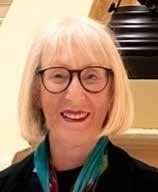
The AntiDefamation League just published a report showing that in 2022 the number of antisemitic incidents reported reached an all-time high of nearly 3,700. In Georgia alone, there were 80 separate recorded incidents. Right now, there is a glaring loophole in 2020’s hate crimes legislation (HB426) that makes it near impossible to address antisemitic hate crimes in Georgia. Why? Because we cannot begin to address and combat antisemitism without a uniform definition of what it is.
We must pass HB144 to adopt the International Holocaust Remembrance Alliance’s (IHRA) definition of antisemitism now – to protect our children, grandchildren, and loved ones from burgeoning antisemitism threatening our community’s safety.
The IHRA definition of antisemitism, developed through community and expert
input, is widely recognized as an essential tool in naming and fighting Jew hatred. It has been adopted by more than 1,000 global entities, including the European Commission Against Racism and Intolerance and the United States Department of State, 40 countries and 30 U.S. states.
Georgia’s Senate has an opportunity right now to pass this critical bill that clarifies antisemitism for everyone in the state. Further, with a clear definition in place, violent crimes like assault and murder targeting Jews because of their faith will be named for what they are – hate crimes.
At a recent legislative hearing considering this bill, a young man told a shocking story of his experience of harassment at school with swastikas and hate symbols against Jewish people. His school did nothing to stand up to hate. Administrators claimed the swastika was a peace symbol and did not classify these acts as religious discrimination or hate, and they did not take action. If we adopt the IHRA definition of antisemitism – it will be clear moving forward that tormenting Jewish students with swastikas is a plain and hateful act of antisemitism.
Yet, last week, the Senate stalled action
as one lawmaker proposed to rewrite the definition of antisemitism – watering down the internationally accepted definition to render it incomplete and ineffective. Personally, it was devastating to watch someone attempt to define away acts of hatred that can have dangerous, deadly impact on Jewish people.
The fact that this hearing could go off track so quickly and the presumption that one individual could re-define what antisemitism is without consulting the presenting sponsors of the bill only underscore why we urgently need a clear and accepted definition of antisemitism in place.
With so many other government bodies, organizations and groups adopting the IHRA definition of antisemitism, it’s critical that Georgia does the same. Our state cannot be the only outlier that leaves the Jewish community vulnerable to antisemitism, and we cannot bend the definition of antisemitism to make people more comfortable being antisemitic.
And let’s be clear – adopting the IHRA definition, while it will make prosecuting hate crimes against the Jewish community easier, ultimately does not mean that any-

thing considered antisemitic is in and of itself a hate crime. Hate crimes relate to specific acts targeting groups of people – and we cannot confuse the two.
The definition simply provides parameters and useful examples to help identify hate against Jewish people, including modern iterations of antisemitism that are frequently masked as denying the Jewish people the right to self-determination.
Thankfully, a bill adopting IHRA definition of antisemitism in Georgia is now moving forward in the Senate as HB 144. As antisemitism rises not only in Georgia but nationwide, our legislators – many of whom claim to be allies and have large Jewish constituencies – must stand with our community. We can’t let another year pass without this simple act to safeguard Georgia’s Jewish population of over 140,000.
Adopting the IHRA definition of antisemitism without further delay and without misguided attempts to change the definition of antisemitism is urgent for our safety and our wellbeing.
40 | MARCH 31, 2023 ATLANTA JEWISH TIMES OPINION
Simone Wilker is a Hadassah Greater Atlanta member. ì
Simone Wilker Guest Contributor
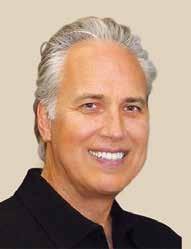



ATLANTA JEWISH TIMES MARCH 31, 2023 | 41 Happy Passover! Thank You combining technology and artistry to create exceptional dentistry. As a comprehensive dental office that goes above and beyond our specialty in Cosmetic Dentistry, our patients believe Dr. David Mastro is the right choice for all your family dentistry needs! When it comes to your smile and oral health, Dr. Mastro has a proven 30 year track record of providing quality cosmetic and family dental care for families in our local community and around the world. FOR VOTING US BEST DENTIST! Implants and same-day, multiple unit crowns, veneers and bridges are available! All are personally fabricated by Dr. Mastro SEE MORE OF DR. MASTRO’S MAKEOVERS AT www.AlluringCosmeticDentistry.com Single appointment porcelain crowns and veneers available! 770-642-9900 | 800 Mansell Road | Roswell, GA Call today to schedule an appointment! Dr.
David Mastro
Antisemitism and HB30
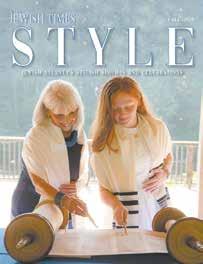
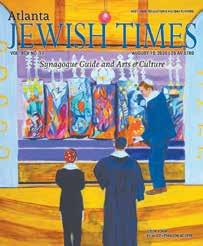
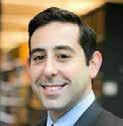
On Sunday Feb 26, a group of rabid antisemites once again littered several predominantly Jewish communities around the greater Atlanta area with vile antisemitic literature that demonized Jews, Judaism, and Jewish culture.

Let us assume for a moment that the type of vile language they employed in those flyers is not incitement, and that the people who distributed them in the dead of night did not violate any trespass laws by putting them on private property. Let us assume that what they did is simply protected free speech, as they preemptively claimed. That does not mean that we should not speak out collectively against it, and label it correctly, as antisemitic.
Hate speech is protected, but that doesn’t mean we shouldn’t call it hateful. It is important that we do so because right now, there is no accepted definition of antisemitism in Georgia, and according to a recent survey, roughly half of all Americans claim that they do not know what antisemitism is. Practically speaking, what this lacuna means is that if the very people distributing antisemitic literature today under their free speech rights, were then to target and commit a hate crime against a Jewish child tomorrow, they would be able to say - with a straight face - that their actions were not motivated by antisemitism, but rather, for example, by their anti-Zionist political leanings. (This is a group that is also famous for blaming Israel for all the world’s problems.)
That is why there is currently legislation pending in Georgia, HB30 (sponsored by Rep. John Carson and Esther Panitch, the only Jewish legislator in the entire Georgia General Assembly, among others,) to provide a definition of antisemitism for authorities to use when they are assessing the intent behind unlawful hate crimes and discrimination. It is crucial that everyone know what is and is not antisemitic because study after study has shown that the kind of inflammatory discriminatory antisemitic and anti-Zionist rhetoric that this group and others like them are known for, quickly leads to violence against innocent Jewish people.
When a person attacks a Chinese American because they hate China, every-
one understands that this is race/ethnicity-based discrimination. When a person attacks a Jewish American because they hate Israel, all too often people say that it might just be ‘political’ and not anti-Jewish. This bill gives authorities a standard to use as contextual rebuttable evidence of intent for unlawful conduct. Note that opponents of the bill are NOT asking for the ability to continue criticizing Israel - this bill has nothing to do with speech and they have every right to say what they want. They are asking for the ability to continue attacking Jews because of their hatred and get away with it. As it stands, there is no definition in the law for a prosecutor to be able to point to and say that “No, targeting an innocent Jewish person because you think Israel did 9/11 is antisemitic, and that was a hate crime.”
Does that example sound farfetched?
In 2017, a German court decided that the firebombing of a synagogue in Wuppertal was not antisemitic, because the criminals claimed that it was just the way they chose to express their anti-Israel politics. Do you think it couldn’t happen here? Last week, lawmakers heard testimony from students in the Georgia public school system who were terrorized with swastikas and death threats while the school administrators wrung their hands and said they weren’t sure if it was antisemitism. They also heard about an innocent girl at Georgia university who was viciously harassed because she dared to go on a Birthright trip.

To be clear - this bill would not affect an antisemite’s ability to spread their hateful message, because HB30 is not about banning or limiting speech. It is only about helping to stop unlawful discriminatory conduct. But incidents like what happened this weekend do absolutely make it clear why this bill is obviously necessary - because there are clearly hateful bigots out there who are not shy about their intentions. HB30 lets them speak, but it holds them accountable if they should then act on their antisemitic motivations.
There is wide bipartisan support on this bill, and the major Jewish organizations representing the vast majority of Jewish Atlanta have already testified in support of it. I hope that we can all get behind it, and protect the members of the Jewish community, who need this protection.
42 | MARCH 31, 2023 ATLANTA JEWISH TIMES OPINION
Dr. Mark Goldfeder, Esq. is director of the National Jewish Advocacy Center and Counsel for Hillels of Georgia.
Subscribe! Subscribe to home delivery of the Atlanta Jewish Times. You will love knowing what’s going on in the community and beyond! ONLY $65 per Year Subscribe at www.atlantajewishtimes.com/ subscribe-to-home-delivery
Dr. Mark Goldfeder, Esq. Guest Contributor
Letters to the Editor
The AJT welcomes your letters. If you would like your letter to be published, please write 200 words or less, include your name, phone number and email, and send it to editor@atljewishtimes.com.
Letter to the editor,
A Great Friend of the Jewish Community.
About six months ago, in a conversation with Sandy Springs Mayor Rusty Paul, he asked me if I knew John Carson, a (R) GA State Representative from West Cobb. I did not. He proceeded to inform me that John was the GA legislator who sponsored and got support to get HB 426, the Hate Crimes Bill and SB327, the Anti-BDS bill passed in the Georgia House. Mayor Paul told me that John Carson carried the water for the Jewish community and that nobody in our community had thanked him.
I reached out to John and proceeded to invite him to events, introduce him to other prominent Atlanta Jews and helped him raise funds for his November reelection campaign.
Most recently, he cosponsored, with (D) GA State Representative Esther Panitch, HB30, the antisemitism bill, which passed last week through their efforts. When I called Esther to thank her for her efforts, she told me that John was the one who really made it happen. As a Christian, with very few Jews in his district, John Carson did it, not to get votes, but for the right reasons. Esther recommended we do something special for John as recognition and as a thank you. All Atlanta Jews should know what a friend John Carson is of the Jews and how our GA Christian legislature (Esther is the only GA Jewish House or Senate member) supports us.
Atlanta Jewish Times apparently has mentioned John Carson in previous articles, but I doubt that the Atlanta Jewish community is aware of all he’s done for us.
I hope others in our community will spread the word and reach out to Representative Carson and thank him for his efforts.
Chuck Berk, Atlanta, Board Chairman GA Commission on the Holocaust
Letter to the editor,
Georgia legal community mourns loss of former Rep. Elliott Levitas.
The State Bar of Georgia extends condolences to the family, colleagues and many friends of former U.S. Rep. Elliott H. Levitas, retired from Kilpatrick Townsend & Stockton LLP in Atlanta, on his passing at the age of 91.
A member of the Georgia Bar since 1955, Rep. Levitas was Georgia’s first Jewish congressman and was known for standing up against racism and for environmental protection. He served 10 years in the Georgia General Assembly, where he became a leading proponent for the development of MARTA, before his election to the U.S. House of Representatives from the 4th Congressional District in 1974.
As an attorney, he helped lead a landmark class-action lawsuit on behalf of 300,000 Native Americans against the federal government in connection with the lands and billions of dollars of Indian trust funds held by the U.S. since the 1880s. In Congress, he chaired a subcommittee investigating the Reagan administration’s efforts to undermine the mission of the Environmental Protection Agency, which led to the firing of dozens of senior officials.
Rep. Levitas also served his country in the Air Force’s Strategic Air Command and as a captain in the Air Force Reserve and was a past chair of the Anti-Defamation League’s Southeast Region Civil Rights Commission. Among other honors, he received the Thomas B. Murphy Lifetime Achievement Award from the Democratic Party of Georgia, the Emory Alumni Association’s Emory Medal, and a Lifetime Achievement Award from the Daily Report.
Rep. Elliott Levitas’ career in law and public service is an inspiration to all Georgia lawyers. We appreciate and will remember his many contributions to the cause of justice in our state.
Sarah B. Akins, President, State Bar of Georgia
Disclamer to our readers:
This section of the newspaper is a forum for our community to share thoughts, concerns and opinions as open letters to the community or directly to the newspaper.
As a letter to the editor, we proof for spelling and grammatical errors only. We do not edit nor vet the information the letter contains. The individual signing the letter is accountable for what they share.
Letter to the editor,
Pesach and My Son
This past week, I forgot to pack my son’s lunch and when I got the call from the school about it, I panicked and crushed. It meant my son experienced a sad moment. Despite hearing that the school would work it out, I contacted everyone I knew to see if they could drop something off. In the end, it resolved. The love we have for our children has no bounds and we would do anything for them to be content and happy. It wasn’t lost on me that I forgot to bring my lunch to work that day as well. We are interlinked to our children in powerful ways. Passing on the Pesach tradition to our children is affirming that we want them to be part of our foundations of faith.
Steven Genack, Cliffton NJ
Letter to the editor,
Regarding: February 15, 2023, issue
Could the G-d in the Hebrew Bible (Torah) be antisemitic???
According to the International Holocaust Remembrance Alliance (IHRA), one example of antisemitism is “applying standards to Israel ‘not expected or demanded of any other democratic nation.’”
That is exactly what G-d did when G-d told Moses to instruct the people, “You shall not taunt or oppress a stranger, for you were strangers in the land of Egypt. You shall not cause pain to any widow or orphan.” [Exodus/Shmot 22:20-21] This is clearly an expectation not demanded of any other nation. The text continues to delineate the dire penalty for this behavior on the part of the Israelites eminently clear. “If you dare to cause him pain! For he will cry out to Me, I shall surely hear his outcry. My wrath shall blaze, and I shall kill you by the sword, and your wives will be widows and your children orphans.” [Exodus 22:22-23]
Every Prophet of the Tanak held Israel to a higher standard than any other nation.
Being held to a higher standard is the essence of being a holy nation, and am kadosh, a nation of Priests, and a light unto the other nations.
Julian Yudelson, Atlanta
Letter to the editor,
I’m writing in the hopes of putting Reuben Haller’s fears to rest in the Feb 15, 2023, issue.
There have been multiple, large rallies against the proposed judicial reforms outside the Knesset there, resulting in no arrests, no protestors attacking the police or being attacked by the police, no vandalism. Democracy remains strong in Israel.
As evidenced by recent history (five national elections in the past three years), Israelis have a wide range of opinions on matters of governance. During the last three decades, the Supreme Court has tacked more to the left while a surge in terrorist attacks has moved many Israeli voters toward the right, seeking a government that would fight more effectively against those trying to destroy the nation-state of the Jews. Israelis supporting judicial reform oppose unelected judges having the ability to overrule the voice of the people as expressed by elected Members of the Knesset. Those against the proposed judicial reforms think Prime Minister Netanyahu is simply trying to avoid being found guilty of the charges that have been brought against him. The fact that his trial has dragged on for three years lends support to the views of American attorney and former federal prosecutor Arthur Fergensen, who called the 93-page, 330-witness indictment against Netanyahu a clear case of the judiciary attempting to criminalize politics and prevent the government from functioning.
Toby Block, Atlanta
ATLANTA JEWISH TIMES MARCH 31, 2023 | 43 OPINION
Hunger Seder Spotlights Food Insecurity
This year’s Interfaith Hunger Seder, scheduled during the intermediate day of Passover on April 10, comes at a critical time for food programs. The event, which has been held annually for the last 12 years, is a project of Atlanta Jewish Community Relations Council to raise awareness about the issues of hunger, both in America and in the local community. The fundraising goal for the Passover program is $10,000.
Bob Bahr
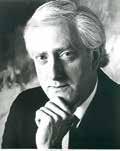
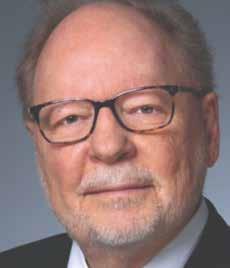
Among the 20 co-sponsors of the program are four local synagogues, the Northside United Methodist Church, the Ahmadiyya Muslim community, and the Interfaith Atlanta organization. The president of the Community Relations Council, Harold Kirtz, says the group takes literally the injunction from the Mishnah of Pesachim, which is found in the traditional Hagaddah,

“ha lachma anyah,” or, “all who are hungry come and eat.”
“It’s a very serious issue. Food insecurity affects one in nine people in Georgia,” Kirtz says. “We try to create advocacy opportunities to improve the food security situation and we always advocate for ensuring that the food stamp program, now called

SNAP, is funded as much as possible.”
SNAP, which stands for the Supplemental Nutrition Assistance Program, serves those with low income and is administered by the federal Department of Agriculture. There are more than 41 million Americans receiving SNAP benefits. In Georgia, that includes over 1.6 million
Happy Passover!
residents, or 15 percent of the state’s total population. But, with the end of a program begun three years ago at the start of the COVID pandemic, food benefits have dropped precipitously. Georgia ended the extra food help in May 2022, but it ended everywhere in America this month.
The average household that receives
44 | MARCH 31, 2023 ATLANTA JEWISH TIMES
The SNAP food assistance program, which costs several hundred million dollars, is up for renewal later this year
PASSOVER
Harold Kirtz is president of the Atlanta’s Jewish Community Relations Council.
around $200 in SNAP benefits lost the extra $95 in pandemic-related help. Some older recipients have seen the steepest decline. There, according to the Center on Budget and Policy Priorities, food help has decreased from $280 a month to $23 every 30 days. The sudden end to extra benefits, this March, combined with a sharp rise in food prices and other inflationary increases, has meant tougher times for many food aid recipients. It’s led to what Ellen Vollinger, who helps direct the non-profit Food Research and Action Center, calls a “hunger cliff.”
“The cliff is aptly named because this is a very abrupt change in what people are going to have in their food budget and, nationally, it’s affecting tens of millions of people.”
Among the 16 partner organizations that are participating in the Hunger Seder is Atlanta’s Jewish Family & Career Services, which maintains a food pantry as well as the only kosher food bank in the Southeast. During the pandemic, the social service agency ramped up emergency financial assistance for many of the necessities of life, including hundreds of thousands of pounds of food.
While many areas of the services JF&CS has offered have been done virtually, food, according to their director of develop-

ment, Jessica Yonatan, has been a very personal program.
“Our food pantry has just grown tremendously, and food is not virtual. That was all in person. We had…donors dropping off food to donate to the food pantry. We had volunteers shopping for us. We had volunteers dropping food off at people’s homes so they could eat and not worry about where their next meal was.”
Yet another important partner in the Hunger Seder is the Atlanta Community Food Bank, which has seen strong and steady growth over the last decade. Last year, it distributed what it described as 79.3 million meals and grocery products through a network of nearly 700 community-based partner organizations.
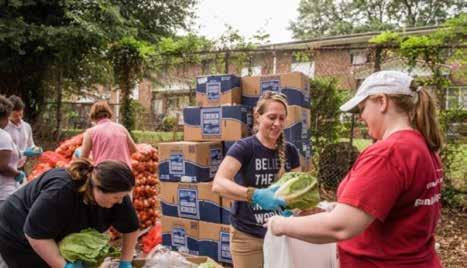
For over 30 years, the Food Bank has collected non-perishable foods from synagogues and temples during the High Holidays. It’s estimated that the effort has raised well over a million pounds of food for the charity.
This year’s Hunger Seder is being held at the Jewish Federation of Greater Atlanta auditorium with Rabbi Larry Sernovitz of Temple Kol Emeth as the host. Registration for the Interfaith Hunger Seder is at www. atlantajcrc.org. ì


ATLANTA JEWISH TIMES MARCH 31, 2023 | 45 PASSOVER HAPPY PASSOVER The real estate market in Atlanta remains STRONG. Strategic positioning and experience wins time after time. WE GO WHERE YOU ARE. Leigh + Michael Schiff direct 770.821.1354 • office 404.237.5000 leighschiff@atlantafinehomes.com • michaelschiff@atlantafinehomes.com SCHIFFREALESTATETEAM.COM see your home’s current value here! We wish all of our clients, friends and family Chag Sameach! WHO YOU WORK WITH MATTERS NOW MORE THAN EVER.
The Atlanta Community Food Bank and the Food Pantry at Jewish Family & Career Services has seen a strong demand for food assistance
The Hunger Seder, which is celebrating its 13th year, is an interfaith initiative.
AJC Unity Seder Seeks to Strengthen Entire Community
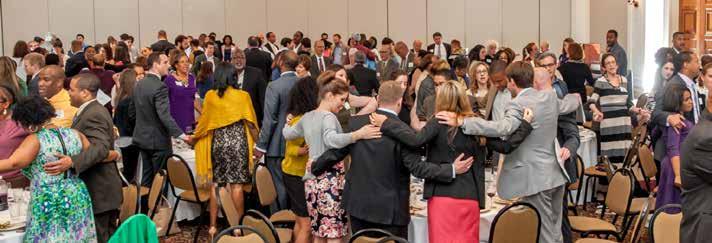
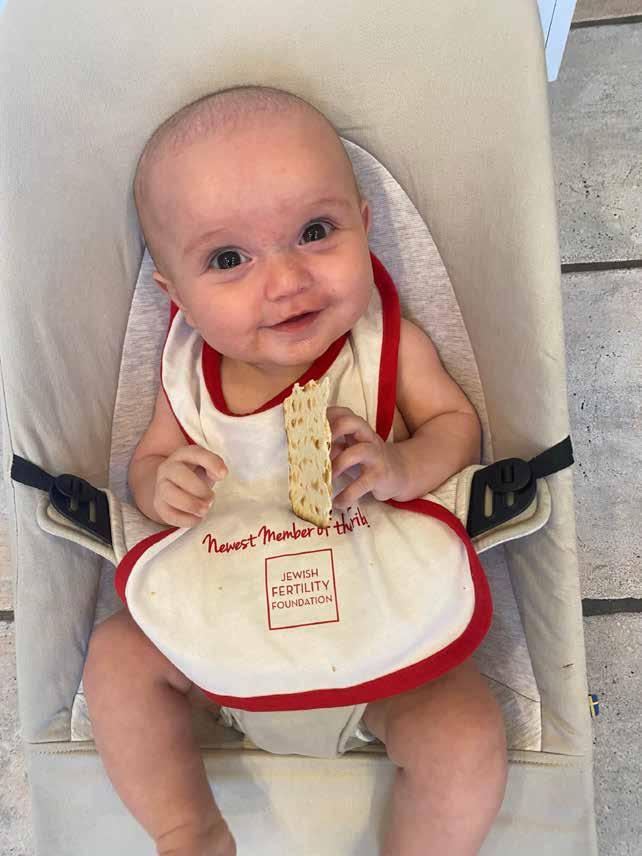
 By Bob Bahr
By Bob Bahr
The American Jewish Committee’s Unity Seder, which is one of the major outreach efforts by the AJC to build a broad base of support in the community, was held Wednesday, March 29. For the first time, the event was held in two locations simultaneously. The larger gathering, in The Temple’s Social Hall, attracted about 350 and was led by Rabbi Loren Filson Lapidus, the synagogue’s senior associate rabbi. In a significant demonstration of The Temple’s newly expanded communications technology base, the gathering was linked virtually to Kol Emeth 18 miles away in Cobb County. At that location, Rabbi Larry Sernovitz hosted the evening.
According to Julie Katz, the AJC’s associate director, the expansion was an attempt to bring people in from distant locations without having to contend with a long drive during the weeknight rush hour. The program, which used a Haggadah created by the national office of the AJC, included a diverse audience of faith leaders that represented communities, ranging
from Mormons to Muslims. This included the Rev. Shawn Smith, pastor of New Horizons Baptist Church, who is also a senior advisor to Atlanta Mayor Andre Dickens, the Rev. Jasmine Rose Smothers, pastor of the First United Methodist Church, and the Rev. Kevin Strickland, who is the Bishop for the Southeastern Synod of the Evangelical Lutheran Church.
The co-chair of the event was Missy
Wallers, who is an active member of the Victory World Church, a non-denominational Christian congregation in Norcross. Her father, a Baptist church leader, was active in interfaith civil rights work during the early 1960s. She credits him with introducing her at an early age to the importance of working together in the community.
“I’m all for inclusivity and diversity.
We live in Atlanta, and the two communities working together has been such a phenomenal blessing to my life.”
Wallers has long been active in the AJC’s Black-Jewish Coalition and the Coalition’s Project Understanding. She has also been a member of an interfaith team, Challa’d Greens, that placed third in the Ribs category at last year’s Atlanta Kosher BBQ Festival competition. Wallers was part

PASSOVER Let us help you Make Miracles this Passover Apply for a Jewish Fertility Foundation Fertility Grant TODAY! @jewishfertilityfoundation www.jewishfertilityfoundation.org
The AJC’s Black-Jewish Coalition and its Project Understanding were the inspiration for the Unity Seder project.
of the decision in recent years to transform the Unity Seder from a bi-racial event to a multi-faith, multi-ethnic program.
“We thought, well, what a grand idea would that be, to have it become interfaith. So could you bring people from the community in to talk about this, this great moment in recognizing our sisters and brothers and sharing our own stories of how we can come together to acknowledge the history we share. And to acknowledge, as well, those three things that are such an important mess this time of year, love, freedom, and responsibility for all.”
Also chairing the event is Linda Davis, who has been the vice president of interfaith relations of the Atlanta AJC. She believes that by creating stronger relationships it strengthens everyone.
“When we create relationships that are good for us as a Jewish community, they’re good for other communities as well. So, it makes us better. It makes them better, too. And we’re all much better when we work together.”

The Unity Seder comes just a week after the ADL released its annual survey on antisemitic incidents. The survey reported that incidents jumped 63 percent in Georgia in the last year from 49 in 2021 to 80 in 2022. Nationally, the report counted almost 3,700 incidents, the highest number since the report was initiated in 1979.

Last month. the national office of the American Jewish Committee released another study on antisemitism in America. It

shows that more than 40 percent of those surveyed in the American Jewish community feel less secure in America. That is a full 10 percentage points more than just a year before. The reason, in large part, according to the survey, is the rise in antisemitic attacks, crimes and violence. There is also the belief that the rise in antisemitism and racism is now more socially and politically acceptable.
On March 24, a bi-partisan group of 83 members of the U.S. House of Representatives urged the House Appropriations Committee to increase funding for the State Department’s Office to Combat AntiSemitism. It asked that the Office, which is staffed by Ambassador Deborah Lipstadt, who is on leave from Emory University, receive an extra $500,000 over the budget proposal of $1.7 million made by the Biden administration. It also calls for new measures to ensure that the office’s work continues through future administrations.
The letter argues that further resources would allow for “further specialization… to address the serious and ongoing challenges that exist around the globe.”
The letter had the support of the AJC, Jewish Federations of North America, and Anti-Defamation League. Adam Teitelbaum, the associate vice president of public affairs for the Federations, told the JTA website that, given the linkages between foreign and domestic antisemitism, the Federation organization feels the issue has a “direct impact” on communities within the U.S. ì
ATLANTA JEWISH TIMES MARCH 31, 2023 | 47 PASSOVER
In February, 2023 an AJC survey reported that 40 percent of American Jews thought that antisemitism was worse than the year before.
Supporting older adults and caregivers as they navigate aging • Social events & recreational activities • Residential communities • Counseling & family support • At-home care services Learn about all of the resources you can access: agewellatl.org | info@agewellatl.org 1.866.AGEWELL | 1.866.243.9355 Join us for AGEWELL ATLANTA SENIOR DAY at the MJCCA on April 17 Register at agewellatl.org/seniorday Founding Partners: HAPPY PASSOVER from your friends at AgeWell
This year’s AJC Unity Seder was held at two locations that were virtually linked.
Bukharen Passover is a Celebration Fit for Kings

 By Bob Bahr
By Bob Bahr
For Bukharen Jews in the Central Asian nation of Tajikistan, the Passover seder’s major theme of freedom after 400 years of oppression is not an abstraction. They, too, suffered more than four centuries of hardship that included social and political ostracism by fundamentalist Muslims in the 16th century and the antisemitic campaigns by successive governments of the Soviet Union in the 20th century.
Most Jews of Central Asia left as soon as they could, beginning in the early 1970s when Jewish immigration restrictions were relaxed. Many went to Israel, where today an estimated 150,000 Bukharen Jews live, and the United States, and where another 75,000 have found homes. They live mostly in the Forest Hills section of Queens in New York City or in the Rego Park neighborhood. The community is often called “Regostan” by their New York neighbors.
They’ve also settled in Atlanta, where nearly eight years ago they opened a synagogue, Congregation Beit Yitzhak,











in Norcross. It has an impressive interior created by a team of Central Asian craftsmen who labored for months to design
the elaborate wood carving and decorative accents that distinguish the worship center.
Rabbi Yisrael Zelman has served as an interim rabbi for the community. Although he is not native to Tajikistan, each year he holds a seder where all are invited, both his Ashkenazic friends with gefilte fish as starters, and his Bukharen congregants with their fried fish showered with chopped parsley. The Bukharens have their Oshi Masozgoshak, or vegetable beef soup, with dried Persian sour plums, sorrel leaves and beaten eggs served over cracked matzos in place of matzo ball in chicken broth.
And because the community observes the exception to Jewish law that allows Sephardic and Mizrachi Jews to eat rice and beans, there are always bounteous plates of plov, a pilaf of rice, carrots and chickpeas that is often scented with the favored spices of cumin and paprika. Unlike the charoses most American Jews make, with a rough texture of chopped apples and nuts, the Bukharen version, called “chalika” is more like a smooth sweet paste.
According to Rabbi Zelman the Bukharen approach to the holiday is one of joyous and youthful enthusiasm, without regard to age for physical limitations. It is a customary celebration fit for royalty.




“They say in their Passover Haggadah that they are young people until the end of their lives,” according to Rabbi Zelman, “without any weaknesses of old age.
They are not poor, but rich. And they feel special, as if they are kings for this one night of Passover.”
Instead of the classic Passover Hebrew melody, Ehad Mi Yodea, or “Who Knows One,” they sing in the Judeo-Tadjik dialect, Yakumin Ki Medonad that honors the spiritual freedom granted by G-d.

The men who are grouped around the table are seated according to age, the oldest sit closer to the host and all of them wear the traditional jomah, or ceremonial jacket or robe. Rabbi Zelman, who was born in Moscow and earned his ordination in Jerusalem, was presented his joma to honor his service to the community.


The design is usually in a rich color and fabric, accented by intricate designs of gold braid. Some may have six-pointed Jewish stars or multi-branched menorahs woven into the pattern. All males wear the decorative Bukharian skull caps, often made of silk, with floral embroidery.
Again, it’s from a time that recalls how Jews, under Muslim rule, were forced to wear a yellow hat or a Star of David to distinguish them as second-class citizens. Their medieval fundamentalist rulers required tax collectors, by law, to slap the face of Jews who were paying the special tax that was collected from them each year. Jews used their skill as fabricators of fine silk to make for themselves fine head coverings as a sign that they were at the seder table and were no longer beholden to human oppressors. ì
48 | MARCH 31, 2023 ATLANTA JEWISH TIMES PASSOVER
Bukharen fine robes with gold braid are worn by men and women at Passover as reminiscent of royalty.
Est. 1997 BUSINESS LAW | TAX | ESTATE PLANNING | TRUST 5565 GLENRIDGE CONN., N.E., SUITE 1000, ATLANTA, GA 30342 PHONE 770.379.1450 FA X 770.379.1455 MENDENFREIMAN.COM
A Bukharen seder can include traditional musical instruments.
Oshi Masozgoshak - Traditional Bukharian Soup
This recipe comes from “Classic Central Asian (Bukharian) Jewish Cuisine and Customs” by Amnun Kimyagarov.
Serves 8 to 10
3 tablespoons vegetable oil

2 cups coarsely chopped onions
1¼ pounds veal stew, beef stew, or chicken thighs ¼-inch pieces
12 cups homemade plain veal, beef, or chicken broth or water

Bones (2 bones from chicken thighs, or 1 from veal or beef)
2 teaspoons sea salt
3 to 4 generous grindings of black pepper
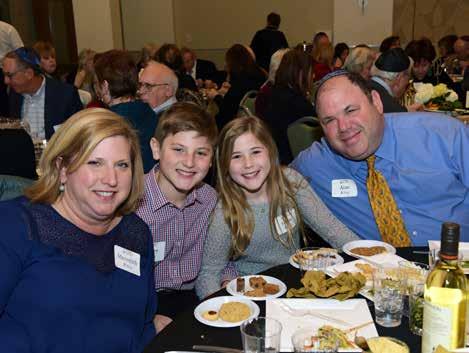

¾ pound carrots (about 2 cups large cubes)
¾ pound potatoes, (about 2 cups large cubes)
1½ cups Persian dried sour plums or dried apricots with lemon juice
2 cups finely chopped sorrel or coriander leaves

6 large eggs, lightly beaten
For serving:
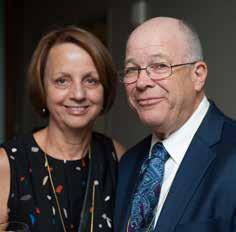
4 squares matzah, broken into 2-inch pieces

Instructions
Heat oil in a large sauce pan. Reduce to a medium-high heat and mix in onions. Cook for 5 to 7 minutes until very soft but not browned. Add meat and mix well. Cook meat, it loses its color, about 5 minutes.
Add broth (or water), and bone(s), salt, and pepper, bring to boil over high heat. Simmer for 15 minutes, uncovered.
Add the whole dried plums or apricots and continue to simmer for 15 minutes uncovered.
Add the carrots and potatoes and chopped sorrel (or coriander leaves). Cook 10 minutes over medium heat, just until potatoes and carrots can be easily pierced by a fork.
Slowly add the beaten eggs while stirring until eggs become long strands like egg drop soup, about 1 minute. Remove from heat and serve immediately into individual soup bowls with about ½ a square matzah broken up into each bowl.
ATLANTA JEWISH TIMES MARCH 31, 2023 | 49 PASSOVER
Temple Sinai Your home for fostering spiritual growth, nurturing genuine connections, and strengthening Jewish life. 5645 Dupree Drive Sandy Springs, GA 30327 404.252.3073 www.templesinaiatlanta.org Join our welcoming community for meaningful opportunities for worship, engagement, and more.
Abu Dhabi Welcomes First Synagogue in 100 Years
By Bob Bahr
For the first time in nearly a century, the Jewish community in the United Arab Emirates is preparing to celebrate Passover in a new synagogue. The beautiful new synagogue complex, which includes a mikvah, is part of multi-faith grouping of buildings, built by the UAE government, that also contains a new Roman Catholic Church and a Muslim mosque.
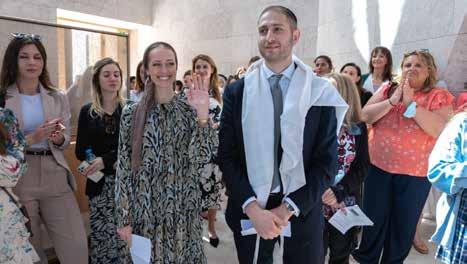


The synagogue replaces a make-shift synagogue in Ross Kriel’s living room. The South African native serves as president of the Jewish Council of the Emirates that represents several hundred Jewish residents. Kriel, a South African who moved to Dubai, in the UAE 10 years ago, is enthusiastic about the progress the Jewish community has made in the last decade.
“We’ve come from my living room to here in about 10 years, it’s amazing. And now look at this extraordinary structure. It’s a monument obviously to tolerance but it’s a vision of our future. The Jewish people need to completely reimagine our place in the region.”

The country has had a chief rabbi, Yehuda Sarna, who was a part-time leader of the community. His full-time job was as Jewish chaplain at New York University and the executive director of the Bronfman Center for Jewish Life. He hailed what he has described as the “emergence of the first new Jewish community in the Arab world in centuries.”
“We have succeeded in creating meaningful points of convergence in temporary spaces,” he told those attending the synagogue’s dedication last month. “But now, we have a synagogue, the first purpose-built synagogue in the region in almost a century. Our journeys
are all intersecting here. This is the point where we can gather the sparks of light, where we can weave different threads together.”
The synagogue is named for Moses Ben Maimon, the famous 12th century Jewish rabbi and codifier of Jewish law,
more commonly known as Maimonides. It’s an elegant white stone cube sheathed in a series of V-shaped columns that soar a hundred feet.
Among the first tourists to visit the building was Rosthema Kastin, an Atlanta designer with her own firm here. On a

trip to Abu Dhabi earlier this month, she found the synagogue and its companion buildings an inspiring space.
“Each and every one of these buildings is beautiful in its simplicity. They offer a welcoming embrace to whoever enters them and create a sense of calm
50 | MARCH 31, 2023 ATLANTA JEWISH TIMES PASSOVER
Happy Chanukah! OFFERING RESPONSIVE AND COMPASSIONATE FAMILY LAW REPRESENTATION SINCE 1991 OFFICES IN DOWNTOWN ATLANTA AND NORTH BUCKHEAD 404.688.8810 KSFAMILYLAW.COM MAIL@KSFAMILYLAW.COM Happy Passover!
The elegant interior, with its ark for the Torah, has the Ten Commandment incised on its walls.
Close to the new synagogue is the planned Zayed National Museum in Abu Dhabi, designed by Pritzker Prize-winning architect Lord Norman Foster.
The new rabbi of the synagogue, Rabbi Ben de Toledo and his wife, Rabbinit Yael de Toledo, who is an ordained teacher of Talmud, moved from Jerusalem.
The mesh roof structure is designed to recall the temporary covering over the buildings that are created each year as part of the holiday of Sukkot // Photo Credit: Rosthema Kastin
and wellbeing.”
Kastin was told that the building exterior symbolizes the palm fronds used in the temporary shelters that are constructed as part of the holiday of Sukkot. Inside, she found a metal structure suspended from the central skylight that filtered light.


“The iron grid used in the upper part of the ceiling inside has an opening in the center. It is reminiscent of a roof on a sukkah, which is traditionally loosely constructed of branches. There’s a very simple bimah and an ark to hold the only Torah dedicated to an Arab sheik, the ruler of Abu Dhabi, who gave it to the congregation.”
According to the prominent Ghanian-British architect, Sir David Adjaye, who designed the structure, there is also a spiritual dimension to the building’s design.
“The columns on each side of the building have seven points that touch the ground and eight points that touch the soffit, the roof overhang – with seven being a representative symbol of man, and eight representing G-d above.”

The synagogue is more than a spiritual symbol. It represents an acceleration of ties between the UAE, and the Jewish world. They have expanded rapidly as a result of the Abrahamic Accords, which were signed in 2020. The UAE has exchanged ambassadors with Israel and trade between the two nations has increased to $2 billion a year. There is now an office of the American Jewish Committee in the UAE.

Earlier this month the Anti-Defamation League, in partnership with the government, dedicated the Manara Center, an educational project in Abu Dhabi to counter religious extremism in the Middle East.
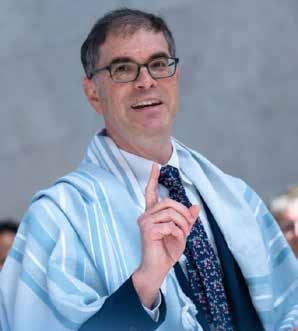


The chairman of the Manara Center, Dr. Ali al Nuami, who is head of Hedayah, the UAE’s leading institution in the fight to counter violent extremism, described the new partnership as a way to encourage the importance of creating new values in the next generation in the Arab world.
“We want a future where everyone is respected, regardless of religion, race or ethnicity. Our region has suffered a lot throughout the decades and the root cause has always been extremism.” ì

ATLANTA JEWISH TIMES MARCH 31, 2023 | 51 PASSOVER From Our AJA Family To YoursWishing You A Healthy & Joyous Pesach! !חמשו רשכ גח w w w . a t l j e w i s h a c a d e m y . o r g V i s i t u s ! Shaping The Next Generation of Jewish Leaders.
Rabbi Yehuda Sarna, chief rabbi of the UAE.
Unity Creates Community...
For this year’s Passover issue, we asked members of the community to share their thoughts, inspiration, advise and encouragement as you prepare for the holiday. Those that participated was given the prompt "Unity Creates Community" or they could write about whatever they wanted. Many of the submissions looked to a more promising future of large groups and lots of loves ones around the table this year.
Joe Alterman
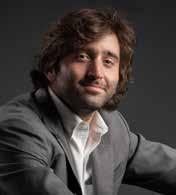
There are so many takeaways from the story of Passover but, for me, the one that resonates most is that of overcoming hardship. In my life, the most difficult thing I’ve had to contend with is my adolescent struggles with a severe and debilitating form of obsessive-compulsive disorder (OCD).


The compulsions I acted out during that difficult period were mostly mental ones so, from the outside, most people couldn’t tell that I was suffering, but I was - save for the five or so minutes after getting into bed, just before falling asleep, where I’d listen to music by Miles Davis, Nat Cole, Sonny Rollins, Charles Mingus and more. I treasured those few minutes - and every moment I was able to spend at the piano. It was during this time that the piano became a safe space where I can always express and be myself.
Toward the end of my dark days in high school, I reached out to Sonny Rollins via his website to tell him how much his music helped me deal with OCD. I was shocked when he actually responded:
“Dear Joe, Your comments were appreciated. We all have to use adversity as an opportunity to find a way. So, keep a strong mind throughout this short existence. Your examples give us all hope, as all of us here in this life have to struggle.”
Those words have become my life’s motto and now, quite a few years after cognitive behavior therapy helped put those rough days behind me, I see how right Mr. Rollins was: OCD was nothing more than the greatest opportunity in the world to strengthen my mind and myself. I know it was hard to see during the darkest of days, but I am truly thankful for that experience and know I wouldn’t be where I am today had it not been for my OCD. People often approach me at my performances and say things like, “You sound like an old man who has been around a while.” I’m always incredibly touched by that and totally credit any “feeling” people associate with my music to my experience with OCD.
As mentioned, the story of Passover resonates with me. Back then it inspired me, reminding me that there’s always a light at the end of the tunnel. Today, looking back over the past 2000-ish years of Jewish history, knowing that our current journey began with the brave decision to leave Egypt and step into the unknown, the story serves as a motivating reminder of all the unexpected rewards and possibilities that can come from facing one’s fears and taking that first step into the darkness in search of the light.
52 | MARCH 31, 2023 ATLANTA JEWISH TIMES PASSOVER
Joe Alterman is an internationally acclaimed jazz pianist & executive director of Neranenah Concert & Culture Series.
Rabbi Peter Berg
It all happened many centuries ago. Amid the desert wastes where the silent Sphinx of Gizeh and the sand-packed pyramids of Cheops stand, mighty ancient Egypt ruled the world. Still, every Pesach, when we open the Haggadah and review the drama of the Exodus, her haunting voice shouts across the chasms of history. When, in this way, we raise the curtain of the past, we are prone to wonder if all of this pageantry could have occurred.
In that far-off period of the Exodus, a heavy pall – sinister, oppressive, crushing – blanketed Egypt. The Israelites writhed under a lacerating burden of servitude. Pharaoh, on his golden throne, groveling slaves chained together in the pits, and (in between) a complicated priestly hierarchy – these comprised society in ancient Egypt. The idea of liberty was unknown. There was absolutely no concept of human dignity.
Then came the miracle! Out of the Infinite, a voice came forth: “Send forth My people that they may serve Me!” Pharaoh was startled, dumbfounded. Such a demand had never been recorded before. What right had slaves to freedom, worship, G-d?
But the incredible was achieved. Moses and Aaron insistently cried, “Let My people go!” The pall lifted: the idols came crashing down. Freedom had dawned. It was the very first Pesach!
This year, let us recapture the meaning of the first Pesach. Today’s Pharaohs – no matter by what they are called – still do not understand it. They, too, are headed toward doom unless they implement the Divine imperative: Let My people go!
Peter Berg is the senior rabbi of The Temple in Atlanta.
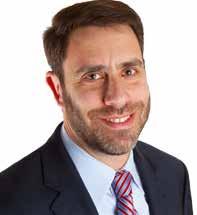
Rabbi Michael Bernstein
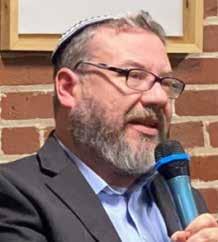
Why do we break the middle matza near the beginning of the seder? Perhaps, an odd question to ask in responding to a prompt about unity in our community. Yet, the cracking of the matzah is a reminder that, when we tell our story, we have to make sure we begin with acknowledging brokenness.
We can’t begin to be who we are as a community - as a Jewish community or as a society - without feeling for the places in which there are cracks. At the seder, this requirement is emphasized in the words we say following yachatz, the breaking of the matza: This is the bread of affliction...all who are hungry come and eat, all in need share this Passover.”
Passover is a time for sitting around the table with loved ones and being grateful for what we have, and it is also a time for making sure that we do not forget others who may fall through the cracks and that we commit to the needs of others, whether physical or otherwise. When we do break the matza, we put the bigger piece away to be hidden and, later, search for as the afikomen. So, indeed, we have the recovery of the broken part in mind. And not until we get there do we come to the end of the telling and open the door, not only for Elijah, but to see what comes next.
Unity then is made possible by making the space for connection, perceiving the brokenness that exists, and finding together that part that is hidden. After all, the Haggadah continues, “This year, we are still enslaved, next year we will be free.” May this Pesach usher in the time of wholeness and unity for which we strive and the joy of opening our doors to the whole community.
Terri Bonoff Unity Builds a Stronger Community
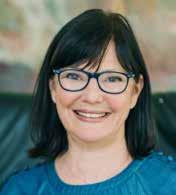
This Passover is a tough one for me. My Dad passed away on Dec 25th, my mom has Alzheimer’s and is living in the cobwebs of a different reality. My husband, Matthew, and I have led the Seder for many years but were always bookended by a vital Senior presence. We have now become the “Senior” presence. Our family Passover tradition is built on a foundation of “Unity.” Matthew and I have been married 29 years but ours is a second marriage and we have raised a blended family. Yet, family lines expand during the Seder. Every family member, no matter how long ago they were “family” is invited and shows up. This tradition communicates the values of love, respect, acceptance, and tolerance. This year’s Seder also brings hope and optimism with two beautiful grandchildren in the house!

As I look beyond my personal Passover experience, I see a thriving “united” Jewish Atlanta community. This is reflected in the 300 people in Georgia signing up for the Israel Federation trip that begins right after Passover. This is also reflected in the work JF&CS is doing in partnership with Federation and a multi-generational group of funders and community leaders to address the challenges of young people’s mental health and well-being with the new BeWell initiative. The strength of the partnership gives us hope that we can in fact meet this crisis and bring healing to the forefront.
And then I look beyond, and I see “Unity” in the streets of Israel. However, this example of “Unity” is in opposition and in stark contrast to the unity I reference above. We can look across the globe and lament the “disunity” we are seeing in Israel, or we can celebrate the fact that our beloved Israel is also a democracy and therefore provides citizens with the right to “Unite” and express the strength of their disagreement.
The times we live in are complicated. I am called to lead with my values as my North Star—life is messy, and we cannot shy away from conflicts. We have the strength to bring love, respect, acceptance, and tolerance to all we say and do. That is my personal pledge. May the streets of Israel be safe and welcoming for all of us hoping to be there very soon! May our Atlanta organizations strive to work together as a united community.
ATLANTA JEWISH TIMES MARCH 31, 2023 | 53 PASSOVER
Michael Bernstein is the Rabbi of Congregation Gesher L’ Torah.
Terri Bonoff is the chief operating office for Jewish Family and Career Services of Atlanta.
Delilah Cohen
As the year 2023 seems to fly by, we have many challenges facing our world. Although globally there is unrest and suffering for many people, we must continue to be strong, positive, and hopeful. Jews throughout the world will be celebrating Passover in a few days, and what better time than now to remember how incredible progress and change can be accomplished when all hope looks lost. Passover is a time of reflection, inspiration, and renewal. It is a time to celebrate freedom, remember our history, and look towards the future. As we gather together to celebrate this holiday, we are reminded of the importance of unity and community. This year, we are especially honored to be celebrating the 75th anniversary of Passover and the State of Israel. This milestone is a testament to the enduring nature of our traditions, and the strength of our community. As we come together to commemorate this occasion, we are reminded of the many challenges that our ancestors faced on their journey to freedom. At the heart of Passover is the theme of unity. It is only through coming together that we are able to create a strong and resilient community. As we celebrate this holiday, we must remember that we are all part of a larger whole. We must work together to support and uplift one another, and to create a world that is just and equitable for all.
This year, as we gather around the Seder table, let us take a moment to reflect on the lessons of our ancestors. Let us remember the struggles that they faced, and the strength and determination that they showed in the face of adversity. Let us also look towards the future with hope and optimism, knowing that we have the power to shape our own destiny. As we celebrate this milestone 75th anniversary, let us also take the time to appreciate the incredible richness and diversity of our community. We come from many different backgrounds and traditions, but we are all united in our commitment to celebrating our heritage and passing it on to future generations. In the spirit of Passover, let us work together to create a more just and equitable world. Let us be inspired by the example of our ancestors and let us strive to make the world a better place for all. Together, we can create a community that is strong, resilient, and united in our shared values and beliefs.
I hope to celebrate with you at Atlanta Celebrates Israel @75. www.AtlantaCelebratesIsrael75.com.
Chag Sameach to all and a Happy 75th Anniversary!
Delilah Cohen is a founder of D. Cohen Academy, JNF-USA Atlanta Board and Israel@75 Co-Chair.

Debbie Diamond
Passover is around the corner. We have invited all of our guests and purchased most of the products for the eight days. Jewish holidays come whether we’re ready for them or not. And to be honest, I’m not ready for much of anything at the moment.

You see, we have two senior dogs, both of whom are ill. One is very ill, as in, she was in the hospital for three days and has been on a strict diet and regimen of six or seven pills each day. But Passover will be here on April 5, and we must be prepared. Because, like the game of Hide and Seek, ready or not, here it comes!
My siblings and I each take a holiday to host, and Passover is at my home. We will gather around our dining room table, just as we do every year, and recount the story of the Israelites leaving Egypt. We will take turns reading about the discussions between our rabbinic sages, Rabbi Yosi the Galilean, Rabbi Eliezer, and Rabbi Akiva, and we will recite Dayenu in unison. My husband will point out all the items on the Seder plate, and we will partake of the parsley dipped in salt water, the charoseth and then make Hillel sandwiches. There will likely be rumblings among the crowd about how much longer the seder will run and when we are going to eat. Yes, I know my people!
After the first part of the Haggadah is read, we’ll eat fish (Moroccan or gefilte), Moroccan salads, matzo ball soup, brisket, roasted chicken, potatoes, carrots, a green vegetable, and the incredible banana chocolate cake my sister-in-law makes each year. We will then make our way to the family room and have coffee as we finish our seder.
I realize we have the same routine every year. After all, are we not mandated to tell the story of the exodus from Egypt each Passover as though we personally went through it? Our group recites the same prayers, sings the same songs, and eats the same recipes that have been passed down from generations. Most Jewish families I know do the same!
And yet, rather than being bored with the predictability of each Passover gathering, I frankly love knowing what to expect. Celebrating with family and friends brings warmth and life to a home. Maybe this is all part of G-d’s plan. Regardless of what is happening in our lives, we pause, pray, celebrate, or commemorate. For a time, all of our daily challenges are placed on hold, and we are able to simply experience the beautiful spirit of the holiday and time with our loved ones. Our parents and grandparents shared these traditions with us, and we will pass them along to our own children and grandchildren, hoping the cycle never ends and feeling fortunate we are able to do it year after year.
These snapshots in time, particularly during holidays, make the ordinary extraordinary. Memories -- built over time and unique to each family -- add meaning to our lives. Perhaps it is in these precious moments that our lives are enriched with holiness.
Wishing you a happy and meaningful Passover, friends. And as we read at the end of the seder every Passover, next year in Yerushalayim!
Debbie Diamond is a contributing writer for the Atlanta Jewish Times.
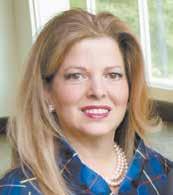
54 | MARCH 31, 2023 ATLANTA JEWISH TIMES PASSOVER
Cheryl Dorchinsky
We as a Jewish people will soon celebrate Passover commemorating our ancestors' Exodus from Egypt. A time in our history where Jews once again were being persecuted because of being who they are… Jewish. With antisemitism on the rise around the globe, it is my hope and prayer that we all can work together as one voice and strengthen our love for not only the State of Israel but a love for our religion and culture. The heroes of our bible chose to keep their religion strong and left Egypt. It is our responsibility to try and imagine what that was like.
What an incredible amount of faith, courage, and desire for freedom they must have had. For some, that was the only place they ever knew. Some must have worried as to what would happen if they were caught. The possibilities go on. It’s hard to imagine since today looks so different.
May we as a people be as courageous as they were and pursue a world where Anti-Zionism/ Antisemitism is snuffed out. Let us unite and use our voices together.
May this Passover create a movement of where the words Psalm 133 will be put into practice. “How good it is for brothers and sisters to dwell together in unity.” Let us stamp out hate wherever it roots so our world is left a better place for all future generations.


Chag Pesach.
Cheryl Dorchinsky is the executive director of Atlanta Israel Coalition and social media influencer.
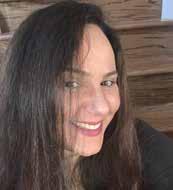
Rabbi Joab EichenbergEilon Our
Town is Burning!
“The wicked son asks, ‘What is this worship of yours?’ – yours, but not his. Were he a slave in Egypt, he would not have been redeemed.” The Haggadah’s message of unity: when my home is on fire, don’t stand idle - your home may be next.
“It’s burning! Brothers!
Our poor town is burning!
Angry winds with rage are tearing, Stoking up the flames and smashing. Everything around is burning! And there you are, you’re staring, with your folded arms, just gazing, As our town is burning!”
When Mordechai Gebirtig wrote these Yiddish lyrics in 1936, few imagined that less than a decade later, one third of the Jews in the world will have perished in the Shoah, let alone that antisemitism would still be alive and lurking in the most enlightened nations.
On the eve of Passover this year, my home is on fire. My family is in tears. My country is on the verge of imploding. And if you, my brethren, don’t come to the rescue, my home – which is your home – will go up in flames.
Israel’s national anthem, Hatikvah – “The Hope” – says what generations of Jews were yearning for: “to be a free nation in our land.” For nearly 75 years, this was not a dream. But if we fail to act now, Israel as you know it will evaporate.
So, for the sake of Jewish liberty and unity, I plead with you, in Gebirtig’s words:
“It’s burning! Brothers!
Our poor town is burning!
Only you can help, no others, Our poor town is burning!
If you love our town, don’t tire, Take the buckets, quench the fire. Don’t with folded arms keep staring, As our town is burning!”
Happy Festival of Freedom! חמש תוריח גח
Rabbi Joab Eichenberg-Eilon, former Israeli diplomat and Emory University and GSU faculty, is currently Israel Institute of Biblical Studies professor of biblical Hebrew and Aramaic.

ATLANTA JEWISH TIMES MARCH 31, 2023 | 55 PASSOVER
Sherry Frank
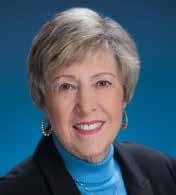
Dayenu, Dayenu is a central theme of the Passover seder as we retell the story of liberation and question our progress towards freedom. This year, as we take a deep breath, some might say, “Dayenu, it is enough.” For others, a louder voice within cries out across the parted sea, “Dayenu, it is not enough.”
D— the DOBBS v. Jackson Women’s Health Organization decision overruled Roe v. Wade and eliminated the federal constitutional right to abortion, casting aside a 50-year precedent. It is a direct attack on a woman’s bodily autonomy and her right to decide when and if to have children.
Lo Dayenu, it is not enough.
A— ANTISEMITISM is increasing exponentially as Jews and our institutions are attacked. Jewish security is threatened.
Lo Dayenu, it is not enough.
Y— This is the YEAR we celebrate Israel’s 75th anniversary with pride and a full heart.
Dayenu, it is enough.
Yet, with the current threat to its judiciary, protestors in record numbers are demonstrating in her streets. Israel’s democracy is at risk. Lo Dayenu, it is not enough.
E— EQUALITY for girls and women is still a far-off dream in this country and around the world. When we finally pass the Equal Rights Amendment, Dayenu, it will be enough.
N— As NEWCOMERS immigrate from war-torn countries, especially from Afghanistan and Ukraine, let us remember that we, too, were once strangers in a new land. When we open our hearts to these families, Dayenu, it will be enough.
U—When we promote UNDERSTANDING and truth about our history, its injustices, and its achievements, and when we promote UNITY and respect within the diversity of our Jewish community, then we can truly let freedom ring. Dayenu, it will be enough.
Rabbi Nachi Friedman Ha Lachma Anya- A community of Matza!
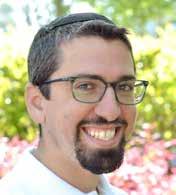
We begin our Passover Seder in a peculiar way. We uncover our Matzah and declare, “This is the bread of affliction that our ancestors ate in the land of Egypt. Anyone who is hungry should come and eat.” Question 1) Why are we inviting everyone now? Are people actually walking outside looking for invites? We likely have our meal prepared; shouldn’t we say this prior to the start of Passover? Question 2) Why is matzah the bread of affliction? If you look in the Torah, Matzah is the bread of freedom! The first mention of Matzah is during the exodus when we hurried out before the dough could rise. Why are we calling it bread of affliction?
I’d like to suggest that the affliction isn’t just a reference to the slavery in Egypt, but to the trials and tribulations of our Jewish history. Throughout life we, as a nation, have experienced challenges, obstacles, triumphs, and successes. The Haggadah text states this perfectly “
.- in each generation, they stand [against] us to destroy us, but the Holy One, blessed be He, rescues us from their hand.” Throughout these ups and downs our nation remained resilient, strong, and unwavering. The Matzah represents this journey.
To take this further, we invite others to our meal, not just to be hospitable and friendly, but to display our freedom. Rabbi Lord Jonathan Sacks z”l comments in his Haggadah, “The law of the camp (referencing the Holocaust) said: “Eat your own bread, and if you can, that of your neighbor.” To do otherwise would have been suicidal. The offer of sharing bread was the first human gesture on the journey from slavery to freedom. One who fears tomorrow does not offer their bread to others. That is why we begin the Seder by inviting others to join us. That is how we turn affliction into freedom.
Our tradition on Passover is to avoid bread/chametz and eat Matzah, unleavened bread. Rabbi Stolper writes, “Fermentation/chametz, is a function of nature which symbolizes the negative forces of civilization which sway man from his responsibilities.” Bread that has fermented spoils in a few days while unleavened bread lasts much longer. Rabbi Stolper describes matzah as bread that overcomes the limitations of time.
We eat matzah on Passover to represent the Jewish nation’s resilience, journey and ability to survive every generation (בְּכָל דּוֹר וָדוֹר). When we state Ha Lachma Anya- “this is the bread of affliction,” we are praising ourselves and our people. We display our triumphs and freedom as we sit together and invite everyone to our meal. Yes, our past is filled with affliction, but when we sit together as a community we turn the matzah of affliction into the matzah of freedom. We are not leavened bread that is temporary, but a nation that can stand the test of time by rising up together as a community.

56 | MARCH 31, 2023 ATLANTA JEWISH TIMES PASSOVER
Sherry Frank is co-president of NCJW Atlanta Section.
שֶׁבְּכָל דּוֹר וָדוֹר עוֹמְדִים עָלֵינוּ לְכַלוֹתֵנוּ, וְהַקָּדוֹש בָּרוּךְ הוּא
מַצִּילֵנוּ מִיָּדָם
Chag Sameach.
Nachi Friedman is the rabbi at Congregation Anshi S’fard, and a play therapist at JF&CS.
As we recount the story of our enslavement in Egypt and journey to freedom, we ask: what will you do to help ensure the liberation of our brothers and sisters struggling to be free?
Your generosity makes it possible for us to respond swiftly to provide the crucial support needed to care for our neighbors, lead people to safety, and ensure a vibrant and flourishing Jewish community in Greater Atlanta.

With your gift, you enable Federation to aid countless people in need—at home, in Ukraine, in Israel, and in over 70 countries worldwide.
So, on this night, while we shun other vegetables and eat only bitter herbs to remind us of the bitterness of our bondage in Egypt—let’s also ask what we can do to sweeten the lives of those who suffer the bitterness of poverty, injustice, persecution, or the devastation of war.



This Passover, don’t forget the fifth question

“What on this night can you do to repair our local community and the world?”
Chag Pesach Sameach! Make a difference today! Donate at JewishAtlanta.org/donate or scan the qr code.
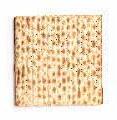
of Greater Atlanta

ATLANTA JEWISH TIMES MARCH 31, 2023 | 57
“What, on this night, can you do to repair our local community and the world?”
Rabbi Brian Glusman
While there are many rituals and traditions associated with the Seder, one of the most familiar is the breaking of the middle matzah at the beginning of the Seder. Why do we break the middle matzah and not one of the others? Our sources offer several explanations.

One explanation suggests that the middle matzah captures the image of our ancestor’s position “between a rock and a hard place,” caught between a pursuing army and a sea they were afraid to cross.
The broken matzah also reminds us that even when life seems to be at its darkest, when we feel most depressed or incomplete, there is still reason to hope. Our ancestors were liberated from slavery and ultimately led to the Promised Land.
The Haggadah tells us “…in every generation we are to see ourselves as if we ourselves came out of Egypt…” and so it is our duty to continue the process of redemption by always striving to be free. That middle matzah is broken rather than the top or the bottom, to teach us how to break out of bondage, whether it be spiritual, physical, or psychological. If we stand as that middle matzah, surrounded by faith, family, friends, and G-d, it is certainly possible to break free. It is through the support and faith of those around us that liberation and redemption is possible.
The MJCCA joins me in wishing you a Chag Kasher V’Sameyach, a happy, healthy and meaningful Passover!
Brian Glusman serves the Marcus Jewish Community Center of Atlanta and is the visiting rabbi at Shearith Israel Synagogue in Columbus, Ga.
Rabbi Josh Hearshen
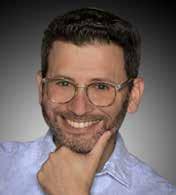
Passover is a holiday that tends to unite the Jewish people. It’s thought to be the most widely observed Jewish ritual around the world and it’s something that causes many Jews, who are otherwise relatively nonobservant, to be in a similar boat as their more observant brethren. Each year, we prepare by reviewing menus and recipes. We locate our ritual objects and we clean our houses. This varies from family to family and community to community, but, for the most part, Jews will be united in some form of observance when it comes time for Passover. Throughout the Seder, we read time and again first-person plural language. The narrative is not about “you.” It’s not about “him/her.” It’s not about “them.” It’s all about us…we were slaves and we left Egypt as a people. This is not my story, it’s our story and it matters.
Jewish unity has always been a struggle because we seem very good at creating groups. There’s a joke about the Jewish man who was stranded on a deserted island. When he was rescued, he showed the many things he built to his rescuers. Amongst those items were two synagogues: one for him to pray in and one in which he would never set foot. While the joke is silly, it’s also way too real. We, as a people, have taken ourselves and divided into so many groups and subgroups that, at times, it’s impossible to see how each of us is a piece of the greater collective. The reality is many of us find comfort in our special subgroups of the Jewish community and also find ourselves in the greater collective, all at once. In this model, we have Venn diagrams, and that’s a super way to be a larger community. At times, however, we run the risk of creating non-overlapping communities that retreat into themselves and refuse to see they have a larger community to be a part of.
These past months have been very taxing in the Jewish world. A large majority of Jews feel a deep connection to the state of Israel and we’ve been quite alarmed by all that’s been transpiring there. Our Israeli brothers and sisters are finding themselves more and more tribal and less and less united. They’re finding they’re being split apart and the danger that irreparable damage could be done in our homeland is real. As a warning to the Jewish world and the citizens of Israel, one need not look any further than 70 C.E. when we last lost our Jewish nation through an appalling lack of unity. So long as we continue to sow disharmony, that’s what we will reap.
It’s my prayer that we take the moments of Passover to see the large amount we share as one Jewish community made up of Jews of all shapes and sizes. It’s my prayer that we find the hunger for the unity that seems to be slipping from our grasp. It’s my prayer that Passover unify us in our mission of being in a communal relationship with G-d through Torah and that we, as a Jewish community, grow inward towards one another in the days, weeks and months ahead.
Arnold Heller

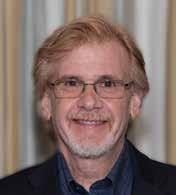
I believe this to be a fact of life and recently moved from an apartment complex that, for nine years, was a golden age of friendship and community. People looked out for and supported each other. Lifelong friendships formed, even after friends moved away.
Unfortunately, an adjacent apartment complex blew up from a gas leak and many of their refugees moved next door to us. The new arrivals were almost uniformly selfish, sullen, and uncaring about noise and problems they caused their neighbors.
The quality of life quickly deteriorated, and I and my friends moved to escape the nasty new population. It took only a few months to destroy nine years of neighborhood unity and bliss and shatter a wonderful community.
58 | MARCH 31, 2023 ATLANTA JEWISH TIMES PASSOVER
Rabbi Josh Hearshen is the rabbi at Congregation Or VeShalom.
Arnold Heller is Chair of the Atlanta - Ra’anana Sister City Committee.
Rabbi Joshua Heller
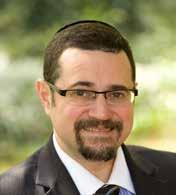
After the very first seder, there were to be no leftovers. In Exodus 12:10, Moses is warned that the Paschal Lamb, offered on Passover eve, must be consumed on that very night. Those who failed to clean their plates would not only run afoul of grandma’s decree, but G-d’s as well.
In the event that any should be left over, it must be burned. In order to facilitate the proper observance of this commandment, the Israelites are told to do something unusual. If any household does not have enough members to eat a whole lamb, they must approach the neighbors and go in together on a shared one.
Today, there is no paschal lamb, and seder leftovers may, indeed, be served later in the week (a Deja stew, if you will!) But the lesson of the shared lamb is significant. We may think that we are self-sufficient as individuals, as families, or even as segments of a community. However, in order to achieve the true liberation of Passover, we must recognize our connections to those around us. The bonds of community are not dependence or codependence- they are interdependence. It is easy to assert that those who are fed are reliant on those who provide the food, but on Passover, the converse is true as well. The family who can afford a lamb actually needs its hungry neighbors just as much.
This Passover, we are grateful that the angel of death does not literally stalk outside our doors, (though perhaps we face other foes). Still, the laws of the Paschal lamb remind us that we never know when we will need to come together for shelter and sharing, just as our ancestors did in ancient Egypt. It is only as a united nation that we are redeemed.
Rabbi Lauren Henderson
There are days on which I feel like I have far more in common with my Christian or Muslim neighbor than I do with an ultra-Orthodox Jew in Kiryas Joel or Jerusalem. And when I look at the sea of Israeli protestors for democracy, I see my brothers and sisters, and yet, I wonder - what ties us all together as Jews?
This midrash from Vayikra Rabbah speaks to this question:
The Torah, in discussing sin and sacrifice, says: v’nefesh ki techeta – here’s what you do when an individual soul, a nefesh, sins. So, the midrash asks: Why doesn’t the Torah say, “when SOULS sin,” in the plural, if we’re talking about the collective? Because our entire people is called nefesh achat, a single soul – and if one of them does something they aren’t supposed to, the entire people is affected –kulam arevim zeh bazeh. We are all inextricably linked.
The midrash goes on to say: OK, what is this like? This is like a group of people who were all traveling on a boat, and one of them took a drill and began to drill underneath his own seat. The others turn to him and say: “You fool! You are drilling underneath your seat, but the water is entering the boat and we will ALL be lost!”
Perhaps there is nothing that all Jews have in common, other than the fact that our fates ARE inextricably linked with one another. As members of a tiny global minority, whatever one Jew does reflect upon us all. Whether we live in Israel or Uganda or Japan or the U.S., we are part of nefesh achat, a single soul, and we are responsible for one another whether we like it or not.”
Rabbi Lauren Henderson is the spiritual leader of Congregation Or Hadash.
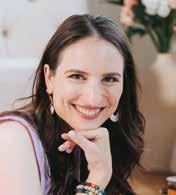
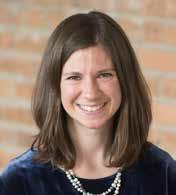
Meliss Jakubovic
Things change as soon as you decide they will.
And the greatest thing about being human is we are allowed to adapt, evolve, and become newer versions of ourselves.
Not that you need the permission…but just remember, this is your ONE SHOT at this life and you must experience it the way you feel you need to.
So, if you said once upon a time that you
“Would never ______” and you realize you probably would, or you want to, or you already have…
IT’S OKAY TO CHANGE.
On Pesach, I am reminded that it took a lot of courage and faith for us to leave Egypt and embark on a perilous journey towards an uncertain future, that ends with the story of FREEDOM.
Making changes in life can similarly be difficult and scary. It may involve leaving familiar locations, situations, routines, or relationships. Change requires intuitive faith or belief that you will reach your full potential by learning lessons and moving forward. That’s what growth is after all.
And as we grow, there will be obstacles and challenges, but your persistence, determination, and positive attitude can stretch you closer to your higher self…your true FREEDOM.
Trust in a higher power and flow towards what makes you feel fulfilled. Decide that you are making the change and then just do it. It’s all part of the journey.
Wishing you a Chag Pesach Sameach and may you enjoy the journey towards your freedom.

ATLANTA JEWISH TIMES MARCH 31, 2023 | 59 PASSOVER
Joshua Heller is the senior rabbi of Congregation B’nai Torah.
Meliss Jakubovic is Atlanta’s Israeli Folk Dance instructor and an Online Marketing Strategist to coaches and healers.
Rabbi Mark Hillel Kunis
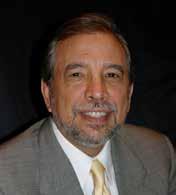
Has Life Enslaved You?
Has life enslaved you? Do you ever feel stuck—shackled by life’s pressures? Are you stuck in a job you don’t want and feel your dreams slipping away? How many times have we felt inspired to make a change and said to ourselves, “That’s it, I’m done. I’m ready to start exercising, start a diet, get off my phone, off social media and just spend more time with my children, my family?” And then we find ourselves right back where we started. How do we break free? This is what Passover is all about.
You see Passover is much more than the holiday commemorating the Exodus of the Jewish people from Egypt. The Hebrew word for Egypt, Mitzraim, comes from the word meytzarim (constraints). Passover is the time where each of us can break free from whatever is constraining us—holding us back. That’s why there are three essential words that we are commanded to internalize and explain at our seders. They are the three steps to personal freedom: and they are Pesach, matzah, and Mara.
“Pesach” literally means that G-d passed over our homes and saved us. Kabbalah teaches that Pesach is a conjunction of two words, peh (mouth) and sach (talking): peh sach, a “talking mouth.”
We were enslaved in the hands of Pharaoh. Pharaoh, or Paroh in Hebrew, is also a conjunction of two words, peh (mouth) and rah (evil) or “evil talk.” How many times do we enslave ourselves with negative speech? And I don’t only mean lashon hara (gossip). It’s also when we put ourselves down saying, “I can’t do it. It’s not for me.”
The first step to liberating ourselves is having positive speech. Pump yourself up. Tell yourself when you’re challenged, “I can do it. I got this.” If you do that, you’ll be taking the first step to personal freedom.
The second step to personal freedom is in the word matzah, which is one of the most recognizable Jewish items. What’s more Jewish than matzah? It’s up there with the shofar, the menorah, and of course matzah ball soup. We all know why we eat matzah on Passover. A long time ago when the Jews were leaving Egypt, there wasn’t enough time to bake bread. The Jews were so busy rushing, they threw the dough on their backs and later baked it into crackers.
What? Could that be? G-d shows up in Egypt and brings 10 of the coolest plagues ever: blood, frogs, lice, locusts, darkness. By the time the Jews are ready to leave, Egypt is upside down. Jewish motivational speaker Charlie Harary is fond of asking, “Couldn’t G-d have arranged for us to have a late check-out?” Why did we have to run out like fugitives? Why couldn’t we leave like normal people? And yet, this technical difficulty of not having enough time to bake bread became the symbol of the Exodus, the symbol of our freedom and Independence?
My friends, Judaism is not a commemorative religion. We don’t do things just because we did them a long time ago. Judaism is dynamic—it’s relevant. We use history as a window into something much deeper to better our lives today.
Mitzrayim, Egypt, constraints, is both a historical place and an everyday reality. We all have constraints, aspects of our lives that are lacking—areas in which we feel unable to grow and change for the better, relationships that are strained, talents unfulfilled, frustrations, disappointments and failures we see in ourselves and others. We’re looking to break free of these constraints.
Sometimes, the opportunities we’re looking for that can change our lives, present themselves right before our eyes. It’s a moment that requires us to step up and grab it. But there’s a catch: growth moments are almost always wrapped in challenge, in difficulty and in discomfort.
And when these moments present themselves, we get stuck. We know we should do it, but we can’t bring ourselves to do it. We know we should make the call. We know we should be healthier. We know we should learn more. We know we should be more patient and kind and generous and tolerant—but it’s hard and we’re tired.
What’s the difference between bread and matzah? Time. Matzah must be made in a hurry—less than 18 minutes—so that the dough doesn’t rise. When we get a moment of inspiration, when we want to create a change in our lives, we must seize the moment. Don’t procrastinate, don’t hesitate. Like baking matzah, do it right away.
Too often we come up with this brilliant response. “Later! I’ll do it later. No, I want to and I’m going to, but at the end of the day, it’s almost the weekend. I should do it after the holidays, or when the kids are out of the house. You know what? When my business improves. No, after I retire.” Later is a great way to avoid what we know we need to do. But later is the first step to never!
Matzah doesn’t just commemorate how we left Egypt 3,000 years ago. It’s the symbol of how we can get out of Egypt every day of our lives. G-d deliberately rushed us out of Egypt to teach us that freedom doesn’t wait till it’s convenient. We need to run to opportunities. We shouldn’t walk, and we definitely shouldn’t stroll. Chametz is later and matzah is now. It’s the difference between a life of meaning or a life of mediocrity. Chametz or matzah? This is why matzah is the second symbol of personal freedom.
Lastly, there’s the mara, the bitter herbs we eat to remember the bitter years of slavery in Egypt. But why dwell on the pain of the past? We’re free now. You know why? Because people sometimes think, “If only I didn’t have such challenges and hardships in my life, I would be a much happier person.”
The truth is, it’s our challenges that bring out the greatness within us. We eat the mara to remember to step into those challenges, to overcome the pain. So, eat the mara. Dare to do something new. Step out of your comfort zone.
My friends, Passover is your chance to grow and break free. Just follow the three steps of the Haggadah:
No.1: Peh Sach: positive speech, believe in yourself and verbalize it.
No. 2: Matzah: don’t procrastinate, seize the moment.
No. 3: Maror: step into life’s challenges and choose to grow.
Chag kasher v’sameyach. Have a happy and joyous Passover. May this Pesach be a time of growth for all of us.

PASSOVER 60 | MARCH 31, 2023 ATLANTA JEWISH TIMES
Rabbi Mark Hillel Kunis is the rabbi of Congregation Shaarei Shamayim and author of “Dancing With God: How to Connect With God Every Time You Pray.”
By Lou Ladinsky
“In 200 feet turn left and your destination will be on the right.”
Can you imagine if Moses had a GPS to guide his chosen people through the desert? Would it have taken 40 years to reach the Promised Land? We are commanded to eat unleavened bread (matzoh) for the eight days of Pesach. While this can be a struggle for some to endure, it pales in comparison to the suffering of the Jewish people on their exodus from Egypt and slavery.
We often take for granted the modern luxuries we are afforded today to make our lives easier, along with the freedoms we enjoy as Jews living in America. We are hard pressed to make excuses for getting lost today or not being on time. We are blessed with the freedom of choice to pursue all our dreams and goals and to virtually go wherever we want and do whatever we want. G-d has bestowed upon us free will as long as we do right in his eyes and use that free will for the good of society. Looking back at the Israelites’ journey, we are taught we can overcome any obstacles and hardships that life throws in our path.
As you celebrate this Passover with your family and friends, reflect on the Israelites enduring 40 years to reach the Promised land and put that in perspective with what we have today. Eating matzoh for eight days is a sacrifice I am willing to make on behalf of the struggles our ancestors encountered on their journey to freedom. We are truly fortunate.

Rabbi Micah Lapidus
Does unity create community? I’m not sure. Maybe it’s community that creates unity. But what is unity? Certainly not uniformity. Certainly conformity. It seems to me that true unity can be found in the things that bind us to one another. Our shared values, our shared hopes and dreams. Our shared fears and concerns. Our shared commitment to making the world a better place.
Allen Lipis Pesach 2023
As I contemplate this coming Pesach, several thoughts come to my mind. The first is that I am still alive, far longer than I ever thought was likely many years ago.
Given my age over 80, I will celebrate my birthday in a few weeks and then celebrate my anniversary at yearend, both amazing events that didn’t seem possible years ago.
When I review the history of my family coming to America more than a hundred years ago, and then read and read again the history of our people who were murdered century after century in country after country, I have to remind myself how lucky we all are to live in this country with freedom of speech and religion, even though the old story of antisemitism continues unabated here in the USA.
When I was very young, I sat quietly and bored while my grandfather read the Haggadah in Hebrew from cover to cover. Today, I see the reading of the Haggadah as a reminder of how important our freedom is, and how big a price the world has paid and continues to pay for people to remain free. During the early years of my life, I took my freedom for granted because it was and is the hallmark of this country. I was never shot at, I always had a roof over my head, I had clothes on my back and food to eat. I walked the streets safely, rode the trains without a concern, and attended schools when the security of my schools was not an issue.
I believe freedom exists for all of us, but we have to fight for it, and teach others how valuable it is. I know there are rules and regulations for a civilized society, but I vote to keep them to a minimum. I see that my children are living different lives than mine, and I expect my grandchildren will differ from their parents. I want them all to have the freedom to decide how they want to live with as little influence by the government and others on what they decide.
For more than 200 years, many political leaders have said, “Eternal vigilance is the price of liberty.” As we practice this Pesach holiday, may we all remember how precious freedom is for our daily lives. Do not take it for granted. Millions of people have fought for it and died for it. Cherish the freedom you have for yourself and for your family, and speak about its importance as you celebrate this holiday.
Allen Lipis is a contributing writer for the Atlanta Jewish Times.
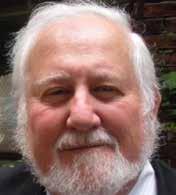
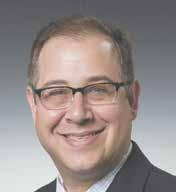
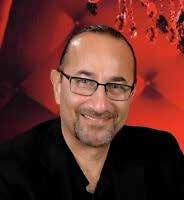
PASSOVER ATLANTA JEWISH TIMES MARCH 31, 2023 | 61
Lou Ladinsky is a product manager for LexisNexis and a contributor for the Atlanta Jewish Times.
Rabbi Micah Lapidus, Ed.D. is the director of Jewish and Hebrew Studies at The Davis Academy.
Rabbi Max Miller
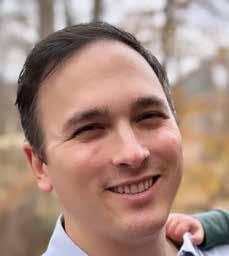
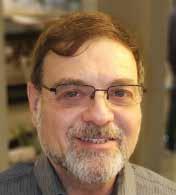
This past week, I wrapped up a three-week series called, “A Jewish Study of the Christian Bible.” Three weeks is hardly enough time to scratch the surface of a topic so vast. In reality, we went a mile wide and an inch deep. When I first proposed the class, I wrestled with a key question, why teach THIS subject when so much of Jewish tradition deserves our attention? Ultimately, I decided to go ahead with a Jewish study of the Christian Bible because, as Jews living in America, we are surrounded by Christian culture. I say that as a value-neutral statement. It’s not a good thing or a bad thing—it just is. So, as Jews living in a Christian culture, we ought to be familiar with the text that shapes the lives, beliefs, and actions of so many of our neighbors, friends, and family.
We ought to study another tradition’s sacred text is to strengthen our OWN Jewish identity. Maybe that sounds counterintuitive. Next time you’re with a friend or family member from another faith, tradition, another political affiliation, or another country, ask them questions about what they believe. Maybe you’ll be persuaded by their point of view, or, just as likely, you’ll leave that conversation feeling more assured in your own beliefs. That feeling of being more certain in your beliefs might also come with something called “holy envy.” Holy envy is a phrase coined by Krister Stendahl, a Lutheran scholar, Emeritus Bishop of Stockholm, and former professor and head of the Harvard Divinity School. Holy envy is the feeling of admiration you might have for the elements of another faith tradition and the wish that those elements might find greater scope in your own tradition. Since no religious tradition expresses all wisdom perfectly, we can find beauty and respect for the beliefs and actions of another faith while, perhaps, strengthening our beliefs in our own faith.
Right now, we are in a sacred time for all Jews, Christians, and Muslims: leading up to Pesach, approaching Holy Week, and the month of Ramadan. I believe that a shared study of our traditions—where we are similar and where we diverge—will lead us to a greater appreciation of one another. The presence of dialogue and sharing of our respective wisdom traditions is not what will lead us down the paths of animus; rather, it’s the absence of conversation that creates rancor and enmity.
As we approach Pesach, we are called on to welcome the stranger into our home to share our food. May we take this call to heart and invite our new and familiar faces to our seder table: neighbors, our friends, and our family who come from different faith backgrounds to join us. May we increase in what we share with others, may we develop a sense of holy envy, and may we feel strengthened in our identity as Jews.
Tiffany Parks
On Sunday, March. 19, Rabbi Berg of the Temple gave the sermon at Ebenezer Baptist Church's 137th Church anniversary. Many members of the Temple and other synagogues joined the celebration. I was so happy to see the legacy of Rabbi Rothschild and Reverend Martin Luther King Jr. still going strong. During this year’s Passover, I will reflect on the special meaning of the Passover as it relates to Jews and African Americans as they bravely continue to fight racism and discrimination.
Tiffany Parks is an educator and contributor for the Atlanta Jewish Times.
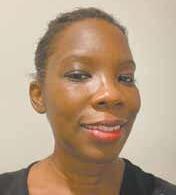
Jody Pollack “Unity Creates Community.”
Pesach, the Chag that brings the family together over a meal and a story that has been told for generations. It is a time for wine, laughter, and learning. The story of Exodus is the ultimate example of Unity creating a community. One large mass of humanity moving in one direction, creating familial communities every step of the way.

Now, while one may question Moses’ physical sense of direction – wasn’t there a shorter route?
– we know that he was following a very special GPS (G-d’s Positioning System) to get them where they needed to be. The time it took was baked into the route. Because time allows for bonding, creating attachments to each other that ultimately gel into a strong coordinated, unified family.
Of course, within every family, there are those you do not want to see at the table. Those that make you uncomfortable with their politics, personal behavior, or relationship reminders. We are taught to accept those we do not agree with, no matter how much internal strife it causes, because in spite of our personal feelings, they may be near and dear to someone else at the table.
The 40 years it took to reach the promised land allowed for the sands of the desert to wear down the rough edges of emotion and pettiness and prepared this new unified community to take on the physical challenges needed to settle the promised land.
In today’s world of increasing antisemitism, it is more important than ever to cast aside our petty differences and gel into a unified community that protects and defends each other and draws strength from those that came before us. Those that made it through the desert did not do as much for themselves as for us. It is our responsibility to not only continue to tell their story but to ensure that we do not squander their suffering and succumb to the evils of the world because we are splintered over attitudes, tones and ignorance.
So eat up, drink up, tell the story, but this time, think a bit deeper and acknowledge those around you and recognize their value in our community.
PASSOVER 62 | MARCH 31, 2023 ATLANTA JEWISH TIMES
Max Miller is a rabbi at Temple Emanu-El.
Jody Pollack is executive director of the Atlanta Kosher BBQ Festival.
Eric M. Robbins
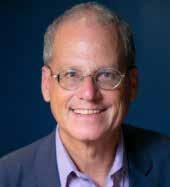
This time of year, when family and friends come together to celebrate, is so important to me. Especially after the last few years, when gathering has been so rare. I feel a sense of the world opening around Passover; plants uncurl their new leaves, people venture outdoors as winter finally passes, and the sunshine stretches the days.
Lately, I have worried that our fields of vision are growing narrower. Even as modern tools like the internet should make it easier than ever to explore new frontiers, it seems that people are calcifying their opinions and splitting into smaller and smaller factions. We seek out things that reinforce our views; we avoid those which make us uncomfortable.
This Passover, as we remember the struggle of our ancestors and consider the plight of oppressed people everywhere, I will be thinking of the sky above the Red Sea. How it must have felt to walk between walls of water, with a strip of sky above, and then to step beyond, to the other side, and feel the sky explode above into vastness.
The world is so much bigger than it sometimes feels. There is so much to see, and learn, and experience. As you gather together with your community around the seder table, I hope you feel your world widening around you. I hope we all can step from our narrow divides into the wider expanse of humanity, and really hear and see each other.
Gayle Rubenstein
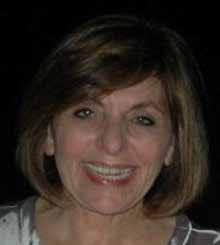
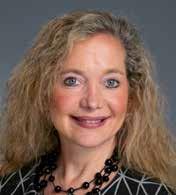
Welcome spring, and the celebration of the Jewish escape from slavery in Egypt. Passover tells us about the relentless quest for human freedom. We have endured persecution for thousands of years, and, still today, we watch as persecution continues in Ukraine and many places around the world. Our grandchildren living in the United States take freedom for granted. We remind them that we were once enslaved and encourage them to have compassion and understanding for others who are persecuted. Having emerged from three years of the COVID pandemic, we have seen the sad and disappointing colors of humanity itself. For many of us, especially young people, it can feel like the world has been turned upside down, with social media and overwhelming changes, to use this time to obtain personal freedom and let go of what personally confines them.
As our family gathers around the Pesach table and enjoys a beautifully prepared meal, we will express gratitude. Dayenu, as we sing after the meal, will inspire us to be grateful for what we have and recognize that everything we have now is enough!

Ray Alyssa Rothman
There is no better example of the unpredictability of life than the Passover holiday, which, of course, commemorates the Israelites’ exodus from Egypt. Our forefather, Joseph, entered Egypt as a slave, and died as the Pharaoh’s viceroy, second only to the king himself. While Joseph’s immediate descendants lived relatively comfortably in Egypt, their good fortune did not extend to later generations, who, in a reversal of fortune, found themselves enslaved.
Then we have Moses, who, although a Jew, grew up with privilege in the royal court. Yet the same Moses cast off that privilege to lead the Jews out of Egypt.
Passover lets us pause our lives and think differently for a moment. It affords me the time and space to connect with my ancestors and the people in my life. It reminds me to not take my life and privilege for granted. It reminds me to be humble because “there but for the grace of G-d go I.”
nect, a premier in-person social network for Atlanta’s Jewish singles.
PASSOVER ATLANTA JEWISH TIMES MARCH 31, 2023 | 63
Eric M. Robbins is the president and CEO of Jewish Federation of Greater Atlanta.
Ray Alyssa Rothman is a commercial real estate veteran and founder of Kibbitz & Kon-
Gayle Rubenstein is the owner of Balloons Over Atlanta and Event Visions.
Shaindle Schmuckler
Passover at 790 Elsmere Place
Mama and Papa believed the popular hype about the streets of America being lined with gold. The Goldeneh Medina as it were. They chose to travel across the ocean with their four teen-aged children, all ready to build a better life for themselves.
Mama and Papa were my mom’s parents, our grandparents.
They found an apartment with enough bedrooms for everyone. They moved into their new home at 790 Elsmere Place in the Bronx, N.Y., ready to start a life as American Jews. They opened a fish market, and their kids went to night school to learn English, while working to help with the budget.
Their four children, Ruthie, Paula, Jack (Zaidle), and Jeannette, found wonderful spouses who brought nine grandchildren to the family (my sisters and I are three of the nine).
Mama and Papa cherished their Jewish heritage and all its traditions. They brought their Jewish way of life and its traditions with them. One of the most delicious and happy traditions was when the family, and often guests, gathered at Mama and Papa’s home for the Pesach seders, all dressed up in our Pesach clothes, ready and alert to find the afikomen.
We never received money as the prize, I can’t even recall what it was that we did receive. It was, after all, a really long time ago. What I do recall vividly is the fish swimming in the bathtub, waiting to have its head chopped off and the rest of him/her prepared for making gefilte fish for the seder. What a strange sight that was.
‘Those were the days my friends, we thought they’d never end.’ Indeed, they never did end, they are still beautiful, meaningful memories.
Chag Sameach.
Maayan Schoen Unity Creates Community

As I approach my college graduation this May and think about my next steps, I’m spending a lot of time considering the sort of community that I eventually want to live in. My dream is to move to Israel, but there are a few things that make me hesitate. One is that I don’t know if I’ll be able to recreate for my children the experience of community that I so valued living here.
Our Jewish community in Atlanta was a unique place to grow up. I know that not everyone had the integrated experience that I did, but I don’t think that there are so many other places where my family could have (almost) seamlessly been part of Jewish institutions with such different hashkafas (religious worldviews) or where I could count people with widely ranging Jewish backgrounds as my close friends. My parents taught me how to appreciate the lessons I learned from teachers and friends at school, shul, and camp while acknowledging the ways that any of them might have differed slightly from our family values and practices. They taught me how to see what we have in common more than what makes us different. To me, this was an attitude of unity — and it created community.
I’m hoping that Israel will present even more opportunities for a rich communal experience. But it sometimes seems that harsher divisions there — e.g., over army service — preclude the kind of unity I experienced here. Even in New York, where enough Jewish institutions exist for everyone to have exactly the flavor of Jewish experience that they want without mixing with anyone else, the Atlanta experience can be a foreign concept.
I can tell my children about how to love and appreciate people who are different from us, but that is not as good as modeling friendship and community-making with people who are different from us. Hopefully, wherever I go, I can bring a little bit of the Atlanta spirit with me.
Thank you for teaching me these values and for being my community!
Maayan Schoen graduated from Torah Day School and Atlanta Jewish Academy and studied in the Migdal Oz Beit Midrash for Women in Israel, and is currently a senior at Yale University.
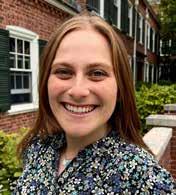
Dr. Terry Segal
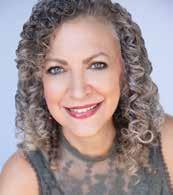
Each year, as Passover approaches, I evaluate my sense of personal freedom. I compare it to my levels of freedom and enslavement from the year before. Both are a result of my own perception of my experiences. Perception is everything. Take 2020, during the lockdowns, for example. Some people felt free. They were free to sleep later without driving time, free to dress comfortably, free from social anxieties and from overscheduled activities. Others felt free from guilt in watching TV or doing puzzles. After mandates and lockdowns were lifted, many felt more restricted by having to conform to new rules at work, language shifts in society, and concerns with increased violence.
As I ask myself, I ask you, what defines “freedom” in life? Do you feel more or less free than you did last Passover? What enslaves you and what action is necessary to feel free, again?
It’s important to notice expansion or restriction in your body, mind, and spirit when considering a course of action. When there is expansiveness, there’s freedom to breathe deeply, dream fully, create flexibility and possibility. Restriction lets us know that it’s time for a change.
May you have a meaningful Passover and an expansive year of freedom.

PASSOVER 64 | MARCH 31, 2023 ATLANTA JEWISH TIMES
Shaindle Schmuckler is a contributing writer to the Atlanta Jewish Times.
Terry Segal is a licensed marriage and family therapist with a Ph.D. in Energy Medicine, author and Judaic artist.
Chana Shapiro The Festival of Transition
It’s interesting that Passover, which I think of as “the Festival of Transition,” lasts an entire week. There are two seders, and then what? How about this: We’re given a concentrated week in which to consider and focus on the possibilities and obligations of freedom. The Midrash claims that a great many Israelites chose to remain in Egypt at the time of the Exodus. How do we understand the reluctance to leave Egypt? Why would it be preferable to remain in a state of predictable servitude rather than venture into the unknown? This is something to think about. Can we relate to that decision?
Passover is a family-centered holiday: Yes, there is a strong synagogue component, but the sine qua non of the festival is the home-centered reading of the Haggadah, in which there is a guided interchange between children and adults and the communal retelling of our transition from hundreds of thousands of Israelites enslaved in Egypt to a united Jewish people at Mt. Sinai. We re-tell the story every year, and it bears repeating.
At Sinai, we got our “marching orders,” the Ten Commandments, and the rest is history, our history. Moses had his hands full with the crowd he led through the wilderness, hundreds of thousands who had a hard time shaking their Egyptian captivity behaviors. Only a younger generation, which had not experienced the Egyptian slavery, was able to envision and embrace freedom.
Thousands of years later, we’re a free People, but are we still, in some ways, slaves?
Every year, we sit together to review, consider, and talk about that critical transition in which we became a People. At the seders, several generations of family and friends join to retell the Exodus story. The Haggadah asks us to consider ourselves as physically experiencing the miraculous Mt. Sinai thunder-and-lightening moment (one Jewish dating organization is named “Saw You at Sinai!”).
The Jewish journey that began at Sinai connects us, in spite of our differences, and reflection on that fact leads us to understand we’re meant to be bound together.
It took 40 years of wandering in the desert until the slave generation perished and a new generation entered Israel together as the free Jewish People. The Haggadah can be the essential jumping-off point that provokes evaluation of how we spend our freedom. Do we connect to our People and the Torah? What causes do we support? Is our identity defined by our job? Do we put our family—our own family and our Jewish People family—first? Are we models of decency and discretion, or do we tend to conform to the crowd? Are we proud Jews?
That transition from slavery to freedom is a transition with which we struggle daily, so we can use the week of Passover as the time of introspection. To what am I enslaved? What would my life be like if I could leave that enslavement? Can I handle a life in which I am not guided by conventions of contemporary society and desire to “fit in”? Am I willing to choose my own path?
I suggest that these are good topics for discussion during the seder meal and introspection during the week of Passover.
My family and I wish all of you a liberating Passover experience!

Chana Shapiro is a contributing writer to the Atlanta Jewish Times.
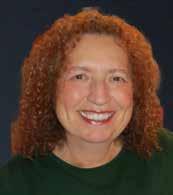
Rabbi Alexandria ShuvalWeiner
One of the beautiful aspects of the Pesach narrative is that this is our Jewish community’s group spiritual experience. An experience that focused on the forging of us from a rag tag group of “strangers in a strange land” into a community unified by a common experience.
Yitzeyat Mitzrayim wasn’t just the story of some of us, it was the story of all of us. I often wonder what the individual conversations might have been like; was the community divided over leaving? What were the exchanges like between the parents and their children? And the conversations between spouses? Yet, Torah isn’t interested in sharing what most certainly would have been a divided community with varied opinions over the when, ifs, and how’s of an Exodus.
What Torah describes is the sacred experience of the Israelite community at a particular moment. A moment when we move, act, and respond in unison-na’aseh v’nishma- “we will do, and we will hear.”
Unity creating community and community responding in unity.
The exodus was, and still remains, the unifying event which birthed us- forged us- into a people, “Am Yisrael.”
Today, while our community may, at times, feel less unified, divided along religious, political, or spiritual lines, still the ritual of Pesach observance melts away those lines and brings us all back to the Oneness and unity of our community. No matter where we live, Atlanta or Tel Aviv, Kenya, Cape Town, Hong Kong, or Buenos Aires, when we gather with family and friends, to eat, laugh, rejoice and “to see ourselves as personally redeemed from Mitzrayim” recalling the Exodus, we are all reunited, one sacred community-Am Yisrael!
A Zissen Pesach to all.
Alexandria Shuval-Weiner is president Atlanta Rabbinical Association and senior rabbi Temple Beth Tikvah.
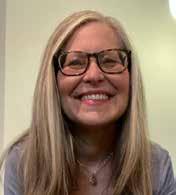
PASSOVER ATLANTA JEWISH TIMES MARCH 31, 2023 | 65
“Unity creates community or does community create unity?”
Alla Umanskiy
I watched the movie “SHTTL”, as part of the Atlanta Jewish Film Festival, on a regular Thursday evening, in a halffilled theater. The crowd was mostly 60+, everyone talking quietly, while waiting for the film to begin.
I was with two friends, all of us Ukrainian Jews, and the fact that we came to see a film set in prewar Ukraine was not lost on us. As we glanced around the theater, one of my friends noticed a young man in the audience who seemed to stand out among the other older movie lovers. My friend pointed him out, “Look at him. He looks like Adrien Brody.” We laughed at the thought of the Oscar winner Adrien Brody coming to see a movie in Sandy Springs.
The movie “SHTTL” portrays the 1941 invasion of the Soviet Union by Nazi Germany through the life of inhabitants of a Yiddish village at the border of Poland. We see a small settlement, orthodox Jewish life, a young man who left the village to go to Kiyv and has come back for the girl he loves. In some ways, we have seen it all before. “Fiddler on the Roof” demonstrates a similar life. In some ways, I’ve never seen anything like it. I sat on the proverbial edge of my seat, knowing how everything would end, and yet not wanting to accept it.
As you might know, the film does not end well. The tragedy of Soviet Jews and Nazism has been told and retold many times. As the movie wrapped, it was announced that there will be a Q&A with the film’s director and its star. The young man we saw in the beginning got up from his seat and walked to the stage. We gasped. He was, in fact, the star of “SHTTL,” not quite Adrien Brody, but every bit as wonderful in his role. He spoke eloquently of shooting the movie, of traveling to Ukraine right before the war, of what it meant to him. We sat in silence.
I was mesmerized by this movie, by its star, by this tragedy, and by the fact that it all took place in the country where I was born. My history so tightly wrapped around the history of the Jews of this (or any other) shtetl. A letter is missing from the movie’s title and that’s intentional. It symbolizes a whole way of life that disappeared.
Alla Umanskiy is a mother, wife, writer, and lover of sweets, living, working and raising a family in the Atlanta area.
Renee Werbin
Passover is our sacred holiday recounting the biblical story of the Israelites’ enslavement in Egypt and liberation, after 210 years of slavery, into freedom. The Torah teaches us, with great emphasis, that the Exodus took place in the springtime on the 15th day of Nissan in the year 2448 when the weather was ideal for the journey. One of our most revered traditions is the retelling of this ancient and inspirational story at our own Seders where we unite to recount and retell this inspirational story of G-d’s redeeming us from Egyptian persecution and slavery.
The timeless story of Passover, with its narrative of deliverance from bondage to freedom is an educational masterpiece. It teaches us the importance of faith and hope and inspires us to believe in a future we cannot always foresee or even contemplate. The Haggadah’s ancient and enriching script is interlaced with hope for a better future. This is a lesson we can apply today when antisemitism is on the rise, raising fear and anguish in Jews around the world.
“B’chol dor v’dor omdim aleinu l’chaloteinu.” From generation to generation, tyrants have risen to annihilate us” but we, as a people, have never lost faith. The rise of antisemitism in Europe and around the world is frightening. As we retell the story of Passover, we remember that antisemitism is an evil we have endured throughout the ages. As Jews, we must recognize and fight discrimination together, united as one against this constant threat to our heritage, our humanity and our existence.
As we usher in this season of renewal, may your Passover be enriching, elevating and meaningful. May you celebrate a memorable, joyful, and magical Seder with your families and friends. May this season of renewal sprout a spark of hope, vigor, and optimism in a positive future where our children and grandchildren will rejoice in a world that is united in freedom, liberty and peace. May a light shine brightly upon those in despair.
I can hear the echoes of our parents when they utter their time-honored tradition of wishing us a Zissen Pesach. May yours be sweet and filled with blessings. Chag Sameach!

Renee Werbin is publisher and co-founder of Travelgirl Magazine and president of SRI Travel.
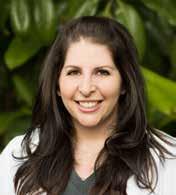
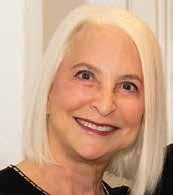
Melissa Wikoff Au.D.,
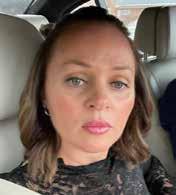
As my favorite holiday approaches, I am filled with excitement and gratitude for the arrival of spring and the opportunity to celebrate this special holiday with our community. As we gather around the Seder table, I am grateful for the opportunity to share this special time with loved ones and to reflect on the values of freedom, hope, and resilience that Passover represents.
I love watching my kids hunt for the Afikomen and reading from the treasured Haggadah my daughter made in Lisa Furie’s class at The Epstein School preschool. Even though this year marks more lifetime Kosher for Passover birthday cakes than regular birthday cakes, I am hopeful for the future and look forward to continuing to build a strong and united community together. Chag Pesach Sameach!
PASSOVER 66 | MARCH 31, 2023 ATLANTA JEWISH TIMES
Melissa Wikoff, Au.D. is the Doctor of Audiology at Peachtree Hearing LLC

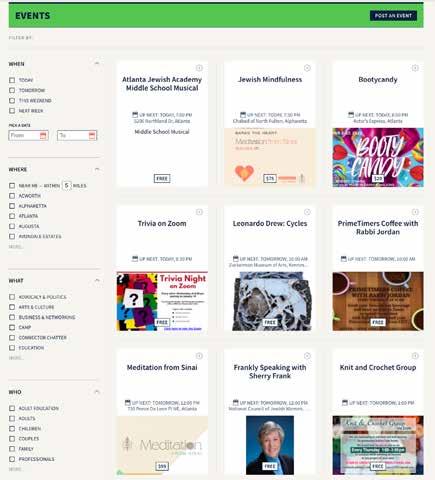
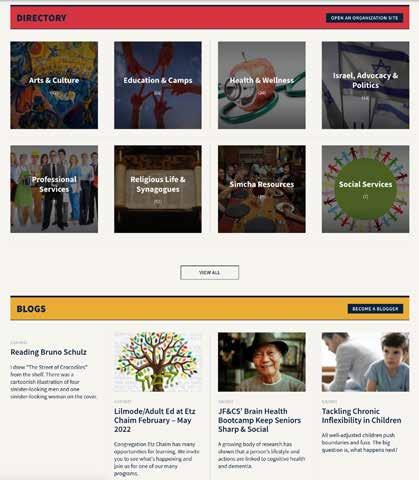
ATLANTA JEWISH TIMES MARCH 31, 2023 | 67 AN INITIATIVE OF ATLANTA JEWISH TIMES DIRECTORY BLOGS EVENTS PODCASTS Answers the What, Where, and When... Today, Next Week or Next Year. Connecting you to organizations, connecting organizations to you. Register Today: www.atlantajewishconnector.com Atlanta Jewish Connector For Help, Call 404-883-2130 or email info@atlantajewishconnector.com
Rabbi Jeffrey A. Wohlberg
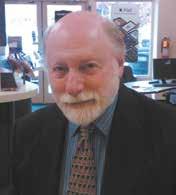
Each year, the celebration of Passover takes on a new meaning, not because Passover changes but because we do. Many things change: The number of people at our seder grows or it shrinks, the ages of those who attend is different from those who did in years past, the level of knowledge and sophistication of many around the table is different, our own preparation increases, we may use a different Haggadah or suddenly find that a phrase leads us to rethinking something which connects to current events or a child asks a question which suddenly stumps us. A personal experience gives an element of the ancient celebration new meaning. A memory reconnects us in unexpected ways. Or we simply enjoy being together again as a family, with friends, after months of physical disconnect.
Suddenly we have questions that need to be addressed that we thought had been answered long ago: Why is Moses’ name not in the Haggadah even though he plays such a central role in our history? Why are numbers such as 3, 4, 10, 12, 40 so significant in the celebration and, in fact, in the Torah? What might our history have been like had women not played so significant a role, especially at this critical juncture? Why is food so important to us in this celebration as well as in many others? Is it true that in every generation there are those who rise up to destroy our people and why is that? What has been the key to our survival as a people and will it sustain us in the future? How different are we from our ancestors in terms of knowledge, commitment, and connection to the Jewish People?
Pesach requires a lot of preparation as well as a lot of critical thinking about the past, the future and our connection to both. The 4 questions are a start, but they are far from all that needs to be discussed. They help us begin but they must not be the end of our discussion. True celebration goes far beyond what we eat. It must encompass what we think and then what we do.
May our sedarim guide us by giving us the opportunity to share, reflect on and enjoy our past as a people and our future as Jews.
Hag Sameach.
Rabbi Mark Zimmerman
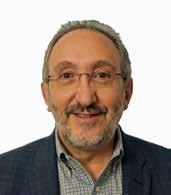
On Passover, we open our doors during the seder and sing kol dichfin yetei v’yechul, kol ditzrich yetei v’yifsach, anyone who is hungry, let them come in and eat; and anyone who needs, let them come in and celebrate Passover with us. We recite this “invitation” aloud as a matter of form and ritual, not really expecting anyone outside to hear us and pop in for seder. Maybe that’s what used to really happen in years gone by. Today, however, I believe this passage is really about creating an awareness of how we, as a community, are all connected to one another, and how the concerns of those whom we sometimes ignore should really be the concerns of all of us.
When I first became a rabbi, the focus on building a community started to gradually give way to the growing emphasis on the individual. Organizations like B’nai Brith, and lodges like the Masons, began to erode. As this phenomenon became more and more prevalent in our society, people started writing about it in books like “Bowling Alone” by Robert Putnam, or observations of how our society has moved from “cakes” to “cupcakes.” Cake, you share with a community. Cupcakes, on the other hand, are all about the individual.
Passover reminds us that we are really supposed to be am echad, one people who feel intrinsically linked together. As the Talmud teaches: Kol Yisrael Arevim Zeh Bazeh (Shevuot 39a); All of Israel are responsible one for another.
Occasionally, we lose sight of that important value of what it means to be one people and one community. We love to sing hiney mah tov u’mah na’im shevet achim gam yachad; how good and delightful it is when we come together as brothers and sisters. But do we mean it? Our synagogues are supposed to feel that way, like a second home; a place where we don’t feel like a stranger in a strange land. When we come together as a community, we should make everyone feel that they are an integral part of something more, something greater than themselves. Passover is a time where we try to bring that vision of Jewish unity into reality.
Thankfully, people are now emerging from the pandemic and coming back to engage with community in greater numbers than they have in years. Our shuls are filled once again for Shabbat services and kiddushim, and it is a beautiful sight to see. Song fills our sanctuary and fills our souls once again. But the challenge I would leave you all with is to contemplate on Passover how we can live up to that holy vision of a community that delights in being together, and how, ultimately, we are all responsible one for another.
As we approach Passover, let us continue to be aware of everyone in our midst, and set a wonderful example of welcoming for everyone around us to follow. Hag Sameyach!

68 | MARCH 31, 2023 ATLANTA JEWISH TIMES PASSOVER
Jeffrey A. Wohlberg is the retired Senior Rabbi of Adas Israel Congregation in Washington, D.C., and a past president of The Rabbinical Assembly.
Rabbi Mark Zimmerman is the senior rabbi at Congregation Beth Shalom, a Conservative, egalitarian and inclusive synagogue in Dunwoody, Ga.
Discover Your Dream Lifestyle
Peachtree Hills Place has 1, 2, and 3 bedroom homes over 2800 sf for exclusive luxury in a boutique Life Plan Community



Among the leafy, tree-lined streets of the Peachtree Hills neighborhood established in 1912, the ultimate lifestyle for active adults is unfolding at Peachtree Hills Place. Members enjoy a dream maintenance-free lifestyle that frees their time to indulge in every luxurious amenity.
• Three dining venues


• Two regulation size Croquet lawns
• Indoor Pool
• Wellness Center with onsite
Geriatricians
• State-of-the-art fitness center
• Car Service
• The Terraces: Assisted Living, Memory Care, Rehabilitation, and Skilled Nursing
Plan to visit soon to tour the few remaining feature homes where high-end finishes, thoughtful details, and large, private outdoor spaces create the ultimate in comfort and luxury. Discover an unmatched experience for writing the best chapters of your life.
Call for your private tour today.
PeachtreeHillsPlace.com | 404.467.9164 | Charlotte Margolin 229 Peachtree Hills Avenue NE, Atlanta, GA 30305 Active Adult | Assisted Living | Memory Care Licensed Brokerage Firm #8915 | 404-941-1320
40 UNDER 40 40 UNDER 40
Our Award Winning Leaders Stand-Out
Rabbi Daniel Dorsch
Several generations before the Exodus, the Jewish people were given the opportunity to go our separate ways in Egypt. Joseph was living the high life as a leader in the diaspora. To test his brothers, living in Israel, he falsely accused his younger brother, Benjamin, of stealing his goblet as a test of their love.
In the end, we know the brothers passed. But, as we read the story, we wonder: what would have happened had they failed? Joseph would no doubt have continued his life in the diaspora with Benjamin, infinitely poorer for lack of family. Joseph’s brothers would have moved on, too, and not survived the hard times on their own.
Thankfully, we don’t have to wonder very long. In his big moment, Judah stands up to Joseph and reminds him: Nafsho Keshuro BeNafsho. The souls of the Children of Israel are all bound together. What G-d has brought together cannot be taken apart.

Today, we stand at a crossroads. Can the Jews of the diaspora and the people of the state of Israel continue to be one people? Or is it time for our own moment of “National divorce?”
Celebrate them during our next JBC Luncheon on May 11, 2023 at 11:30 a.m. to 1 p.m.
Tickets are $18 Per Person and Includes a Kosher Lunch. www.atlantajewishtimes.com/jewish-breakfast-club
Cary Blumenfeld
This is one of those times where the importance of being together is more important than ever. Throughout history, we, as Jews have persevered. This only happened because we came together as one group. Again, there are so many different forces trying to pull us apart, society, economy, religion, politics, etc. When we unify as one, we are unstoppable!
Cary Blumenfeld is managing partner and associate broker at Method Real Estate Advisors.
The story of Judah and Joseph reminds us that this question presents us with a false premise. The Unity of the Jewish people is not a topic for discussion, but a given decided many eons ago. Nafsho Keshuro BeNafsho. Our souls are indeed bound up together. Instead, the real question is: how, collectively, do we get ourselves out of this current mess?
We survived over 400 years in slavery together. If people of good of will put our heads together, we will survive this current moment of crisis too.
Daniel Dorsch is the rabbi of Congregation Etz Chaim.
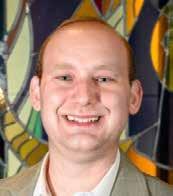
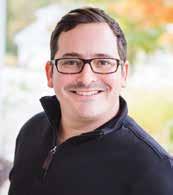
Rebecca Good
When exploring the themes of Passover, the concept of numerical values becomes very evident. We speak about 4 cups of wine, 4 questions, the 4 children, one only kid (chad gadya), and we even ask, “Who knows one?” This is a feature of the Passover Seder that stands out as special to me year after year. As we know, the repetition of a theme in Judaism is never an accident. When we ask, “Who knows one?”, the answer is “I know one; One is our G-d in the heaven and earth.” This oneness is what connects us. Consider this, the Hebrew word for one is echad and the Hebrew word for unity is achdut. Is it an accident that both the words share the same Hebrew root? No, when are unified we get closer to the One.
Rebecca Good is the assistant director of Education at The Temple’s Breman Education Center.
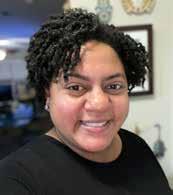
70 | MARCH 31, 2023 ATLANTA JEWISH TIMES PASSOVER
Members of the 40 Under 40 winners share their thoughts, inspiration, advise and encouragement as you prepare for the holiday.
Craig Habif

The story of Passover itself is a testament to the power of unity. The Jewish people were able to escape from slavery in Egypt only because they banded together and worked towards a common goal. It was through their shared experiences and unwavering determination that they were able to overcome the challenges they faced and achieve their freedom.
Today, we continue to see the power of unity in action. In the face of rising bigotry towards Jews, threats to freedom abroad, and a global pandemic, communities have come together to support each other and overcome the challenges we have faced. We have seen individuals and organizations work tirelessly to provide support and assistance to those in need, and we have witnessed the incredible impact that can be made when we come together as a community.
As we celebrate Passover 2023, let us remember that we are stronger together than we are alone. Let us continue to build and strengthen our communities and let us work together to create a brighter future for ourselves and for future generations. Let us reflect on the power of unity and the many blessings we have received, and say with gratitude and conviction, Dayenu – it would have been enough.
Craig Habif is employed with Habif Properties.

Ben Halpern
Kayla Heering
Many families across the country have added “Miriam’s Song,” by Debbie Friedman, to their seders, rejoicing with Miriam in the Israelites’ freedom from slavery. We celebrate Miriam for her leadership in caring for the people of Israel throughout the Passover story by watching over her brother at the Nile and teaching the Israelites how to praise G-d at the Red Sea. Though she hardly appears in the Torah, when she dies, the well that had been providing water and sustenance to the Israelites in the wilderness dries up. According to the Talmud, the well appeared before the Israelites because of Miriam’s merit in the tale of the exodus from Egypt (BT Ta’anit 9a). Miriam’s role as caregiver and sustainer for the people of Israel in one of their most challenging and triumphant moments was crucial, even though her role was quieter and more subtle than that of her brothers, Moses and Aaron.
As we recount our ancestors’ enslavement and subsequent freedom, let us also reflect on the significance of our leading female character, a woman celebrated and remembered for leading on the sidelines through trying times. When we hope for this to be the last Passover for ourselves, our friends, and our family members experiencing loss and infertility, let us also add “Miriam Han’viah” to our seders when we sing, “Eliyahu Hanavi.” May Miriam be present with us as well, leading us to help and healing.
From the Holy Land of Israel as our Honeymoon Israel trip concludes here, I reflect on the strong connections we’ve built back home with 19 other wonderful young couples, many of which are interfaith, mixed and/or transforming into a shared “Jewish” life in unique personal and familial ways that manifests with meaning for each individual and their partner.
While we only had 10-days together, it was evident to my fiancé, Carlin, and me since we arrived and welcomed in Shabbat in Tel Aviv to our conversations with a diverse assortment of all types of people living in Israel to weaving the trip altogether in Jerusalem with our shared history as a Jewish people while embracing our unique inherent differences, that unity doesn’t only create community, but it’s a dynamic and ever-evolving community we look forward to planting roots.
Everyone’s vulnerability and open-mindedness on both an individual and collective level allowed for an authentic expression of love, acceptance, and growth. Growing up very involved in the Atlanta Jewish Community, one realization I found enlightening was the uncertainty of how to initiate an engagement or involvement in Jewish community when the desire for exploration exists, especially when family is considered.
The reality is Jewish involvement in Atlanta and beyond is strong, dynamic, and has something beautiful to offer for everyone. Whether it be religious, cultural or social, I’ve found Greater Atlanta to be a source of Jewish life across all sects, belief systems, and interests. I’ve been very fortunate to experience an array of diverse Jewish life from Greenfield Hebrew Academy (GHA - Now AHA) to being touched by the Ort Lipson Israeli-American Exchange Program to SOAR, Friendship Circle, Birthright, and Temple Emanu-El in which I’m a proud member of the Board of Trustees and involved in their Next D’Or 20s and 30s programming. Both within and outside the community, I’m passionate about continued learning, acceptance, and advocation for cultural pride and exchange.
Halpern is executive vice president of Farmers & Fishermen Purveyors and member of the Board of Trustees of Temple Emanu-El.
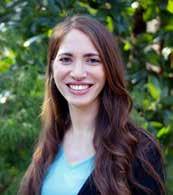
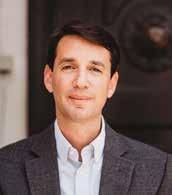
ATLANTA JEWISH TIMES MARCH 31, 2023 | 71 PASSOVER
Ben
Kayla Heering is the National Program Director for the Jewish Fertility Foundation.
Rabbi David Helfand
As the youngest of three brothers, we always enjoyed brotherly competition. Among the favorite memories was gathering around the Passover seder and sharing the newest insight to the Haggadah that we had recently learned at school. This was especially true when we got to the section of our Haggadah that speaks of the four children. Each year we always found a way to offer new insight and understanding to those who were and perhaps were not included in this sacred ritual.
We read at the Seder that the Torah relates to four types of children: wise, wicked, simple and one who does not know how to ask. While the Haggadah tries to link each child to a different verse in the Torah and the role a parent might play in telling the story to the next generation, I believe this section is far more colorful and complex. It’s easy to suggest that this section is about engaging different types of people or personalities in the world around us. Perhaps, it is a metaphor for at least four different types of personalities that exist within each and every one of us. Think about the moments in your life when you embodied each of the personalities of the children in the seder.
The Ba’al Shem Tov, the founder of the Hasidic movement, explains that the Jewish people are like a living Torah scroll, and every individual Jew is a letter within it. If a single letter is damaged or missing, the Torah is invalid. So too, in Judaism, each individual is considered a crucial part of the people, without whom the entire religion would suffer. Each child that sits at the Passover seder table and each person that associates with this community matters and is essential.
Perhaps that’s the point, the lesson of the Four Children. Every type of child left Egypt, AND, in reciting the story of the Exodus from Egypt, we realize that we as individuals have all four of these children within ourselves. We are each different children at different points in our lives, even as adults. More importantly, the Four Children is merely the beginning. There are dozens if not hundreds of types of children in our communities, like letters in the Torah, that we need to engage, include, and accept for who they are. To truly be a sacred community is not only about teaching every type of child, rather creating a sense of awareness that we can learn from them, too: getting to know their story, connecting them with people of similar interests, being present with them during the moments of joy, and the moments of challenge and sorrow. That is what makes the Passover seder so powerful- we open our homes, our tables and our hearts to everyone and anyone, meeting them where they are, and engaging them through our rich tradition in a way that feels authentic and embracing.
David Helfand is the Engagement Rabbi at Shearith Israel, a master community builder, a passionate experiential educator, and gifted storyteller.
Rabbi Ari Kaiman
Unity is exceedingly rare. We even joke amongst ourselves about this saying, “Two Jews, three opinions.” Our tradition is one that preserves minority opinions on legal matters and contradictory commentaries about narratives. Consider, for example, how we moved from Egypt through the sea of reeds. The most common understanding is that we all moved through one path together. But there are Midrashim that question this logic since the line to move through would have been incredibly long! Just think about when a Kiddush lunch is set up with only one line! One Midrash states that 12 pathways opened up, one for each tribe. My point is not to take a side on this debate, but to note, with interest, that we are a community precisely because we have multiple perspectives to color our understanding of our collective story. We are not unified about what the story means, but we are a community because we all tell this story.
“Az Yashir Moshe U’vnei Yisrael…Ashira La-hashem Ki Ga’oh Ga’ah - Thus sang Moses and the Children of Israel, I will sing to the Lord, for G-d has triumphed gloriously.” (Ex. 15:1) One of those rare moments of unity was that new moment of collective freedom. All of the people sang as one voice, “I will sing to the Lord.” If you’ve ever sung a single song together with thousands of people in one voice, and lost yourself among the collective, it’s a powerful and potentially transformative moment of community. It’s also ephemeral.
Immediately after the communal Song of the Sea, Miriam and all of the women take timbrels and dance, and Miriam chanted responsively with them, “Shiru La-hashem Ki Ga’oh Ga’ah - Sing to the Lord, for G-d has triumphed gloriously.” It’s subtle to notice, but Miriam doesn’t ask for one voice. I like to think that she’s asking for call and response, or perhaps, even the sound of harmony. This is also a powerful and transformative model of community. Harmony is also difficult to achieve, and ephemeral. The very next narrative is the people of Israel complaining and arguing with Moses.

As we prepare to sit around Seder tables with one another, I hope you all have the blessing of diverse voices to ask questions, argue, and sing in whatever harmony you can muster. I pray that everyone has a place to go celebrate, and be your unique voice in the community of the thousands of ways we tell this story.
Rabbi Kaiman is the senior rabbi at Congregation Shearith Israel.
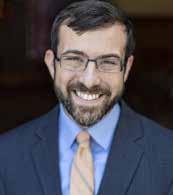
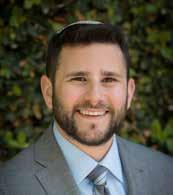
72 | MARCH 31, 2023 ATLANTA JEWISH TIMES PASSOVER
I am not sure that “Unity Creates Community.”
PASSOVER
Jared Kaye
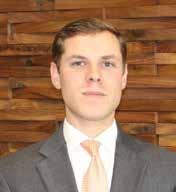
Why does Eliyahu Hanavi visit us during our Sedar? Why not during a holier time like Rosh Hashanah or Yom Kippur? Passover is the most celebrated Jewish holiday around the world. Regardless of what Jews do during the year, Eliyahu Hanavi still comes to bring out the core of Judaism – family and community. Embrace the blessing of Jewish togetherness and community and never give up on your fellow Jew, especially now as we continue to celebrate this year of Hakel. Wishing everyone a happy, Kosher and inspiring Pesach!
Jared is a proud husband, father, and aspires to be a beinoni.
Rebecca Leslie
Jessica Katz
Passover is a time to gather together, reflect, and celebrate. We celebrate our freedom and honor those who made that possible. One of those people is the heroin Yocheved. With Yocheved as my Hebrew name, I always take pride in reciting the Passover story at the Seder table. Additionally, I now have a young daughter named Miriam (coincidentally!), which has made me reflect on the leadership role these two women had in the Passover story. Yocheved made a brave, but tough, decision to save her child and Miriam’s assertiveness and loyalty to her family and people helped ensure the ending of getting through the parted Sea and escaping to freedom. Change doesn’t happen because of just one personMoses did not do this on his own. A community doesn’t thrive because of one citizen or member. A “united” community embraces and celebrates all. We all have a part in our community’s story. As a woman, I hope my voice and my role continue to grow and we continue to lift up all voices.
Jessica Katz is Director of Development at JF&CS and one of this year’s 40 Under 40 recipients.
Unity can be established when people in a community come together in their values, goals, purpose, and/or mission. With unity, people in a community are better able to make progress towards an objective. There is also power in numbers when it comes to making an impact on the world. When we come together as a community around certain issues, we have the ability to make a bigger impact than if we were to try to do something alone. As the saying goes, “it takes a village.”
The idea that unity creates community specifically applies to my work as a psychologist. In my work, many times I have clients that I will refer to physicians, psychiatrists, family therapists, couples’ therapists, physical therapists, or dietitians. In working with eating disorder clients, in particular, this community is crucial. A dietitian can support meal plans, a physician can monitor labs, I can provide talk therapy, and my team members can provide family therapy when appropriate.
It is through working together that we are able to unite to provide the best care for our clients. When we are all aligned in helping improve our clients’ physical and mental health, our clients can see the biggest change. I would not be able to do what I do without the amazing community of providers that I have in Atlanta.
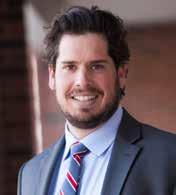
Rebecca Leslie is a licensed psychologist and the owner of Best Within You Therapy & Wellness, a practice of psychologists and dietitians.
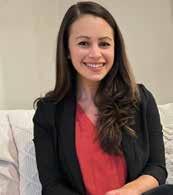
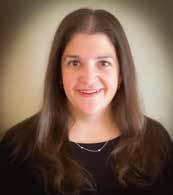
Mike Wilensky
Passover commemorates our liberation from slavery in Egypt and the forces of evil and destruction. The meaning of Passover and performing the Seder touches on values and lessons that are relevant today, regardless of one’s faith. I believe that at its core, Passover is a festival of freedom and justice.
This message is as important today as it has ever been. As we come out of the COVID epidemic and with the rise of antisemitism, we must work harder than ever to unify and stand up for the Jewish people as well as justice for all.
My hope is that as we move forward in 2023 (or 5783), may we work harder to come together, no matter political views, and get back to learning about one another. It is time we remember that, even though we all are different, we all have adversity in our lives. We all suffer, but at the same time we all have great freedom and responsibility. We all are trying to get to a better place for us and our families.
Let’s get back to supporting each other, working with each other, and loving each other. I wish you all a chag sameach and a joyous Passover!

ATLANTA JEWISH TIMES MARCH 31, 2023 | 73
Mike Wilensky is Former State Representative of House District 79, Partner of the Law Firm of Michael S. Wilensky, LLC
Atlanta Jewish Times Staff Wishes Our Community Happy Passover From Our AJT Family to Yours
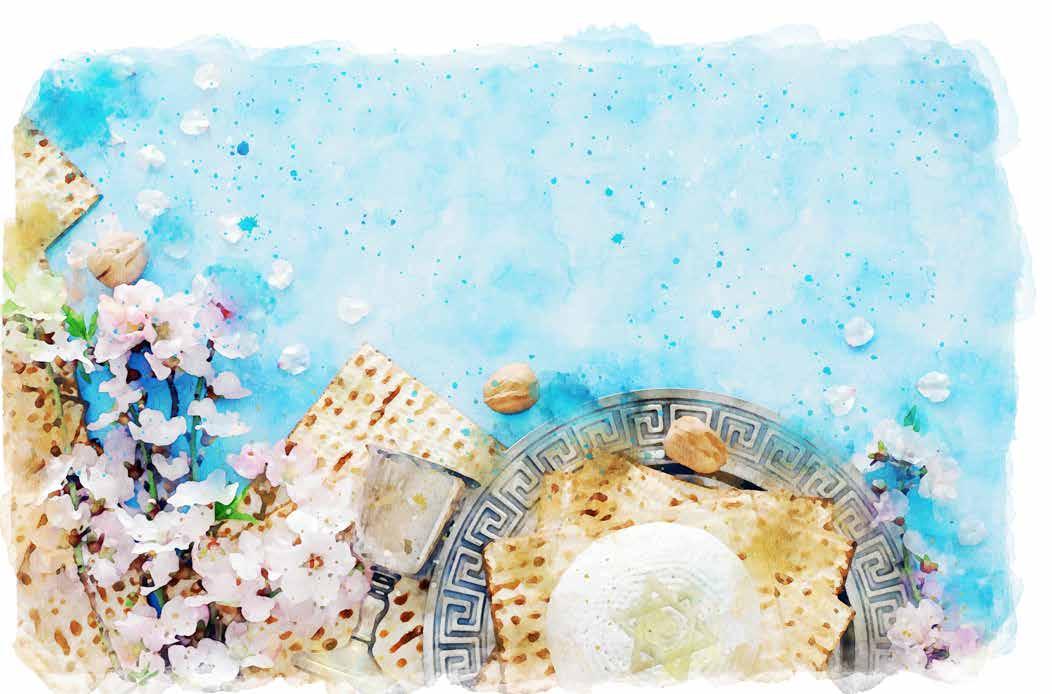
Kaylene Ladinsky Unity Creates Community
In June of this year I will have completed my first five years as the editor of the Atlanta Jewish Times. When I began my adventure with the AJT as business manager in 2011, I felt that our newspaper was missing something that would engage more people and make them feel more part of our community.
So, one of my most important goals over the this first five years has been to create a publication that serves most of Jewish Atlanta. The first step was asking many of our community leaders to join us for a round table to discuss what they felt would engage them and those they know. As a matter of fact, it is time for another round table meeting to kick-off the next five years.
While studying all I learned for the round table, I quickly understood that I would need to include more diverse topics and feature sections in the paper. The number one thing that everyone thought the paper needed less of was long stories that went on for three and four pages.
I find it so interesting that in my efforts to bring more unity in our community, by thousands of readers to experience that connection by keeping up with our Jewish community’s news and events, I had to be more diverse in our content. That meant that I had to publish shorter stories, less of the regular opinion columns, include news, politics, opinions, feature stories, who’s who in Atlanta, a vibrant community calendar, dining, sports, Israel and community briefs, all in each newspaper we published.
So far it has been working, Atlanta Jewish Times won the Best Newspaper from the American Jewish Press Association and I hope by most of our readers.
The point of this is that our unity is that we all care about Jewish Atlanta and want to know what’s happening in the community. Those that read the paper and have more knowledge will naturally feel more connected, and that is our "unity."
As you reflect on community, realize that it is not our differences that tear us apart. We already know that everyone has their own interests – rather it’s being open to diversity and focusing on the things that unify us is what brings us together.
So, I would ask all our readers and leaders to let go of the opinions and judgments that we tend to have that build walls between each other and focus on those areas that unite us.
Kaylene Ladinsky is the editor and managing publisher of the Atlanta Jewish Times.
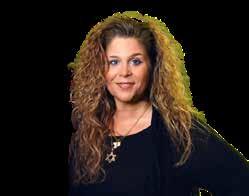
com·mu·ni·ty - noun
a group of people living in the same place or having a particular characteristic in common.
1. a feeling of fellowship with others, as a result of sharing common attitudes, interests, and goals.
74 | MARCH 31, 2023 ATLANTA JEWISH TIMES PASSOVER
Michal Bonell
When I moved to Georgia from Massachusetts with my young family in 2006, I did not know anyone. I moved from a community where I couldn’t go out to dinner or into a grocery store without bumping into at least three people I knew to a place where I did not know a soul.
One of the most important aspects of moving to the metro Atlanta area was the fact that there was a thriving Jewish community. My belief, like many, was and is, if there is a Jewish community around me, I will be OK.

My first job was as a pre-school teacher at Temple Kehillat Chaim. From there, I worked as an assistant for Rabbi Fred Greene at Temple Beth Tikvah. I taught Hebrew at various synagogues throughout the years until I landed in the arms of the Atlanta Jewish Times in 2012.
My community in Atlanta has flourished through the years and I am thankful for my Jewish Community for holding my hand along the way. Although I do not belong to a synagogue, my daily interaction with my colleagues, clients, and friends envelops me and gives me a sense of a community I belong to and deeply cherish.
Michal Bonell is the Senior Account Manager & Team Supervisor for the Atlanta Jewish Times.
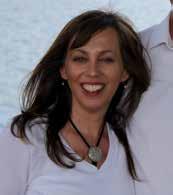
Lilli Jennison You Can’t Spell Community without Unity
Unity means being together. Community is made up of people uniting. Right now, we need to unite as a community more than ever.
The Holocaust “ended” May 8, 1945. But did it ever really end? There are acts of antisemitism every week now in our own backyards. Most recently, there were swastikas and “Hail Hitler” drawn in pollen on a slide by the pool in my neighborhood. I was told about it by my neighbor, and she also told the president of the swim and tennis club. He had big promises to do something about it. He said he would let the neighborhood know via email that this is not OK and the board will be doing something about it. Or so he said...instead, a vague email went out only to members of swim and tennis, which is a small fraction of the neighborhood. My neighbors who aren’t members of the pool didn’t know a thing about it.
Jan Jaben-Elilon wrote about what happened in the news section of this issue. This must be shared with the community so we can unite and stand up and scream “never again” from the rooftops.
My grandpa, Bernie, was a Holocaust survivor. Most of his family was murdered during the war. Chana Kurtz was my grandpa’s sister. She and her husband had three small children. All we have left to remember of them is a photograph that somehow survived the war with Chana’s husband.
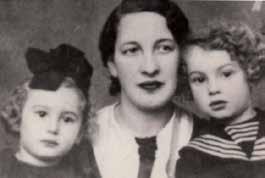
As a family, we hope and pray every day that those children somehow escaped and are still alive to this day. Bernie and Chana also had a brother, Benneck, who survived Auschwitz and a sister, Fajga, who we sadly don’t know as much about. My grandpa had PTSD after the war. Unfortunately, he didn’t talk much about what he went through. On my grandpa’s side, we have only one distant cousin that we know of.
We must honor those we lost and those who risked their lives to survive. We must honor them by not backing down to antisemitism. Not letting people get away with hatred. One thing my grandpa was always uncomfortable with was people wearing kippot or star of David. He went through so much just because he was Jewish that he wondered why people wanted to advertise it. This is something I disagree with because I show my Jewishness as much as I can. I am proud to be Jewish. People try to scare us by spreading hate, but we need to turn that around and spread love and be proud of who we are.
We must unite as a community to come together and stand up against hate.
Lilli Jennison is the Creative Director for the Atlanta Jewish Times.
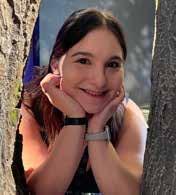
ATLANTA JEWISH TIMES MARCH 31, 2023 | 75 PASSOVER
Jodi Danis Sharing Community
Early in my career, I worked as a high school English teacher and writing tutor, yet I never focused on writing for my own enjoyment. It wasn’t until my mid-40s, when my kids were somewhat self-sufficient, that I finally found the time (and energy) to explore creative writing. I dabbled in some local writing groups and, eventually, found my way to a few online sites where I met others who helped ignite my creativity and passion for writing fiction. For a time, I became quite prolific, and that community sustained me in ways I could never have imagined. The friendships created there felt very real and very meaningful, despite being virtual ones. Our mutual interests and support of one another are what connected us. Such is the beauty of a shared community.
In recent years, I have come to appreciate the Facebook Groups feature more than the regular posts on Facebook. Many readers here are part of the Jewish Moms of Atlanta (JMOA) Facebook group and know it is a fabulous way to connect and share information with others in that particular community. There are online groups out there for just about anything; for example, this time of year, I follow the Kosher Costco group, the Passover Recipe Exchange group, and the MOT (Members of the Tribe) Parenting group. It feels good to know my “tribe” is out there in many different forms, in many different places, and I can be part of all those communities.
Throughout our lives, we are constantly forming and joining communities to match our interests, schools, kids, stage of life, etc. Whether it’s a Havurah, book club, fraternity, PTO, gardening group, HOA, nonprofit board, or softball league, connecting with others and sharing what unites us is at the very heart of what it means to be a community. All of which brings me to my own tribe and Passover community. We are so fortunate to have longtime friends with whom we have shared the Jewish holidays since our children were quite young. None of us have parents or siblings in the Atlanta area, and that common factor is what first united us many years ago. We are all empty nesters now, but our holiday traditions still remain in place. The number of plates at the Seder table may have dwindled, (until we add grandchildren someday) yet we still share deep bonds of friendship and a history that is the backbone of our own community.
As you celebrate the holiday this year with your loved ones and friends, may you also be blessed with finding meaningful connections in your own communities. Happy Passover!
Jodi Danis is the business manager for Atlanta Jewish Times.
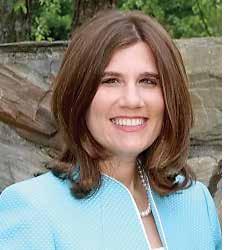
Sasha Heller 2023 Passover Message from Sasha Heller
For last year’s Passover community messages, I wrote about how I was all set to attend my first Passover seder in Atlanta in more than two decades. I was eager to reconnect with my Jewish roots, having lapsed in observance of my faith as I finished college and set out on a career path.
This year, I will once again be celebrating Passover with my father, his girlfriend and her extended family, including four sisters, and dozens of children and grandchildren.
Their family is always so warm, so accepting and I am sure this year will be no different. Last year, they really went out of their way to make me feel invited and comfortable. The most daunting task with this group is simply learning everyone’s names. I’m getting there…still got some work to do on that front, though.
As we approach Passover this year, it is important to note that we are stronger as a community than we ever were before, especially in the face of rising antisemitism across the country. Be strong! Be vigilant! Be Jewish!
I wish everyone a safe and happy Passover and I’ll see you at the seder next year in Jerusalem.
Fran M. Putney
Anyone who attended the Atlanta Jewish Life Festival earlier this month would have seen in real time, so to speak, a sample of the breadth and diversity of Atlanta’s Jewish community. The atmosphere was fun, but there were opportunities to learn about all the entities, from synagogues and camps to service organizations and businesses, that specialize in working with Jewish interests. From kosher barbecue to nonprofits that address Jewish-related health issues. We don’t all think alike or have similar Jewish lifestyles, but that is part of the beauty of this fabric that is our greater Atlanta Jewish community, which now is no longer concentrated in one or two geographic areas. I’m sure our Federation has the latest demographics, but, anec- dotaly, we know that Jews are building community all around the state – from North Georgia to Savannah.
No matter where we are on the Jewish spectrum, our Judaism connects us. With respect and appreciation for our diversity, it is my hope this Passover that we can always stay focused on our common ground. We need each other now as much as ever.

Wishing everyone a warm, delicious, and meaningful Passover!
Fran Putney is a staff writer and proofreader for the Atlanta Jewish Times
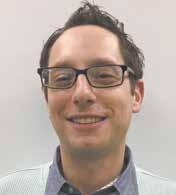
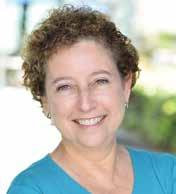
76 | MARCH 31, 2023 ATLANTA JEWISH TIMES
PASSOVER
Sasha Heller is the Web Editor & Copy Editor for the Atlanta Jewish Times.
David Ostrowsky
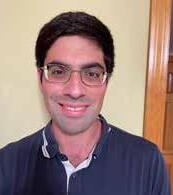
Greetings, As sportswriter for the Atlanta Jewish Times, it probably comes as little surprise to everyone that I so often associate Passover with a new baseball season. Give or take a week or two, Passover Seders nearly always coincide with Opening Day. On a more abstract level, as Passover is considered a time for new beginnings, it seems fitting to draw a parallel to a new baseball season.
And I believe this year’s season takes on special meaning for the Jewish community.
In light of Team Israel’s recent showing in the World Baseball Classic, it’s worth noting that in the history of Major League Baseball, there has likely never been such a strong Jewish presence on the diamond. Nearly half of MLB teams have at least one Jewish player on their active roster (the Braves could potentially have three Jewish players on theirs), while front offices throughout the league include members of the Jewish community. Furthermore, as Team Israel demonstrated in last month’s World Baseball Classic, there are quite a few young Jewish prospects who will surely be making an impact in the majors very soon.
Personally, I feel extremely privileged to be able to chronicle such individuals’ feats over the following months and, hopefully, enlighten our readership about the many notable contributions on behalf of Jewish ballplayers. It is such an honor and delight to be able to share such stories with readers of the Atlanta Jewish Times, particularly given this seminal moment in the history of Jewish professional baseball.
I personally would like to wish each and every one of you a most joyful and healthy Passover with your friends and family and only the best as you enjoy the warmer months ahead.
Diana Cole
I am originally from Northern New Jersey, where being Jewish is common. Having Seders, Shabbat Dinners, Break the Fast, and Menorahs, are all common.
My husband, son, and I moved outside of Charleston, S.C., and my new neighbor couldn’t understand why we didn’t have a Christmas tree. Even though I tried to explain and explain.
My family (now of 5) then moved to Atlanta. I contacted a realtor through my now temple (Congregation Dor Tamid) and asked her to place us where the Jews were. Within days of closing in our new home, tragedy struck our family. My mother-inlaw succumbed to her war with cancer. We knew no one except for our realtor. She told us to contact Dressler’s Funeral Home. We did and the person we talked to (wish I knew their name) said to come by and pick up a Shavuot yahrzeit candle from their residence. We also contacted the temple to find our realtor and told them the unique situation. Former Rabbi of CDT, Ron Herstik, helped us heal from the tragedy.
Since then, we have joined Congregation Dor Tamid, and are active in the shul. My two older children were presidents of the youth group and both madrichims. My husband is president of the men’s club. We felt like we are united in the Jewish community of Atlanta.
Thank you, Atlanta and CDT, for making us feel like members of the community again. Happy Passover!
Diana Cole is the community calendar coordinator for the AJT and the assistant of Development and Marketing at JELF.
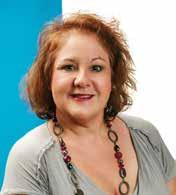
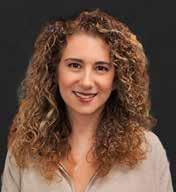
Ilyssa Klein
While Matzah’s not my favorite, I do love Passover because it instills a sense of family and community as we come together for the Seders and remember the Israelites who banded together for freedom and to find a new homeland.

This past weekend, my son, Jesse, had his Bar Mitzvah at The Temple. A place where he grew up - went to preschool, Sunday school and Hebrew school - with the same kids and clergy for the past 10 years. Throughout the planning, our friends and family rallied around us with advice and offers of help and support - from helping design brunch and shabbat dinner invitations to making beautiful hospitality bags. Having our synagogue friends and their families going through the same process leant a different kind of support and love which seemed to radiate leading up to, during, and after the service in a way that unequivocally said, “we love you and are also so proud of Jesse.”
I am so proud of Jesse. Not just for the incredible effort he put into preparing for his Bar Mitzvah and how beautifully he read Torah, but because he puts that same effort into everything he does. While we would like to take full credit for the person he is, we recognize that raising children takes a village and we are grateful for every person that has impacted our family and are helping to shape our children into the Jewish adults they will become.
So often we get caught up in the minutiae of our own lives and do not pause to consider others that might need a bit of extra love and support in good times and in challenging ones. This past weekend, and in the many weeks previous to it, I was reminded of the power of community and the responsibility that we have to others. Everyone should have the opportunity to feel what we felt this past weekend, surrounded by our family and friends as we experienced unbridled Joy and Nachas. From my family to yours, Happy Passover.
Klein is an account manager for the Atlanta Jewish times.
ATLANTA JEWISH TIMES MARCH 31, 2023 | 77 PASSOVER
David Ostrowsky serves as the sportswriter for the Atlanta Jewish Times.
Ilyssa
Elizabeth Langfelder
Our ability to join together as a group with a common mission builds the foundation for a strong community in which we live. As compassion, justice and loyalty grow, our community grows more and more resilient. It unites. It is then when a person can feel a part of something bigger than oneself. We each make up the building blocks for a robust, thriving community. Our unique passions, skills, thoughts, beliefs, and customs build upon each other to form a united front.
With many different religious communities, people can typically find one to belong to, if desired.
I’ve been fortunate to have been welcomed into my temple’s community where I can grow spiritually, feel comfortable asking for guidance, and even extend some help to others. I have found a special group of people and a place that I can call my community. I’ve been united.
This Passover, why not make a personal pledge to be more intentional about the way we treat others? We should strive to be more empathetic, more gracious, and more involved. Strengthen the foundation which already exists in your community. Celebrate the culture. Unite. It is then that perhaps your community will amplify your individual happiness, give you the courage to reach new heights, and give you the power to express yourself. A community cannot exist without individuals. A strong community cannot exist without unity.
Elizabeth Langfelder is an account manager at the Atlanta Jewish Times.
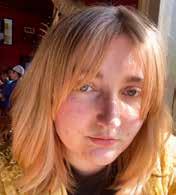
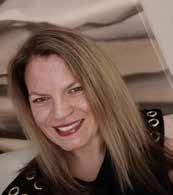
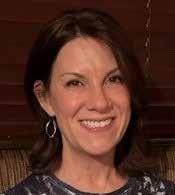
Rebecca LaBanca
Katie Gaffin
A desire for unity comes naturally to all of us and yet can be the hardest thing to achieve. The drive to create unity can forge great bonds or sever relationships entirely based on its interpretation. Some believe in a unity of ideas, that to work together and get along we all must share the same view of the world. Others believe that “our way is the right way and everyone else can get on board or be left behind”. While this creates a unity of smaller groups, what does that do for the larger community? How are we to leave a better world for those who come after us if we ignore everyone who thinks differently? If we accuse and belittle those who disagree rather than listening and understanding as to why people think differently?
I must clarify that by “listening and understanding” I do not mean accepting hateful, prejudiced, or bigoted ideas that unjustly disenfranchise people. There is no place for hate when creating a unified community, but there is a place for differing ideas and beliefs. We will never achieve a utopia where everyone shares the exact same opinions and that’s a good thing. Compliance and contentment are the biggest barriers to meaningful change, and our differing perspectives are what keep those barriers at bay. People coming together to discuss their ideas openly is how we unite to achieve a better community. We will never all think exactly the same, but coming to the table with an open mind and without prejudice will allow us to build a better and more united community for ourselves and all the generations to come.
I am new to Atlanta Jewish Times and am enjoying being a member of the team. I am an Atlanta native and being active in the Jewish community. Community is so important and essential in our lives. Whether it be the family that you are born into or one you create, or involvement in your synagogue. It helps to have support of some kind of community. As we move into the Passover holiday, we should be thankful that we made it through another year together with family and friends. My family’s tradition is doing both seders with close friends. I have fond memories of the Passover traditions. Now that I have a child, she is learning the four questions and enjoys searching for the afikomen. We should always take and reflect on our blessings.

78 | MARCH 31, 2023 ATLANTA JEWISH TIMES PASSOVER
Rebecca LaBanca is an administrative assistant at the Atlanta Jewish Times.
Katie Gaffin is Events and Public Relations Coordinator for the Atlanta Jewish Times.
partnering with

This year Atlanta Jewish Times has partnered with Jewish Mom’s of Atlanta to offer our community an opportunity to SHOW OFF our Mothers.
Submit ‘Why Your Mother Deserves the Best Day’ Here: bit.ly/AJT-Mothers-Day-2023

Submit 200 words or less, telling Jewish Atlanta why your mother deserves the flowers, candy or a day at the spa. Your submission will be entered in a drawing to win one of 3 prizes and 10 more will be drawn to be featured in the upcoming April 30, 2023 newspaper issue.
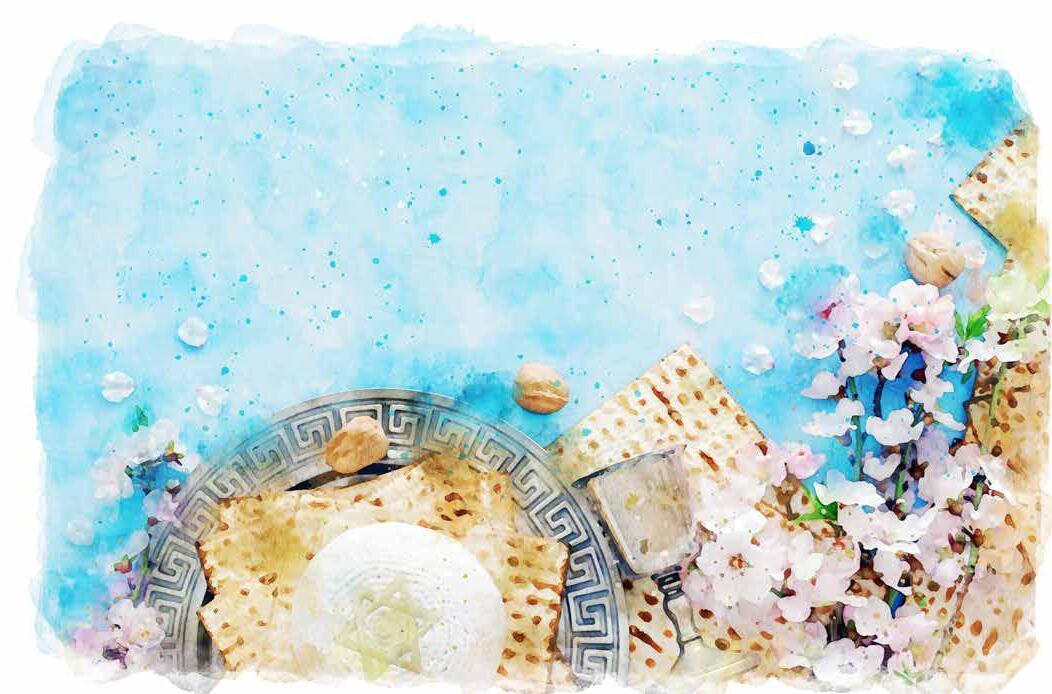
All submissions will get posted on the Atlanta Jewish Times website and social media.

Please provide a favorite photo of your mother and complete entry at https://bit.ly/AJT-Mothers-Day-2023 by 5 p.m. April 14, 2023.

2023 Passover Art Contest

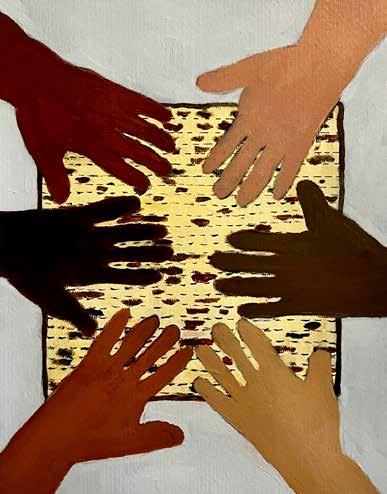

Mazel Tov to our 2023 Passover Art Contest winners! Ayeola Omolara Kaplan won firts place in our adult category and Ryan Schwartz was our winner in the child category. We received so many submissions from applicants as young as five, all the way up to eighty-two years old. The editors' choice are featured below. Check online to see all submissions.

ADULT 1st PLACE WINNER
ADULT 2nd PLACE WINNER
ADULT 3rd PLACE WINNER
80 | MARCH 31, 2023 ATLANTA JEWISH TIMES PASSOVER
Ayeola Omolara Kaplan Age: 24 Title: Transtemporal Passover
Michael Blaiss Age: 70 Title: Community Matzoh
Jeffrey Mesquita Age: 82 Title: Happy Passover in Hebrew
Meira Leinwand
Parents: Yoel and Shilvi Leinwand
Age: 10
Title: Community Seder
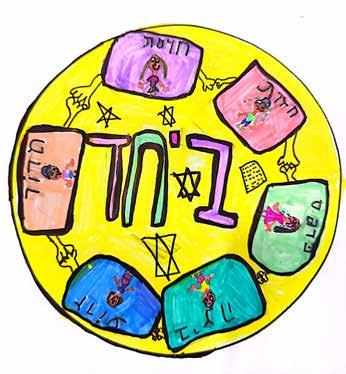
PASSOVER
Ryan Schwartz
Parents: Betsy and Elliott Schwartz
Age: 9
Title: Pesach Around The World
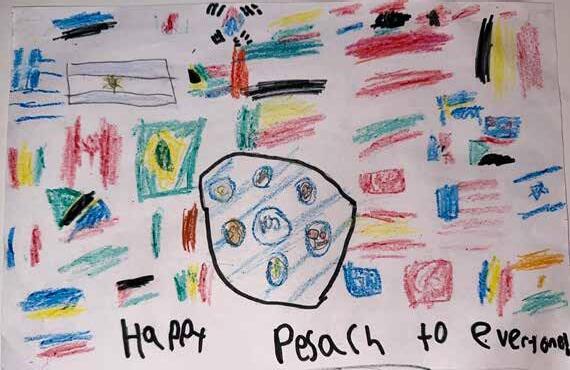
CHILD 1st PLACE WINNER
CHILD 2nd PLACE WINNER
Hadley Bienstock
Parents: Jennifer Bienstock
Age: 8
Title: Pet Passover
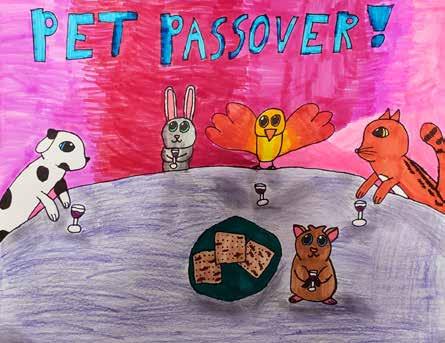
CHILD 3rd PLACE WINNER

ATLANTA JEWISH TIMES MARCH 31, 2023 | 81
Jasmine Shammay
Age: 40
Title: HaKotel
Samuel Gottesman
Parents: Leah and Dave Gottesman
Age: 9
Title: Matisse Seder Plate

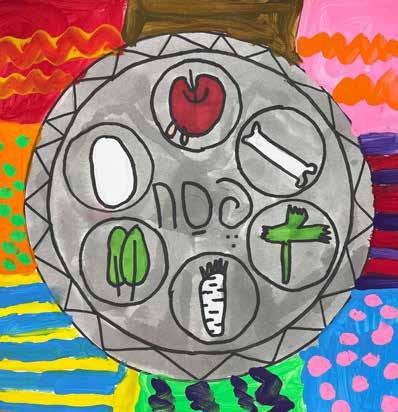
Lila Smolensky
Parent: Sara Fisher
Age: 11
Title: Matzah Unite
Maya Dagmi
Parent: Rachel
Age: 10
Title: Unity at passover



82 | MARCH 31, 2023 ATLANTA JEWISH TIMES PASSOVER
Shai Gryngarten
Parents: Bela Jacobson & Leandro Gryngarten
Age: 9
Title: "bread of affliction"
PASSOVER
Zachary Schwartz
Parents: Betsy and Elliott Schwartz
Age: 7
Title: Passover Seder Together
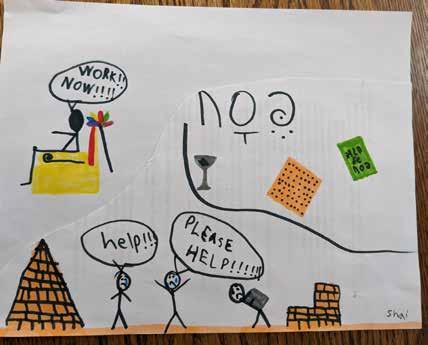
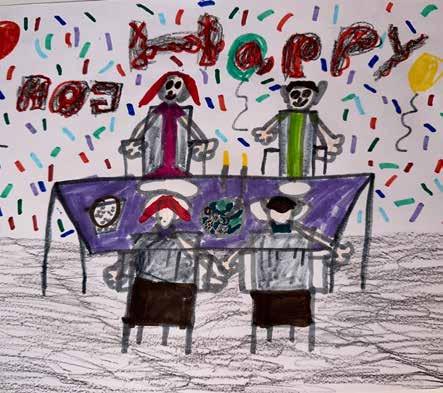
Ethan Phillips
Parents: Kiri and Adam Phillips
Age: 8
Title: Cool Seder Plate
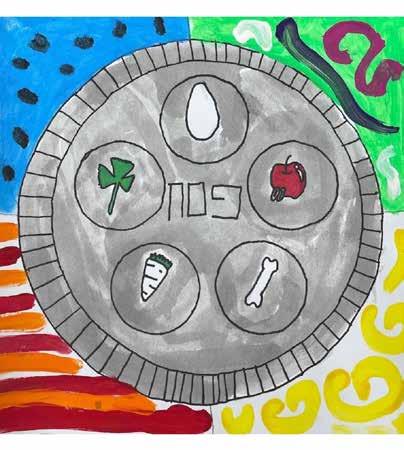

Sheina Kavka
Age: 28
Title: Flowing Wine
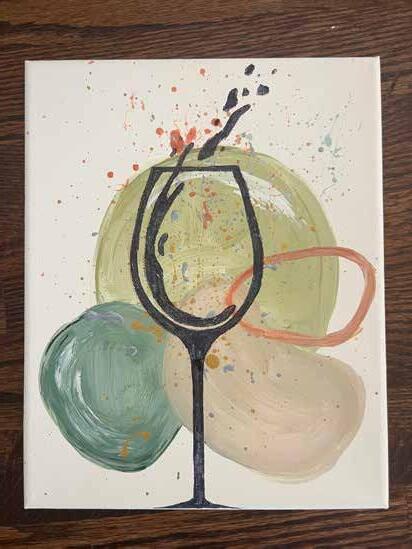
ATLANTA JEWISH TIMES MARCH 31, 2023 | 83
Age: 66
Sreeram Atthi
Parent: Neelima Pottigari
Age: 10
Title: The Power of Togetherness
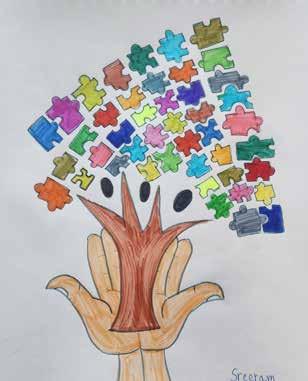
Joey Metzger
Parents: Gavriel Metzger
Age: 6
Title: Pesach Rocks!
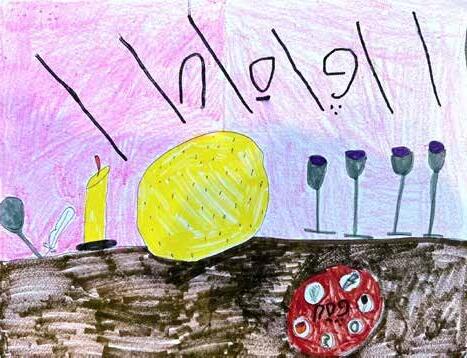
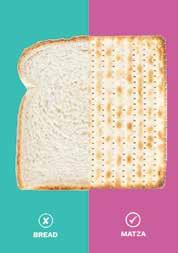

Faith Cohen
Age: Adult Title: Pesach Kitsch
WISHING YOU A CHAG KASHER V’SAMEACH! FC Strategy\\faithcohen.com
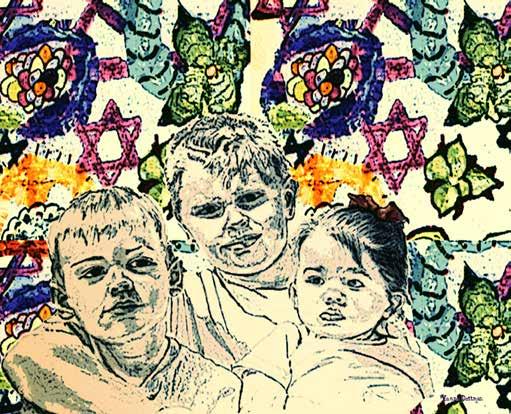



84 | MARCH 31, 2023 ATLANTA JEWISH TIMES PASSOVER
Hanna Dettman
Title: Passover Montage
Lev Gryngarten
Parents: Bela Jacobson & Leandro Gryngarten
Age: 7
Title: Pharaoh gives in
Asher Schwartz
Parents: Betsy and Elliott Schwartz
Age: 5
Title: Our family and a Seder plate
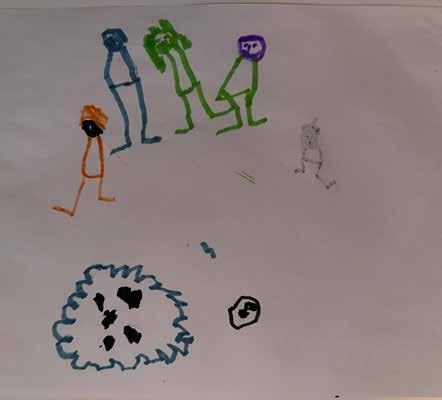
Happy Passover!
Passover Services with The Temple
Thursday, April 6 @ 10:30am
Passover Services (Virtual)
Saturday, April 8 @ 9:30am Mini Shabbat Morning – Passover Edition
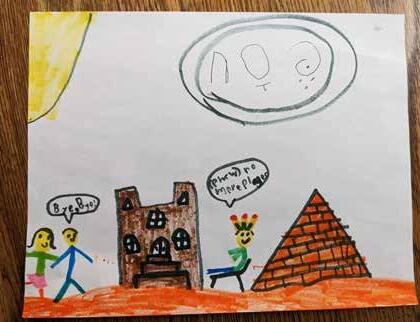

Wednesday, April 12 @ 10:30am
Last Day Passover Yizkor Service (Multi-Access)
ATLANTA JEWISH TIMES MARCH 31, 2023 | 85
1589 Peachtree
NE, Atlanta, GA
404.873.1731 • www.the-temple.org
Street
30309
ARTS & CULTURE
‘Shrek, the Musical’ at Atlanta Jewish Academy




Not every middle school would choose to present, “Shrek, the Musical.” While it’s a charming, family-friendly play, full of fun and cleverness, the young performers in this show had a lot of lines to learn, and even more singing; clear, strong singing was essential to carry the show. Fortunately, the Atlanta Jewish Academy production featured a plethora of good singers—and they could also act!
The school’s performing arts director, Simonie Levy, can be credited for casting and mentoring a group of boys and girls who impressively portrayed their characters, and some of them played more than one role in the show.
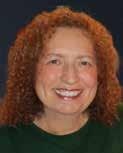
Levy knows that the main character, Shrek, is a role which displays subtle character nuances. Shrek isn’t alone: other nuanced characters include a talking donkey, (Hod Horowitz), an amusingly over-the-top princess (Sophie Zalik), a lovably cheerful Pinocchio (Noam BenYaacov) and a flamboyant, fiery dragon (Bru Freedman).
In this show, as in her other AJA productions, Levy’s practice of dual-casting the lead role gives two students a chance: the two leads performed at alternate shows. Isabella Steinberg and Lucky Freedman, who shared the role of Shrek, were each consistently entertaining, and each brought their own interpretation of the role and surprising on-stage savvy to the show.

Director Levy always opted for

shows, like “Shrek, the Musical,” which involve a lot of characters. This inclusive decision is a significant one because every middle schooler who wants to perform is given stage time. Performing
onstage before a live, cheering audience is thereby offered to everyone who tries out, an important team-building and confidence-building middle school experience.
Another feature of AJA shows is the team of students who create the sets, work backstage, and learn the ins and outs of lighting and sound. AJA middle school shows provide opportunities for students who are more interested in the technical side of shows to gain experience in theater production.
Technical director, Breit Katz, gave the tech crew hands-on instruction; therefore, the entirety of lights and sound were in capable student hands. Student Jessica Blanc adeptly coordinated the integration of cast and crew members to ensure a smooth performance.
Levy employed professional musicians to accompany the singing actors and to play background show music.
Sammy Mishkin, musical director, and his orchestra performed the spirited score for the play, and although many in the audience were familiar with the clever songs, even newcomers were drawn into the joyful—and occasionally poignant—live music.
For a performance by mostly preteen, fifth-to-seventh graders, “Shrek, the Musical” was an example of what an experienced director, an upbeat cast, and a knowledgeable tech crew can accomplish. This was Simonie Levy’s final show at the Atlanta Jewish Academy. After the performance, audience members, some with tears in their eyes, crowded around the beloved theater director to thank her for her many years of directing AJA musicals.
“Shrek, the Musical” was performed on the AJA stage on Wednesday evening, March 22, Thursday evening, March 23, and Sunday afternoon, March 26. ì

86 | MARCH 31, 2023 ATLANTA JEWISH TIMES
Chana Shapiro
Expert Knowledge of Jewish Memorialization Helping the Atlanta Jewish Community for over 20 years Bronze Markers • Stone Monuments & Markers • On-Site Engraving Quality, Compassion, & Lower Costs Set Us Apart Brook Bolton Owner 770.757.0330 office 770.289.0982 cell brook@rmemorials.com www.rmemorials.com
Isabella Steinberg (Shrek) and fairy tale characters // Photo Credit: Scott Steinberg
The Atlanta Jewish Academy recently hosted its musical, “Shrek” // Photo by Ella Szczupak “Shrek, The Musical” was performed to rave reviews by the AJA community
// Photo by Ella Szczupak
The students were the stars during AJA’s “Shrek, The Musical” // Photo by Ella Szczupak




ATLANTA JEWISH TIMES MARCH 31, 2023 | 87 ARTS & CULTURE
Isabella Steinberg (Shrek) and Sophia Zalik (Princess Fiona) // Photo Credit: Scott Steinberg
Tirza Monheit, Gila Wenger, Sophia Zalik (Princess Fiona at different ages) // Photo Credit: Scott Steinberg
The reviews are in! AJA’s “Shrek, The Musical” was a resounding success // Photo by Ella Szczupak
Topol Dies at 87 but Leaves a Timeless Legacy
By Bob Bahr
Chaim Topol, the Israeli actor who died March 9 at the age of 87, who gained international stardom as Tevya, the milkman in the 1971 film, “Fiddler On The Roof,” turned down his first chance to play the role. Originally, he was asked to play Tevya in the 1965 Hebrew language version of the musical when it was produced in Tel Aviv.

It was a role that had been created on Broadway by Zero Mostel, who played Tevye in the broad, comic style he was known for. But as documentary producer Daniel Raim tells it, Topol had another vision of the character. He had gained it listening to his father, who grew up with the original stories by Sholom Aleichem which inspired the musical. Raim interviewed Topol in Tel Aviv in 2009.
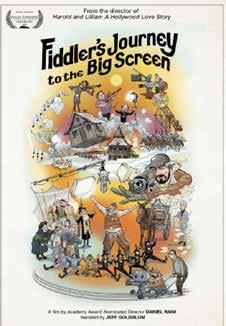
“As Topol tells the story,” Raim recalls, “listening to stories that his father recited from memory he really became immersed in that insular world and loved it all. When he first saw Zero Mostel playing Tevye, on Broadway, he was not moved by the production. He was not in(to) playing that Tevye.”
The role in that Tel Aviv production he turned down, instead, was taken by the wellknown Israeli actor of Russian heritage,
Shmuel Rodensky, who made Tevye into a thoughtful but still humorous character, beset by all the problems of early 20th cen-
Invitation to sell at auction

Topol had to age by 20 years and appear to weigh 30 pounds heavier than he actually was.
tury Eastern European shtetl life. It was a revelation to Topol, who then jumped at the chance to fill in for Rodensky for 10 weeks
88 | MARCH 31, 2023 ATLANTA JEWISH TIMES
Filmmaker Daniel Raim interviewed Chaim Topol for his documentary that was shown at last year’s AJFF.
We are accepting consignments for our upcoming auctions. Contact us to receive an auction valuation on a single item or entire collection. Yarden Elias | 404.800.0192 Atlanta@HindmanAuctions.com HINDMANAUCTIONS.COM ARTS & CULTURE
For two decades, as a result of “Fiddler On The Roof,” Chaim Topol became the most famous Israeli actor in the world.

when the actor became ill.
Eventually, he was asked to audition for the role in the original West End production in London in 1967. Although he was only in his early 30s when he tried out and had to learn the songs in English phonetically because he didn’t speak the language, producer Harold Prince hired him. The original director of the Broadway production, Jerome Robbins, worked with the Israeli actor to create an alternative to the Mostel creation while it retained much of the warmth and humor of the Broadway production. The British show ran for more than 2,000 performances and in October 1971, on the closing night, Hollywood director Norman Jewison came to London to see the show. Filmmaker Raim, who directed the documentary about the making that was shown at last year’s Atlanta Jewish Film Festival, described Topol as having no idea he was being considered for the role.
“Topol had no idea that Norman Jewison was coming backstage to meet him afterwards. And he told me, his first thought was how incredibly honored he felt when Norman wanted to meet him, how he was surprised when he was told he would star in the film. He thought about the bittersweet back story of his own family that came from the shtetls in Russia and now, he was going to tell their story to the world. So, it was powerful to hear all of this from him, in person and then finally, years later, to develop it into the documentary that I did “Fiddler’s Journey to the Big Screen.”
Topol was a risky choice, according to Emory University film professor Matthew Bernstein, who was also the executive producer of Raim’s documentary. When Walter

Mirisch, whose company produced the film, was a guest at Emory in 2010, he told Bernstein and his students the decision was a difficult one.
“Mirisch said (that was) probably the most consequential casting decision he made in his long career,” Bernstein said, “not to cast Zero Mostel and to go with Topol. For some people, it’s hard to get over the fact that Zero Mostel didn’t play the role. But if you get over that, Topol’s marvelous. He has a certain kind of strength, a certain resilience. He embodies all these wise, wonderful questioning, and stubborn characteristics of Tevye that really brings him to life.”
For the film, Topol, who was only 36 at the time, had to age by 20 years and was made to look 30 pounds heavier with costuming and make-up. He’s said to have “locked his muscles” as he described it to give Tevye the more measured pace of an older man. For his performance, he won a Golden Globe for Best Actor and was nominated for an Academy Award. For 20 years after the film premiered, he was the most famous Israeli actor in the world. His performance not only symbolized the tough life of a shtetl Jew in Eastern Europe, but the toughness and resourcefulness that characterized a new generation of Israeli Jews.
In the film when he tells a Russian Czarist official, through barely clenched teeth, “Get off my land,” he was speaking for more than himself.
Upon Topol’s death, the president of Israel, Isaac Herzog, said in a statement that he “filled the cinema screens with his presence and, above all, deeply entered our hearts.”
ATLANTA JEWISH TIMES MARCH 31, 2023 | 89
ARTS & CULTURE
ì
ARTS & CULTURE
‘Israeli 201’ Demystifies Everyday Life in Israel
By Bob Bahr
Israeli comedians Joel Chasnoff and Benji Lovett both first moved to Israel 20 years ago from Chicago and Dallas, respectively. Over the years, they’ve gained a unique perspective about everyday life in the Jewish State. This month, Gefen Publishing released “Israel 201,” which, as its title would suggest, is an introduction to Israel for those who already know the basics. The AJT spoke to them just before their Shabbat program on March 10-11 at Temple Sinai in Sandy Springs.
Bahr: Why write this book?
Chasnoff: Our goal was to not write a book about the usual narratives, which is war, conflict, occupation, or startup nation technology. But to write about all those little pockets of life that make it magical and wonderful and also chaotic, that people would understand the country in a comprehensive way, not just for what they see on CNN.
Bahr: How has your career as co-



medians influenced what you wrote about Israel?
Lovett: I think we’re fair. We’re not angry, ranting comedians. We make fun of others, but we make fun of ourselves. And I think, as immigrants, we have the ability to make fun of Israel, but also realize that we make fun of ourselves.

Chasnoff: The best comedians are great observers. They look at life…and they pay attention to the contradictions. And then, they make their humor out of (it). In our book, we’re finding all of those little nuances of Israeli life that make it different and special. Sometimes, it leads to a humor, but sometimes, it just
leads to pointing out a really astute observation.
Bahr: What do you think it is that Americans don’t understand about Israel?
Chasnoff: I think most American Jews and America, in general, are not


World-renowned guest artists & luminescent music

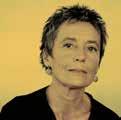
BRUCKNER: Te Deum



GERSHWIN: Rhapsody in Blue

HOLST: The Planets
ORFF: Carmina Burana
RACHMANINOV: Piano Concerto No. 3
VERDI: Requiem
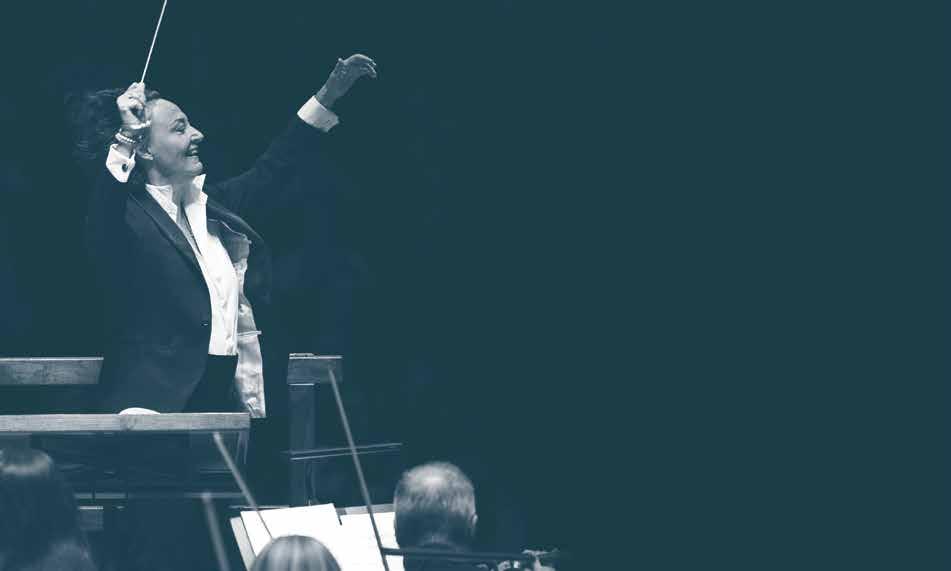
90 | MARCH 31, 2023 ATLANTA JEWISH TIMES
“Israel 201” author Joel Chasnoff believes Israel will survive recent protests even though there is still much uncertainty.
According to the new book, “Israeli 201,” Jews and Israeli Arabs have more everyday contact then most realize.
and
are subject to change. ON SALE NOW aso.org
Classical Season presented by
All programs, dates
artists
aware of how economically difficult it is just to survive on a month-to-month basis in Israel. The salaries are low, the day-to-day expenses are very high. And I think that they don’t quite realize here how much Israeli life centers on just surviving economically and how that influences politics, too.
I think a second thing they don’t understand is how much interaction there is between Jews and Arabs. I think there’s this notion that there’s two separate peoples who need to find a way to coexist. The reality is there is a lot more coexistence than people realize. It’s actually quite beautiful, and I think it’s hopeful. There’s no such thing as going a day in Israel where you will not interact at some point with an Arab-Israeli as well, if you’re Jewish, Israeli, and vice versa. And I think if people were aware that that happened, they might be more hopeful and see the country differently.
I think the third area where they might not be fully clear is just how complicated the political system is. I think it’s easy to look from the outside and say, ‘Oh, they have all these parties.’ And so, it’s different from the American system. I don’t think Americans quite realize how messy it gets. And the amount of deal-making and bartering that needs to go into just forming a government has a large influence on why Israel is the way it is.

Bahr: How do you account for the fact that you live in a Jewish state and 80 percent of the people there say they aren’t religious?
Lovett - In America, we have our American -- our national identity as Americans -- and our religious identity as Jews. And in Israel, those are fused together. And many Israelis don’t even know until they come abroad to distin-

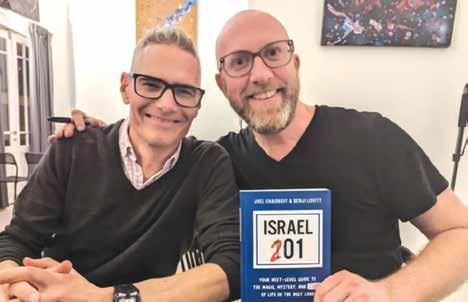
guish between the two. Why do they light the candles? Because they’re Israeli. Why do they suffer? Because they’re Israeli. It doesn’t occur to them that they’re Jewish.
Chasnoff: I think one of the best things happening in the Jewish world now is Israelis who are out of the army coming to work at summer camps in America because they get a taste for the first time that Judaism doesn’t have to be the way it is in Israel. It doesn’t have to be Orthodox or nothing. I think we should send Israelis abroad so that they can see what Judaism is like elsewhere and then bring some of that home.
Bahr: Hundreds of thousands of Israelis have taken to the streets in recent weeks to protest the direction the new government has taken. Is Israel falling apart?
Chasnoff: While those demonstrations were going on, there were other people who are going to Purim parties dressed in costumes and kids were playing basketball at the courts nearby. And if I were to open a newspaper and read what’s going on in America, I would not see the normal conversations that people are having and the jokes that friends are sharing between ourselves.
You know, news is designed to grab the most scintillating aspects of any society. And to only pay attention to that would give you the wrong impression of what daily life is like. That’s why we wrote this book, to show you daily life, and that’s why we want people to come to Israel. Nothing will change your mind more than a two-week trip here to see what the country is like.
That said, is the country falling apart? Most people do think it will survive. They don’t know how. But we don’t have a choice. So, it must. ì

ATLANTA JEWISH TIMES MARCH 31, 2023 | 91
ARTS & CULTURE TICKETS ON SALE NOW! FoodThatRocks.org TASTE OF ATLANTA PRESENTS FOOD · CRAFT COCKTAILS · MUSIC THURSDAY, JUNE 8 City Springs | Sandy Springs @FoodThatRocksATL FOLLOW US!
Joel Chasnoff, left, and Benji Lovett were guests at Temple Sinai during Shabbat on March 9 and 10.
Actor’s Express Production Explores French Antisemitism
By Bob Bahr

A new drama that focuses on the dilemma facing Jews in modern-day France is opening on April 14 at Actor’s Express, the theater company at the King Plow Center on Atlanta’s West Side. The play, “Prayer for the French Republic,” tells the story of how one French family comes to grips with the rising tide of antisemitism in France. It opened to generally strong reviews in its off-Broadway debut last year.


With antisemitism an important issue in American life, director Freddie Ashley, who is also the artistic director of Actor’s Express, thought the time was right for the local production.
“The current moment, given the rise of antisemitism and antisemitic crimes, is precisely what the characters in the story are dealing with. It’s set in a time six years ago, seven years ago now, but antisemitism has only continued to escalate throughout Europe. and in our own country. So, it just seems like we need to be telling stories, I think, to fight this.”
The play’s author, Joshua Harmon,
is a Jewish native New Yorker, who, while he looks at developments far from home,


has created an American character named, Molly, a 20-year-old who draws us into the issues facing the distant relatives she visits in Paris.
When Daniel, the 20-something son of her relatives, the Benhamous family, returns after being roughed up on the street by antisemites, his father, Charles, a Parisian doctor, is forced to face a question that haunts him. Although his family has lived in France for hundreds of years, he asks “Are we safe? Or is it time to leave?”
The words become a recurring theme in the play that has had particular resonance for Adir Lev Mann, who plays Daniel, the Benhamous’ observant, kipah-wearing son. Mann lived in Israel as a child, and he visited Paris to prepare for the role. Having family members who are from the Jewish communities of Morocco and Iraq has helped him understand the importance of the issues that the play raises
“Because it represents different types of Jews, this play encapsulates the modern Jewish experience,” Mann commented. “We have both an American Jew and French Jews who are the Ashkenazi and Sephardic. In “Prayer for the French Republic,” they are all brought together to deal with topics in a way that’s not been possible to really encapsulate so well elsewhere. The story does a really good job of hitting all these marks.”
How to survive in a country beset by antisemitism is a dilemma that’s faced the French Jewish community for gen-

erations. The play takes us back several times to 1945. At the start of the Nazi occupation, there were more than 340,000 Jews living in France. About 75,000 of them were deported to concentration camps. Often, they were rounded up with the help of French police and the Nazi’s French political collaborators. Only about 2,500 of those who were sent off returned to face many of their neighbors who had helped the Nazis.
“Prayer for the French Republic,” which takes its title from a text in the French Jewish prayer book, is a complex story. There are 11 cast members in the play which is told over three hours. Director Ashley admits in its staging and its performance, the play is a challenge. What helps redeem it, for him, is the writing’s quality.
“The playwright is a very close friend of mine and often will share ideas in progress with me that he’s working on,” Ashley said. “And we have a long professional history together. And he sent me this play and I couldn’t believe what I was reading. It was so powerful, so wellwritten. It’s hard to deny what this play offers.”
The play won four 2022 Drama Desk Awards, including best new production, New York’s Outer Circle Award for Best off-Broadway play, and was first winner of the Trish Vradenburg Jewish Play Prize, awarded by Theater J at the Jewish Community Center in Washington.
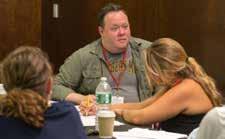
Freddy Ashley sees the success of “Prayer” as a promising development for recent theater, which has often been about stories and voices who have had difficulty being heard. That includes the contemporary Jewish experience that Joshua Harmon finds so appealing.
“I think finding plays that have the authentic voice of a lived experience of a cultural heritage, like Jewish life today,” Ashley observes, “is something that is really exciting in theater right now. It allows us to see stories not filtered through another lens, but from a place of authenticity.” ì

92 | MARCH 31, 2023 ATLANTA JEWISH TIMES ARTS & CULTURE
“Prayer for the French Republic,” which centers around a contemporary French Jewish family, premiered last year at The Manhattan Theater Project.
“Prayer for the French Republic” at Actor’s Express runs from April 20 to May 14.
The role of Daniel in “Prayer for the French Republic,” is played by Adir Lev Mann, who did research on the play in Paris.
SIMCHA SPOTLIGHT Have something to celebrate? Share your simchas with us! Births, B’nai Mitzvah, Engagements, Weddings, Anniversaries, Special Birthdays and more ... Share your news with the community with free AJT simcha announcements. Send info to submissions@atljewishtimes.com
Freddy Ashley, director of “Prayer for the French Republic,” is encouraged by the new voices, like Joshua Harmon, in contemporary theater.

ATLANTA JEWISH TIMES MARCH 31, 2023 | 93 3755 Peachtree Road NE | Atlanta, GA 30319 Independent Living | Assisted Living | ALC000189 WWW.SENIORLIFESTYLE.COM Keep Your World BRIGHT Stay connected. Get out and about. And don’t let isolation creep up on you. That’s well-being in a nutshell, and the plan for making it happen is a friendship-filled life at Renaissance on Peachtree. You deserve the best out of life – so keep your world brimming with possibilities and seek out the opportunities that await. Discover retirement living designed to keep the adventure in. Call 404-737-7411 to arrange a visit.
Mel Brooks is Back, at 97 with More Laughs
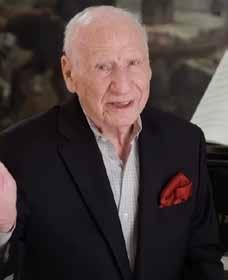 By Bob Bahr
By Bob Bahr
In just three months, Mel Brooks, the comedic master of such film classics as “Young Frankenstein,” the television series “Get Smart,” and the iconic “2000 Year Old Man” will turn 97. At an age when most of his contemporaries are living out their final years in nursing homes, Mel Brooks is still making us laugh.
His latest project, “History of the World Part II,” has debuted as an eightpart series on Hulu, the Disney-owned streaming service. Many of those who worked on the production were either small children or hadn’t been born when his 1981 film, “History of the World Part I,” opened 42 years ago. In that feature film, he not only wrote, produced, and directed, but also took on five roles that spoofed key moments in history.
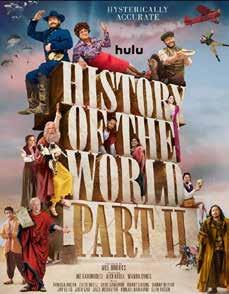
In the latest production, he’s listed as a writer, producer, and narrator, but has Nick Kroll, Ike Barinholtz, Wanda Sykes, and David Stassen to help with the heavy lifting. All are proven talents in Hollywood’s comedy world and, in addition, to their production roles they are also performers. Barinholtz, for example, is the Civil War General Ulysses Grant, the inventor Alexander Graham Bell, President Theodore Roosevelt, and Leon Trotsky, the Soviet revolutionary.
Sykes makes multiple appearances in a number of the episodes as well. She’s particularly effective as the Black Congresswoman Shirley Chisholm in a sendup of 1970s TV sitcoms. She’s also Harriet Tubman, the 19th century anti-slavery activist and Bessie Coleman, a pioneering black aviatrix who partners with Amelia Earhart, another early female aviator played by Hannah Einbinder, to establish a lesbian bar.
What would a Brooks production be without a send-up of character like an Eastern European shtetl family led by its Tevye-like patriarch, Shmuck Mudman. There, a bumbling Noah who fills his ark only with breeds of small dogs and, during the Oslo Middle East Peace Accords, Jews and Arabs argue over who first invented hummus.

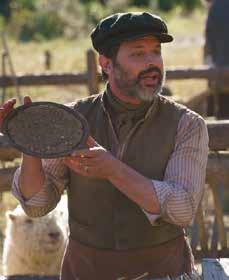
If it all sounds like clever but mildly offensive and occasionally tasteless fun, it is. Critics have generally given it a thumbs up for its inventive silliness and it has been popular with viewers. For Brooks’ more daring ventures into social and historical satire, you’ll have to look to his earlier hits. There are, for example, the flatulent cowboys of “Blaz-
ing Saddles” who suffer from digestive discomfort as they sit around the campfire enjoying their dinner of beans. It is a comedic assault on Hollywood myth makers that is both hilarious and hilarious and astonishing at one time.
Even more daring was Brooks’ 1967 film, “The Producers,” starring Zero Mostel and Gene Wilder as a Broadway producer and his accountant who deliberately set out to create a stage musical that flops. The production, “Springtime For Hitler,” subtitled “A Gay Romp with Adolf and Eva at Berchtesgaren,” has production numbers celebrating the Third Reich.
The plan is to oversell the production to investors and after disastrous opening night reviews, the two can take the money they’ve raised and escape to Brazil. Instead, the play, with its lavish but politically provocative musical num-
bers and a coyly buffoonish Hitler, is an unexpected smash hit.

It took years for film goers to fully accept Brooks' premise that the best way to confront Hitler was to laugh in his face. Filmmakers in Hollywood have been cautious about satirizing Hitler.
There were exceptions like Chaplin’s 1940s hit “The Great Dictator,” and Jack Benny and Ernst Lubitsch’s 1942 masterful “To Be or Not To Be,” which was shown in a retrospective screening at a recent Atlanta Jewish Film Festival. But there had never been anything like “The Producers.”
As time passed, the critical response to Brooks’ ‘Producers’ softened and, in 1996, it was selected for the National Film Registry by the Library of Congress. It is ranked 11th on the American Film Institute’s 100 Best Comedies of All Time.
To come full circle, Brooks teamed
up with playwright Thomas Meehan in 2001 to create "The Producers" as a hit musical that received a dozen Tony Awards. That production was re-adapted into a 2005 film version that failed at the box office.
For all of his achievements, Brooks was awarded the National Medal of Arts by President Obama at the White House in 2016.
His record of accomplishments over his long career that began as a writer for the early television comedian, Sid Caesar, in the 1950s is equaled perhaps only by Norman Lear. Lear, the TV sitcom genius, turned 100 last July.
As “History of the World Part II” demonstrates, Brooks has remained successful even in old age, because he continues to think like a kid — an often irreverent, iconoclastic youngster who has never grown up. ì
94 | MARCH 31, 2023 ATLANTA JEWISH TIMES ARTS & CULTURE
“History of the World Part II” arrived 42 years after Part I.
Audiences took some time to warm up to the comedy of Brooks’ 1967 film, “The Producers.”
Age has not affected Mel Brooks’ comedic instincts.
In “History of the World Part II,” Noah stocks his ark with dogs.
A new Mel Brooks series takes aim at “Fiddler on The Roof.”
Chai Style Home

Worlds Intersect at the Prado
Marcia Caller Jaffe
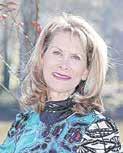
Denny Marcus and Andre Schnabl felt like fish out of water in their gracious Buckhead home and set their sights on just the right location in Ansley Park.

Schnabl said, “With Harrison Design, we created the house that reflects who we are and how we live. Growing up in Zimbabwe, architectural design focused on bringing the outdoors into the home. This was a challenge in a high-density urban neighborhood where maintaining privacy was important. We created spaces to be used in our daily lives filled with art collected from travels over the years.”
The couple’s intensity and exuberance let the art do the talking. Casual formality presides here where what’s on the walls envelops thought, with pieces from Cape Town to Santa Fe to the Far East. From folk art to modern abstracts, beadwork to glass, sculptures in stone or bronze, pop art and antiques- their home is a trove of diversity.
The adventure began with knocking down a bungalow built in the 1920s that took 18 months to complete, resulting in a house and pool that relates to its unique site.
Marcia: How did the process flow?
Andre: We entered the project with some trepidation, as we have all been told, building a home can be stressful. We agreed that I would drive the overall design and feel of the structure while Denny would choose textures, colors, and materials. We loved the process… talking to each other each step of the way.
Marcia: How would you describe the aesthetic?
Denny: With the heavy lifting done, we set out to bring the space alive with art and collectibles from our travels crossing a variety of cultures, periods, geographies, and media. We love traveling, and part of the adventure is exploring galleries, studios, and local markets. Meeting local artists makes it even more fun. The art in our home and outside in the yard is an accumulation of these travels.
Marcia: You grew up in an artsy household?
Andre: My mother’s love of art stuck with me. She was a mentor to many local African carvers. I witnessed her sharing her
thoughts with local artists who dropped in unannounced at our home in Zimbabwe. My father fled Germany in 1936 for South Africa. Although he enjoyed my mother’s interest in the visual arts, he was more of a music man. This 1830s liquor cabinet is from his side of the family. The light-hearted painting above the cabinet is “Three Children,” by Parisian artist Fabrice Mulheim.
Marcia: What are your favorites here?
Denny: The large piece in the stairwell is “Eva,” by Anna Halm Schudel, a Swiss artist. It’s a pixel portrait made from hundreds of digital photos of notable women. Nearby sits an exotic Moroccan jar (1960) we found in Fez.
Another special oil with the haunting eyes in the foyer, “Looking Through the Letter Box,” is by Andre’s nephew, Daniel Levi. We have many favorites.
Marcia: What is African inspired?
Andre: We are a mixed marriage of sorts. Me, with my African background and she, born in Memphis, and raised in Alabama. Her experience helped me assimilate into America: and my background caused her to fall in love with Africa. Although we have many African pieces, I think our collection is diverse. Some of the African work was handed down by my parents and is representative of native
and European cultures from the 1950s and 1960s. Some are tribal artifacts, but much is contemporary. The bulk was collected in the last 30 years by us as a couple.
The soapstone sculptures are akin to the ones at the Atlanta airport where subjects are gradually carved and exposed. We have a South African beaded work, one of a series representing the solar system, done by tribal Xhosa (Nelson Mandela’s tribe) women. We’re pleased to support local women there to be self-sufficient.
Denny: We have a horizontal Native American piece (Dan Naminga) where a shaman illustrates the Hopi tribe’s migration to safety and spiritual destiny of life’s sagas: crossing the mountain to get to freedom, life, death…all of which reads from right to left. By the fireplace is “Conception,” a compelling sculpture of a woman standing on the back of a man.
Marcia: Describe the painting with the Atlanta Jewish Times.
Denny: I had that commissioned (Steve Penley) for Andre’s 50th birthday, and your paper had just run a story, “Wild and Wooly,” when he owned a sheep farm near Athens. It was a fun project collecting his life’s memorabilia, which Steve incorporated.
ATLANTA JEWISH TIMES MARCH 31, 2023 | 95
Denny Marcus and Andre Schnabl relax in their living room behind a wooden bowl by Matt Moulthrop.
The Marcus-Schnabl living room has a brick hued, centrally focused grouping by Argentinean Virginia Gabaldo, “Personal Images.” Also shown are self-portraits in different moods in glass and metal foil. Top right: a shaman illustrates the Hopi tribe’s migration to safety and spiritual destiny (Dan Namingha). // All photos by Howard Mendel
Bottom Right: A light-hearted painting in the dining room, “Three Children,” is by Parisian Fabrice Mulheim.
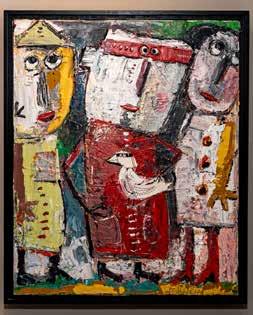

Bottom Left: One of Denny’s favorites is “Eva” by Anna Halm Schudel, a Swiss artist. The piece is a pixel portrait made from digital photos of notable women.

Left: Dining room wall, from left: “Resting Spirits” by Claud Nyandoro, from serpentine stone from Zimbabwe; “The Window Series” (bronze) by George Beasley; Fertility Doll, Cameroon

Marcia: Your kitchen is central to the home.

Denny: We enjoy cooking together and entertaining. Weather permitting, we cook outside. Andre is the master griller and sous chef. There are nooks for art in the kitchen. To the right of the refrigerator is a work by Preston Singletary, recently featured on “CBS Sunday Morning.” His focus is bringing Native American art into the contemporary world using glass. The pop art ceramic of Ben Gurion is by Israeli artist Noam Yuval.
Marcia: What’s the stone on the front walkway?
Denny: “Shiva Lingam” from the Narmada River (India) is a sacred Hindu symbol. Its egg-like phallic shape represents the divine male and female powers of nature.
Marcia: And when you’re not country hopping?
Denny: We are very involved as volunteers at Kennesaw State University.
96 | MARCH 31, 2023 ATLANTA JEWISH TIMES CHAI STYLE
Above: Denny and Andre created a private backyard paradise in which to unwind and entertain.
Right: The large butcher painting in the entrance hall is by Zimbabwean artist Gareth Nyanhonfu. Below is a colorful detailed table by American artist, Barbara Brozic.
CHAI STYLE
Andre is chairman of the finance and compensation committee of the university foundation and serves on its executive committee. I am board chair for the homeless and food insecure students on campus (CARE). I also enjoy my pickle ball league.
Marcia: Bottom line?
Andre: We created a sense of open spaces with loads of light and without losing warmth and intimacy.

Denny: We buy art with which we will enjoy living. ì
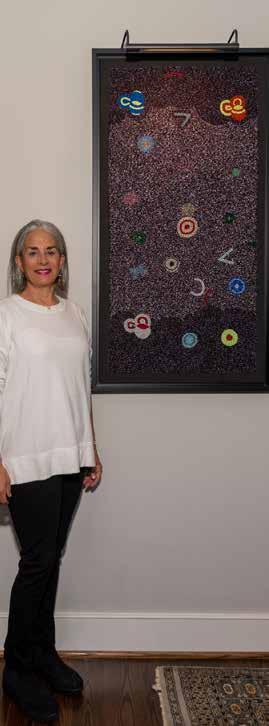
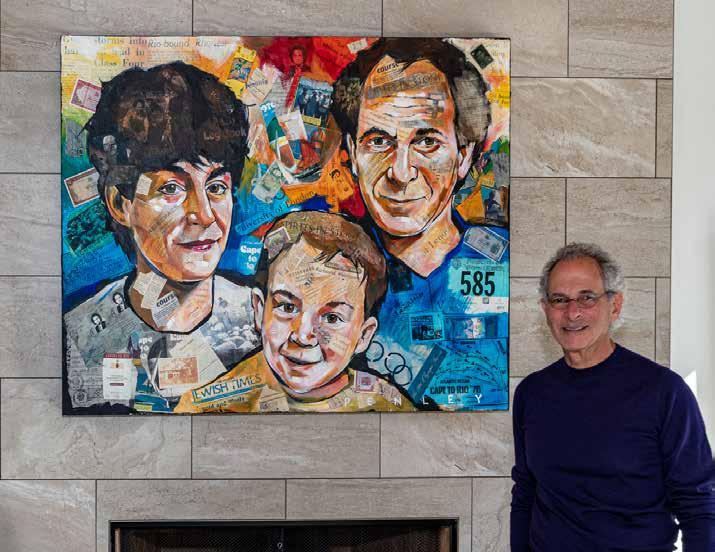 Above: Denny Marcus supports the art of South African women who create beadwork to be selfsufficient. This is one of a series representing the solar system, done by a group of tribal Xhosa women.
Above: Denny commissioned Atlanta artist Steve Penley to commemorate Andre’s 50th birthday in this collection of life events.
Below: The dining room table has a vessel of female faces by Mexican artist Jose Cruz. Chandelier by C Lighting.
Above: Denny Marcus supports the art of South African women who create beadwork to be selfsufficient. This is one of a series representing the solar system, done by a group of tribal Xhosa women.
Above: Denny commissioned Atlanta artist Steve Penley to commemorate Andre’s 50th birthday in this collection of life events.
Below: The dining room table has a vessel of female faces by Mexican artist Jose Cruz. Chandelier by C Lighting.
Until April 30
JELF (Jewish Educational Loan Fund) helps Jewish students by providing interest-free loans for higher education. To qualify, applicants must be a resident of Georgia, Florida, North Carolina, South Carolina or Virginia (excluding metro D.C.), be enrolled full-time in a degree or certificate seeking program, have U.S. citizenship or lawful immigration status, and be able to demonstrate financial need (2022 FAFSA application required). To learn more or apply, visit http://bit. ly/3mNdjYU before April 30!
SATURDAY, APRIL 1
Tot Shabbat and Kiddush Lunch – 11 a.m. to 1 p.m. Join Congregation Beth Shalom every Shabbat for an interactive Tot Shabbat where we sing, play, and engage in fun activities, followed by a wonderful Shabbat Kiddush lunch together. Find out more at https://bit.ly/3PMct7u.
Family Model Matzah Bakery – 10 to 11:30 a.m. Make your own handmade matzah & decorate an Afikoman bag for your seder! Register at http://bit. ly/3JRwzgQ.


MONDAY, APRIL 3
Model Seder – 4:30 to 6 p.m. Congregation Shearith Israel will hold our annual Model Seder for Jewish adults with disabilities and their caretakers replete with a delicious Passover dinner. Reserve your space at http://bit. ly/3JwhAHF.

SUNDAY, APRIL 2
Mazal Tots Baby and Me – 9:30 to 10:30 a.m. Mazal Tots at Temple Emanu-El is a unique and joyful “baby and me” class that combines the power of song, movement, sensory stimulation, and play to create meaningful bonding experiences between parents and their little ones. Learn more at http://bit. ly/41648SR.
Annual and Perennial Plants for Water Gardens - 2 to 3:15 p.m. A water garden isn’t a water garden until there are aquatic plants to show off. Whether you want floating plants, marginal plants, or bog plants, the right greenery can turn your simple water garden into an oasis of your favorite colors, textures, and scents –– and don’t forget the lulling sounds of rippling water. RSVP at http://bit.ly/3TsE4ht.

Find more events and submit items for our online and print calendars at: www.atlantajewishconnector.com
Calendar sponsored by the Atlanta Jewish Connector, an initiative of the AJT. In order to be considered for the print edition, please submit events three to four weeks in advance. Contact Diana Cole for more information at Diana@atljewishtimes.com.
Atlanta Jewish Bowling League Winter Session – 6:30 to 9 p.m. Atlanta Jewish Bowling League is a co-ed fun group who love to bowl and have a good time, a very social league! Dues are $18 per week. Learn more at https://bit. ly/3V9TZjV.

Family Estrangement Support Group –4 to 5 p.m. Being estranged from loved ones brings mixed and complicated emotions. This virtual group by JFCS is intended for those experiencing longstanding estrangements from family members. Group meetings will focus on processing and supporting one another. Get the link by visiting http://bit. ly/40eFOx6.

TUESDAY, APRIL 4
Brain Health Bootcamp 1-3 p.m. If you are recognizing symptoms of cognitive changes or have been diagnosed with mild cognitive impairment, our fun and social class can help you strengthen your mind and body to stay sharp, especially during these times. Find out more at https://bit. ly/3tPwMs3.

98 | MARCH 31, 2023 ATLANTA JEWISH TIMES APRIL 1 - APRIL 15 CALENDAR
WEDNESDAY, APRIL 5
First Night Seder at Etz Chaim - 6 to 7 p.m. Got Seder? We do! First-Night Seder at Etz Chaim. The art, music, and modern meaning of the Haggadah led by Miriam Rosenbaum in the Hammer-Tritt Social Hall. RSVP at http://bit.ly/3lvug9G.

CANDLE-LIGHTING TIMES
Passover
Wednesday, April 5 Nissan 14, 5783 Light Holiday Candles at 7:42 PM
Thursday, April 6 Nissan 15, 5783 Light Holiday Candles after 8:39 PM from a pre-existing flame.
Shabbat, Intermediate Days of Passover
Friday, April 7 Nissan 16, 5783 Light Shabbat Candles at 7:44 PM from a pre-existing flame.
Saturday, April 8 Nissan 17, 5783 Shabbat Ends 8:40 PM Passover
Tuesday, April 11 Nissan 20, 5783 Light Holiday Candles at 7:47 PM
Wednesday, April 12, Nissan 21, 5783 Light Holiday Candles after 8:44 PM from a pre-existing flame.
Thursday, April 13 Nissan 22, 5783 Holiday Ends 8:45 PM
Torah Reading: Shemini
Friday, April 14 Nissan 23, 5783 7:49 PM
Saturday, April 15 Nissan 24, 5783 Shabbat Ends 8:46 PM
FRIDAY, APRIL 7
Kabbalat Panim and Kabbalat Shabbat - 5:45 Once a month Congregation Dor Tamid will gather for a Kabbalat Panim, an Oneg Shabbat before services. Then will move into the sanctuary to welcome Shabbat together. Learn more at https://bit.ly/3Zt9YvN.
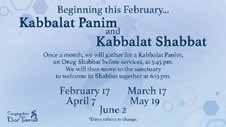

SATURDAY, APRIL 8
Tot Shabbat – 9 to 10 a.m. Come for Shabbat at Temple Beth Tikvah on Saturday morning. This is geared towards children ages 18 months to 5 years.

Passover Seder – 8 p.m. Experience the Passover Seder with Chabad of North Fulton. Let them know you are coming by visiting http://bit.ly/3n8PDON.

Community Passover Seder with Chabad Intown - 7:30 to 10:30 p.m.

Join Chabad Intown and Rabbi Eliyahu and Dena Schusterman for an enchanting Passover Seder. Experience the liberation and freedom of Passover. Relive the Exodus, discover the eternal meaning of the Haggadah, and enjoy a community Seder complete with hand-baked Matzah, wine, and a wonderful dinner spiced with unique traditional customs. RSVP at http://bit.ly/3Fzx10A.
Gainesville Passover Seder – 7:30 p.m. Join Chabad of Hall County for a Community Passover Seder in Hall County, GA! Relive the exodus, discover the eternal meaning of the Hagaddah, and enjoy a community Seder complete with hand-baked Matzah, wine, and a wonderful dinner spiced with unique traditional customs. RSVP at http://bit.ly/4040o3g.
THURSDAY, APRIL 6
Second Night Seder - 6 p.m. Join your friends at Congregation Dor Tamid for a Second Night Seder. RSVP at http:// bit.ly/400HqKN.
Community Second Night Seder - 6 to 8:30 p.m. Join us at Congregation Bet Haverim for a second night seder. Reserve at http://bit.ly/3K0dqJO.
SUNDAY, APRIL 9
2nd Night Passover Seder at Congregation Ner Tamid – 6:30 to 9 p.m. Join Congregation Ner Tamid for a 2nd Night Passover Seder. Register at http://bit.ly/3TtPtNO.


Atlanta Jewish Bowling League Winter Session – 6:30 to 9 p.m. Atlanta Jewish Bowling League is a co-ed fun group who love to bowl and have a good time, a very social league! Dues are $18 per week. Learn more at https://bit. ly/3V9TZjV.

ATLANTA JEWISH TIMES MARCH 31, 2023 | 99
MONDAY, APRIL 10
Atlanta Interfaith Hunger Seder 2023 – 6 to 9 p.m. Join JCRC Atlanta for the 13th Annual Atlanta Interfaith Hunger Seder, where we will learn more about hunger and ways we can all help alleviate food insecurity in our community. We’ll have a festive vegetarian seder meal and learn how we can join forces with leading organizations on the front lines of combatting hunger. RSVP at http://bit.ly/3JzfEOL.
TUESDAY, APRIL 11
An Evening with Jason Robert Brown – 7:30 p.m. This intimate evening by Neranenah will merge conversation and live musical performance as we unpack the stories of the music and lyrics of “Parade,” for which Jason Robert Brown won the 1999 Tony Award for Best Score. Purchase tickets at http://bit.ly/3JR2IEb.

WEDNESDAY, APRIL 12
Jewish Women’s Torah and Tea – 7:45 to 8:45 p.m. Join the Jewish Women’s Circle of Decatur for a weekly discussion on the Parsha and contemporary Jewish issues. Learn more at bit. ly/3T8oR4B.




FRIDAY, APRIL 14
Etz Chaim Tot Shabbat – 5 to 6 p.m. Join Etz Chaim for Potluck Dinner, followed by services, with crafts, songs, dances and fun! Find out more at https://bit.ly/3KfVpp0.
THURSDAY, APRIL 13
Game Night (Team Trivia) – 8 to 10 p.m. Please bring one or a few of your favorite games to share at Gesher! Visit http://bit.ly/401Dmu5 to learn more.

Tot Shabbat - 5:30 Tot Shabbat is led by Rabbi Jordan from CDT. Enjoy crafts, songs, fun activities, and more. Tot Shabbat is for kids under 4 years old with their parents/guardians. RSVP by visiting https://bit.ly/3LLJakS.

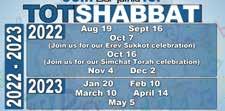
SATURDAY, APRIL 15
Tot Shabbat and Kiddush Lunch – 11 a.m. to 1 p.m. Join Congregation Beth Shalom every Shabbat for an interactive Tot Shabbat where we sing, play, and engage in fun activities, followed by a wonderful Shabbat Kiddush lunch together. Find out more at https://bit.ly/3PMct7u.
4TH ANNUAL WOMEN WHO DARE:
Annual Fundraising Luncheon
Friday, April 28, 2023; 12:00 Noon
City Springs, Sandy Springs
SPONSOR LEVELS
• $1,800: Council Crusader – includes 8 seats
• $1,000: Ms. Incredible – includes 4 seats
• $500: Wonder Woman – includes 2 seats
• $250: Super Girl –includes 1 seat
INDIVIDUAL RESERVATIONS
• $125: Advocate
• $60: Adults 40 and under
All sponsors will be listed in the luncheon program. For additional information, please contact Christine Heller at christineh@ncjwatlanta.org
for reservations and sponsorships: ncjwatlanta.org/events-sheroes-registration/ Reservation deadline – April 18

100 | MARCH 31, 2023 ATLANTA JEWISH TIMES
Susie Greenberg
Ana Robbins
Marcy Louza Jill Savitt








































ATLANTA JEWISH TIMES MARCH 31, 2023 | 101 40 UNDER 40 40 UNDER 40 Jewish Breakfast Club Luncheon Honoring Jewish Atlanta’s 40 Under 40 Luncheons are back! Starting with May 11, 2023 11:30-1:00 p.m. Jewish Breakfast Club JBC Celebrate with Jewish Atlanta’s 40 Under 40 award winners as we recognise their contributions to our community. Tickets are $18 Per Person and Includes a Kosher Lunch www.atlantajewishtimes.com/jewish-breakfast-club
KEEPING IT KOSHER
Passover Brookies
One year, when driving back to Lakewood from Minneapolis, we stopped in South Bend to visit my brother and sister-in-law. She served us supper, and for dessert she put this on the table. All my kids start grabbing. With a full mouth, one of my kids said, “Yum! What is this?” “It’s a brookie!” “A what?” “A brownie and a cookie mixed together.” What a brilliant idea! You can’t decide which of the two best desserts to make, so you make both in one! This recipe was featured during our Pesach in a Pot intiative in April 2022. For more great Passover ideas, watch Pesach in a Pot!
Ingredients
Brownie Layer

4 eggs
1 cup sugar
1/2 cup Gefen Unsweetened Cocoa
1/2 cup oil
1/2 cup Gefen Potato Starch
1/2 cup ground almonds
1 teaspoon imitation vanilla extract
Cookie Layer
1/2 cup sugar
1 egg
1/2 cup oil
1 and 1/2 cups ground almonds
1 cup Gefen Potato Starch
3/4 cup Glicks Chocolate Chips
Directions
Prepare the Brookies
1. Preheat oven to 350 degrees Fahrenheit. Line an eight-inch square baking pan with Gefen Parchment Paper.
2. In a bowl, combine all brownie layer ingredients; pour into prepared pan.
3. In a second bowl, combine cookie layer ingredients; place on brownie layer. (It’s easiest if you flatten pieces of the dough with your hand and place them on the bottom layer.)
4. Bake for 35 minutes or until toothpick inserted in the center comes out clean. When cooled, cut into squares.

Notes:
This recipe works best using a real pan; however, if you are using a disposable pan, you might have to increase the baking time by five to 10 minutes.
Add 1/2 cup chocolate chips to the brownie layer to make it super chocolatey.
Source: Kosher.com
Recipe by: Faigy Murray
Shmuck
Sadie tells Maurice, “You’re a shmuck! You always were a shmuck and you always will be a shmuck! You look, act and dress like a shmuck! You’ll be a shmuck until the day you die! And if they ran a worldwide competition for shmucks, you would be the world’s second-biggest shmuck!”
“Why only second place?” Maurice asks.
“Because you’re a shmuck!” Sadie screams.
YIDDISH WORD

Yiddishe pooch
n. A dog who has learned and responds to commands in Yiddish. “Daisy is a Yiddishe pooch. Tell her to go kibbitz (make wisecracks and give advice), and she chews the other dogs’ ears off. Not literally, of course.”
Yiddishe pooches are for real. New Yorkers can even attend Yiddish dog training seminars in Central Park.
JEWISH JOKE
Passover Terms
By: Yoni Glatt, koshercrosswords@gmail.com
ACROSS
1. iPhone application
6. “Come ___?” (Italian greeting)
9. Words before “Is Born”
14. Big name in hummus
15. Morticia, to Wednesday
16. Shmuel’s 15-Across
17. Maggid from a kindergarten teacher?
19. If one’s broken, it’s often good
20. Chairman pro ___
21. FBI member?
23. Old in Yiddish
24. Making friends over matzah?
27. Letters before Constitution or Lincoln
28. It’s needed for camping
29. Star Hawk Young
32. Magic incantation
35. What the kosher Angler doesn’t want to catch
38. Seder scapegoat, once?

42. Common colonist
43. Taps a pitch
44. Fusses
45. A writer may work on it
47. 21st, e.g.: Abbr.
49. What the impatient say during Dayenu?
55. Klutzes
FOLLOW :


56. “Shalom!”
57. Words before dime or diet
60. Power
62. Like some at the end of the second Seder or chometz found on Chol Hamoed?
64. Awaken, as feelings
65. Org. supporting flossing
66. Presidential candidate Haley
67. “___ a rose is she”: Coleridge
68. Start of an Iowa city
69. Made comfortable
DOWN
1. No. 2 in the lab
2. Fashionable arrival
3. WWII-ending weapon
4. Hit 2022 Indian film
5. Indefinite answers
6. “I told you so!” smile
7. Marisa in Spider-Man movies
8. “...sure plays ___ pinball”
9. Zevulun to Binyamin
10. Michael who won a Pulitzer for “The Killer Angels”
11. Script or Haggadah run-through?
12. “West Side Story” character
13. Given a G, say
18. Quarterback Tagovailoa, and others
22. Dan who was an All-Star for the Braves and Marlins
25. Regretful one
26. First phone caller
29. Org. scanning flyers
30. Operated
31. Hurricanes, blizzards, locust swarms, and fiery hail?
32. Eat leavened bread on Passover, e.g.
33. %, briefly
34. Frozen wasser
36. Grunge relative
37. Flour bag figs.
39. “___ to differ”
40. Mizrachi school in Ohio
41. Scott who can control a 42-Across
46. Tzedakah box
47. State south of Mass.
48. Funny Levy
49. Tolkien’s heroic captain of Rohan
50. Too trusting
51. Just awful
52. Escape the notice of
53. Ephron and Roberts
54. Errant golf shots
58. Synonym for 3-Down
59. Israel’s Yesh
61. Some offensive N.F.L. players, briefly 63. Sabado or Domingo, e.g.
ATLANTA JEWISH TIMES MARCH 31, 2023 | 103 BRAIN FOOD “Mountain Climbing” SOLUTION H 1 E 2 E 3 L 4 M 5 U 6 G 7 S 8 D 9 A 10 D 11 A 12 I 13 R M A O 14 S E H U 15 S A A C 16 A S T R 17 E N O M 18 A S H T 19 G 20 I F F 21 I 22 B T 23 A 24 K 25 E I T U P 26 A N O T 27 C 28 H 29 I 30 D I S 31 A L A R Y A 32 L I E 33 S A U 34 P 35 O O D 36 L E S S 37 T 38 E 39 P 40 I T U P A 41 V 42 O 43 C A D O S 44 H 45 U 46 K 47 N 48 O F K 49 O R E 50 A 51 N 52 O 53 N O T 54 O T H 55 E N E X T L E 56 V E L O 57 N E C 58 H E Z A 59 V 60 E 61 S I 62 S 63 E E R 64 I 65 L 66 E 67 D 68 I V E L 69 I E N A 70 M P S O 71 L E S L 72 A D S T 73 E S T 1 2 3 4 5 6 7 8 9 10 11 12 13 14 15 16 17 18 19 20 21 22 23 24 25 26 27 28 29 30 31 32 33 34 35 36 37 38 39 40 41 42 43 44 45 46 47 48 49 50 51 52 53 54 55 56 57 58 59 60 61 62 63 64 65 66 67 68 69
Difficulty Level: Medium
Selma Palchick Barron
96, Dunwoody

Selma Palchick Barron left this world on March 20, 2023, surrounded by family. She is predeceased by her husband, George, and her parents, Ben and Eleanor Palchick. She was born in Cleveland on Feb. 6, 1927, and graduated from Glenville High School. After WWII, she married George. Selma was one of the first women pharmacists to be licensed in Ohio and Florida. She worked alongside George at Jay Drugs in Cleveland, at the Barron pharmacies in Hollywood, Fla., and as a hospital pharmacist at Aventura Hospital in North Miami.
She is survived by her daughter, Karyl (Jeffrey) Moak, and son, Bruce (Diane) Barron; grandchildren, Josh (Sunitha) Barron of Austin, Texas, Ellie (Adam) Goldman and Kara Barron of Atlanta, Zachary (Katharine) Moak of Los Angeles, and Hannah (Alex) Costa of Geneva, Switzerland. She is also survived by five greatgrandchildren, Jonah and Ethan Goldman, Jordan and Adin Barron and Gabriel Costa, and numerous nieces and nephews. She was predeceased by her brothers, Yale and Harvey Palchick.
Internment was at Crestlawn Cemetery, Atlanta, Ga., and officiated by Rabbi Binyomin Friedman of Congregation Ariel. Donations should be made to Yad Y’Lad or a foodbank of your choice. Shiva takes place at Bruce’s residence in Dunwoody and later in the week at Karyl’s home in Bethesda. Arrangements by Dressler’s Jewish Funeral Care, 770-451-4999.
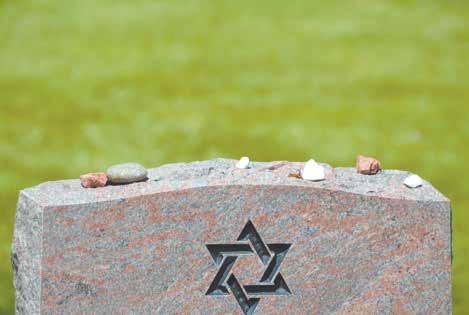
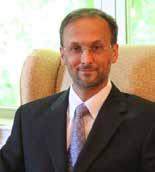
Birdie Grace Benator 98, Atlanta
It is with deep sadness that we announce the passing of our beloved Birdie Grace Benator, who left us on March 25, 2023, surrounded by love and family. A devoted wife, mother, grandmother, and great-grandmother, she was a pillar of strength and love to all who knew her.
Birdie’s father, Isaac Benveniste, traveled to Atlanta, Ga., from Rhodes in the early 1900s, one of the many shoemakers and earliest members of OrVeShalom. There, he met Birdie’s mother, Rachel Amin, who had arrived from Jerusalem. They created a beautiful home where Birdie was born on Dec. 21, 1925, the first of four daughters. Their journey took them to Washington D.C., and then across the country to southern California. In 1947, Josiah Benator, Birdie’s childhood tutor and, later, sender of love letters during WWII, invited her to the Veteran’s Banquet in Atlanta. She crossed the country, married her sweetheart, and built her home with Josiah Victor Benator. Over the years, she dedicated her life to her family, raising seven children and becoming the proud grandmother to 13 grandchildren and four great-grandchildren. Her unwavering love and support for her family were the cornerstones of her life, and her legacy will live on through them.
In addition to her commitment to her family, Birdie was deeply involved in her synagogue, where she served as the Sisterhood president and volunteered in the synagogue giftshop. Her commitment to her faith and community was evident in her decades-long participation in Tuesday baking of burekas and other Sephardic sweets and savories, a cherished OrVeShalom tradition that brought her joy and a remarkable community. She was a lifelong mahjong enthusiast, playing with the same group of loving women for decades and passing her passion along to her children and grandchildren, especially her youngest grandson. She also dedicated herself to volunteer service, receiving the JC Penney Golden Rule Award and was further recognized for her work at her son Isaac’s school, sharing her giant heart with other children with developmental disabilities.

Throughout her life, she was a beacon of love, compassion, and guidance for all who were fortunate enough to know her. Anyone who entered her home knew her warmth, her kindness, and her giant heart. The home she created with her beloved husband became a gathering place for her children, friends, and holidays.

She will be deeply missed by her cherished husband of 75 years, Josiah Victor Benator, her children Rachel Benator and Randy Tillery, Terry and Alan Feldbaum, Isaac Benator, Stella and Jim Port, Debra Benator and Randall Wagner, David and Chris Benator, and Daniel and Naomi Benator, and her many grandchildren and great grandchildren. She is preceded in death by her parents, her three sisters, her eldest son Victor Benator, and her eldest grandchild Richard Tillery, who left us just days before she did.
As we mourn the loss of Birdie, we celebrate the incredible 97 years of life she led and the countless memories we shared with her. We are forever grateful for the love, wisdom, and strength she imparted to us all. May she rest in peace, surrounded by the love of those who have gone before her, and may her memory be a blessing to all who know her. Dressler’s Jewish Funeral Care, 770-451-4999.
104 | MARCH 31, 2023 ATLANTA JEWISH TIMES OBITUARIES Funeral and Cemetery Pre -planning It’s easy: Over the phone, online, in person It’s safe: Pre-payments are 100% escrowed in an account you own It’s responsible: Simplifies arrangements, removes burden from family, and fixes most funeral costs WE HONOR ANY PRE-PAID FUNERAL FROM ANY OTHER FUNERAL HOME www.DresslerJewishFunerals.com Atlanta Born ~ Atlanta Owned ~ Atlanta Managed Edward Dressler, Owner Helen
Coordinator 770.451.4999
Scherrer-Diamond Outreach
Seymour Commanday
91, Atlanta
Seymour (Sy) Commanday, age 91 of Atlanta, born in Brooklyn, N.Y., second child of Ukrainian immigrants, passed away on Saturday evening, March 11, 2023, at home.
Though always loyal to his hometown and his alma mater, Brooklyn College, Sy and his first wife, Jacky, and their growing family moved from place to place as he gained more expertise in his career as a color chemist. When Sy retired, he and his second wife, Betty, found community, and smiles in Beaufort, S.C., and Sandy Springs, Ga.
Sy thrived on the inquisitive nature, the give and take, of Judaism. Presented with a difficult legalistic Torah portion for his bar mitzvah, he irreverently chose to wear a green tie to celebrate the simultaneous St. Patrick’s Day holiday. He had many philosophical conversations with students, seekers, and people trying to find community. He taught many younger students and adults about the Jewish faith. With a goal of inclusion, Sy was willing to perform and participate in interfaith life cycle rituals when others were not. He was also willing to pray with anyone of any faith in their time of need as a volunteer hospital chaplain. He was very involved in his community as a Jewish lay leader in his congregation.
Sy is predeceased by his first wife Jacky (Ruditz) Commanday (of breast cancer, in 1983) and his son, Clifford Commanday (from leukemia in 1975). He is survived by his wife of 36 years, Betty Commanday, his children, Melissa Johnson (Robert), Jonathan Commanday (Laura) and Mara Wildes (Scott), and his grandchildren, Valerie Tarr, Alex Commanday (Manasi Tannu), Zachary Commanday (Hannah Behar), Max Commanday, Skylar Wildes, and Anslie Wildes. He also had two stepdaughters, Abby Buck (William) and Laura Muller (Will Snyder) and four step-grandchildren.

Graveside services were held on Wednesday March 15, 2023, at noon at Greenlawn Memorial Gardens in Spartanburg, S.C. A memorial service will be held at a later date in Sandy Springs, Ga. Arrangements made by Dressler’s Funeral Care in Atlanta, Ga. Memorial contributions may be made to St Jude Chidren’s Research Hospital, or Jewish War Veterans.
Ronald Otto Herman 77, Atlanta
Ronald “Ronnie” Otto Herman, age 77, passed away peacefully on March 22, 2023, surrounded by his loving family. Ronnie was born on Aug. 20, 1945, in Pensacola, Fla., to the late Kurt and Gertrude (Bickart) Herman who were Holocaust survivors. He spent most of his adult life in Atlanta, Ga. Ronnie was a dedicated family man, survived by his wife and best friend, Nicki Herman, his three children, son, Scott (Stephanie), son, David, and daughter, Lisa “Rani-Joy” Herman. Additionally, he has step-children, Chris Hecht (Erin) and Craig Hecht (Eve), and is a proud grandfather to Samantha, Sean, Kai, Maxwell, Kieran, Ash and Cooper, his sister, Charlotte Herman Janis (Dick Grosswald), and sister-in-law, Audrey Leonard, amongst his nephews, Stephen Janis (Andrea), Eric Janis (Jennifer Arnoldi) and Joey Leonard, great niece, and nephew, Shana and Kenny Janis.
Ronnie and his sister, Charlotte, were raised by their parents in Pensacola. His parents had a significant influence in his life, and he often spoke of their support and encouragement throughout his many business ventures highlighting Resort Gifts, Compufax, Aaron Rents, and The Flying Biscuit.
Ronnie had many passions and hobbies throughout his life. He was a man of diverse interests including poker, sports, theater, concerts, bowling, tennis, and Alabama “Roll Tide” football. Ronnie and his wife, Nicki, also loved to travel. His favorite destination was the Wave Crest in Del Mar, Calif., where he would spend time with family and friends.
In addition to his varied interests, Ronnie had a few favorite foods and drinks. He liked nothing more than having an artichoke with chestnuts while watching Alabama football. His favorite dessert was marzipan, and he would often be seen drinking a peach Propel or diet soda. In fact, his last request which was honored was to enjoy one last diet Dr Pepper on his own.
One, if not the most, endearing quality that Ronnie possessed was his great sense of humor. He had a very quick wit and a knack for finding humor in even the most mundane situations, including the last moments of his life. Despite the challenges and setbacks he faced in later years, Ronnie never lost his sense of humor or his ability to see the bright side of things. Ronnie’s sense of humor will be remembered by all those who had the pleasure of knowing him, and his legacy of laughter and joy will continue to inspire and uplift those he touched throughout his life.
Donations can be made in his honor to the Pulmonary Fibrosis Foundation www.pulmonaryfibrosis.org or to B’nai Torah of Atlanta www.bnaitorah.org. Arrangements by Dressler’s Jewish Funeral Care, 770-451-4999.
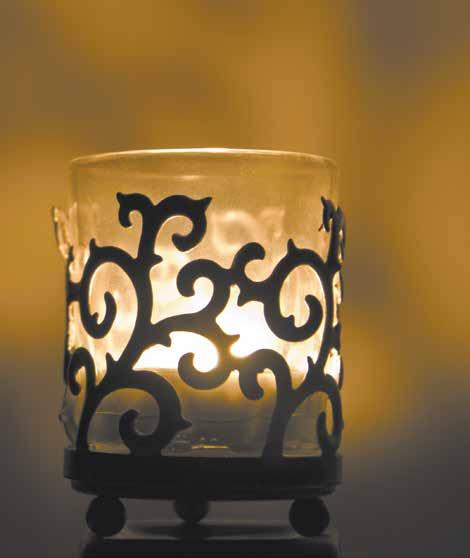
Michael S. Pressman 80, Atlanta

Michael S. Pressman, age 80, of Atlanta passed away on March 23, 2023. Michael was born in Providence, R.I., and grew up in Charlotte, N.C. He served in the Marine Corps, beginning in 1961, and spent 51 years in the carpet business with Queen, Mohawk, Cherokee, and Caladium. He was a member of The Jewish War Veterans, the Atlanta WWII Roundtable, and the Atlanta Writers Club; he published eight books on Amazon.
He is survived by his wife of 51 years, Alice Pressman, children, Helayne (Brian) Solomon, Scott (Anne) Pressman, and Jonathan Pressman, brother, Alan (Sandy) Pressman, and grandchildren, Annie, Will, Brady, Ellie, and Myer. Graveside services were held at Arlington Memorial Park with Rabbi Joshua Heller officiating. In lieu of flowers, contributions may be made to St Jude Children’s Hospital or to Juvenile Diabetes Research Foundation. Arrangements by Dressler’s Jewish Funeral Care, 770451-4999.
ATLANTA JEWISH TIMES MARCH 31, 2023 | 105 OBITUARIES
OBITUARIES
Jack Shenk 96, Atlanta
The family of Jack Shenk mourns the passing of our beloved father, grandfather, and great-grandfather. He was a man of integrity, self-determination, a quiet confidence, a generous heart, and a deep faith in G-d. He had successful careers as a business owner and real estate professional, but, central to his life, were his family and his passions for music and volunteerism. After living a full and fulfilling life, Jack died at the age of 96 on Feb. 3, 2023.
Jack was born in Brooklyn, N.Y., the second oldest of five children of Joseph and Rose Shenkoff. His father, a concert violinist and orchestra conductor, operated the New Street Haberdashery shop in lower Manhattan.
Jack started to play the drums as a teenager. He performed with orchestras at clubs in New York City and hotels in the Catskill Mountains. He met Marcelle (Marcy) Broder while playing at her uncle’s hotel. In the fall of 1950, Jack entered the Army and was deployed to Germany. He played drums and served as principal in the percussion section of the 7th Army Symphony, which performed throughout Germany.
Jack married Marcy in New York in January 1953. They moved to Atlanta and soon met other young couples who became lifelong friends. He purchased a rug cleaning business, and the family grew to three children. Seeing potential in the real estate profession, Jack became a real estate agent, first with residential and then, commercial properties. Marcy, a teacher at the Hebrew Academy (now the Atlanta Jewish Academy), also received her real estate license. Upon becoming a real estate broker, Jack and Marcy opened their own commercial real estate company.
Jack was an active person, swimming, playing racquetball and golf, and working out regularly at the fitness center. He enjoyed sharing flowers from his garden and watching his bird house tenants come and go. Jack and Marcy were longtime synagogue members of Beth Jacob Atlanta.
They loved to travel and took many wonderful trips abroad. In December 2002, they participated in a memorable humanitarian mission to Cuba, bringing much needed medical supplies to doctors and visiting the Jewish communities.
For over 20 years, Jack and Marcy brought joy to the residents of The William Breman Jewish Home, hosting a weekend entertainment program featuring music, singing, and dancing. The Shenks took their music programs to other Atlanta senior centers as well. Sadly, Marcy, passed away in 2008; they had been married over 55 years.
Because he strongly believed in the ability of music to sharpen the intellect and awaken the spirit, Jack provided a music fund for each of his grandchildren so they could select an instrument of their choice and take lessons.
Jack loved playing in the percussion section of the Callanwolde Concert Band, which he joined in 1992. He served as director of development and rarely missed a practice or performance. For his over 25 years of participation and dedication, Jack was awarded the inaugural Director’s Award for Outstanding Service to the Callanwolde Concert Band.
He became a student again, taking classes at Senior University at Mercer. As a volunteer on the curriculum committee, he coordinated a popular class called “Speaker’s Choice,” scheduling speakers from political, medical, and financial fields, as well as representatives from foreign consulates in Atlanta.
In recognition of all his dedicated volunteer service involvements in the community, Jack was awarded the AARP Andrus Award for Community Service for the State of Georgia in September 2011.
Jack moved to Holbrook Decatur in October 2019, shortly after it opened. He made many friends while living in his independent living apartment. He worked out at the fitness center, enjoyed numerous activities, and was well-known as the chief BINGO caller.
Jack provided much love, wisdom, guidance, and wonderful memories to his devoted children: Mindy and Jack Hyman, Paul and Ilana Shenk, and Connie and Ian Pollack. He had a loving and fun relationship with each of his eight grandchildren: Daniel and Lauren Hyman, Joseph Hyman, Kochava and Gabriel Joel, Tzina and Moshe Fishman, Rafi and Aviva Shenk, Avital and Binyamin Goetz, Ben and Alison Pollack, and Andy and Rebecca Pollack. He leaves behind a great legacy in his 24 great-grandchildren.
He is remembered with love by his sister, Lorraine Hirsch; his Atlanta relatives, Fred and Glenda Broder, Jeanette Dankberg, Shaindle Schmuckler and their families; and a host of nieces and nephews around the country.
Graveside services were held on Feb. 5, 2023, at Crest Lawn Memorial Park with Rabbi Ilan Feldman officiating. In lieu of flowers, memorial donations can be made to Beth Jacob Atlanta, 1855 Lavista Road, Atlanta, GA 30329 (www.bethjacobatlanta.org) or to the charitable organization of your choice. Arrangements by Dressler’s Jewish Funeral Care, 770-451-4999.
Richard Josiah Tiller 43, Atlanta
The family of Richard Josiah Tillery is sad to announce his passing at age 43 on March 21. Though his time on earth was cut short, his friends and family knew he always lived life on his own terms.
Born to Rachel Benator, MD, and Randy Tillery, of Salt Lake City, Utah, Richard was always a lively, principled individual. He was the first to speak up for what he believed in, and he was a friend to all. After high school, Richard lived in Israel for nearly 5 years and served with the Nakhal Mutznakh 50th Airborne Infantry Brigade of the Israeli Defense Forces. While pursuing his undergraduate studies at the University of Utah, Richard taught Hebrew and drama to elementary and middle schoolers at Congregation Kol Ami in Salt Lake City, Utah. Richard volunteered for humanitarian missions in Mali, Guatemala, Peru, Bolivia, Belize, Solomon Islands, and Nepal where he assisted his mother in eye examinations, treatment, surgery, and the provision of reading and prescription glasses. After graduating from the University of Utah with a B.A. in political science and a B.S. in economics, he pursued and received his J.D. from Emory University School of Law. As a partner at Gibbs-Tillery Law Firm, Richard brought a well-rounded dispute resolution perspective to all matters, whether it involved a multimillion-dollar or start-up company or what he considered the most important entity of them all, a client family. He brought not only his knowledge and experience, but also his heart into every case.
Though he’s gone too soon, he will be remembered for his warmth, his intelligence, his devotion to his family and his devilish sense of humor and upbeat personality by his parents, Rachel Benator and Randy Tillery, his sister, Robin Tillery, his grandparents, Josiah and Birdie Benator, his long-term girlfriend, Amanda Barnes, and children, his aunts and uncles, his cousins, and countless friends, colleagues, and clients.
A graveside service was held at Greenwood Cemetery on Friday, March 24, at 2 p.m. Arrangements by Dressler’s Jewish Funeral Care, 770-451-4999.
Death Notice
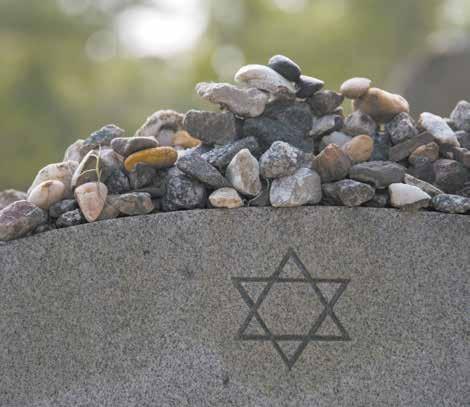
106 | MARCH 31, 2023 ATLANTA JEWISH TIMES
Obituaries in the AJT are written and paid for by the families; contact Editor and Managing Publisher Kaylene Ladinsky at kaylene@atljewishtimes.com or 404-883-2130, ext. 100, for details about submission, rates and payments. Death notices, which provide basic details, are free and run as space is available; send submissions to editor@atljewishtimes.com.
David I. Rudel, 91, of Johnston, Penn., died Jan. 22, 2023.













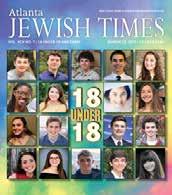
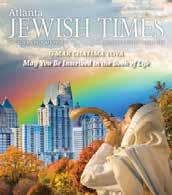
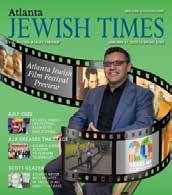

ATLANTA JEWISH TIMES MARCH 31, 2023 | 107 Saturdays, Sundays and Memorial Monday 10:30am – 6pm • Rain or Shine • FREE PARKING! BUY DISCOUNT TICKETS WWW.GARENFEST.COM Located in Fairburn, just off I-85 at Exit 61 (Peachtree City Exit) April 15 thru June 4 404-883-2130 ADVERTISE WITH THE
Allen H. Lipis
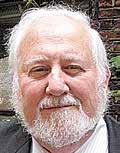

The Bottom Line
I attended a Chanukah party at Rabbi Menashe Goldberger’s home. Goldberger is one of the Kollel rabbis, and a wonderful mentor for me. After several people shared inspiring stories at the party, not knowing Eric Young, who was at the party, we asked him to tell an inspiring story. He was reluctant at first, but eventually, told the following story.


Eric is a man in his 60s. He said he was a widow, having lost his wife to a medical issue several years ago. He told his story by recounting a story he heard at another party that he was at a while back.
I was at a party, and a couple insisted that they had to tell me the following story. I had no idea why they were going to tell me this story, but they felt that I

had to hear it, nevertheless.
The story they told me was about a man who was happily married for several decades when his wife was informed that she had incurable cancer. After a lengthy battle with the disease, the wife died and the husband stayed single as a widower for several years. I immediately knew the reason why I had to hear the story, for it was similar to my situation.
The husband then met a lovely woman and they both fell in love and talked about getting married. The husband to be was at first reluctant to marry again because of the way his first wife had died, but his love of this woman made him consider marrying again. He thought his love for this woman overcame any of his worries.
Before the wedding, the woman had a medical exam, and she was told by her doctor that she now had cancer, again, an incurable cancer. The question then occurred to both of them -- should they marry given that the woman had a short time to live?
In considering his decision to marry
his fiancé or not, the man thought about the impact it would have on his new wife. Would she really want to be married for such a short time period, and then put her new husband through the same misery he had when his first wife died? The man wasn’t sure it would be acceptable to his bride if she caused her new found husband another round of suffering. The man didn’t know what to do, for he wanted to do what was right for his fiancé. Now as a man, what would you do if you found yourself in this situation?
The woman also went through a series of considerations. She worried about the impact her short marriage would have on her husband-to-be. She didn’t want to put him through another cancer marriage that would quickly end with her death and cause him to suffer endlessly for something so similar to his first wife’s death. The woman knew that the few months that she would live would be much happier with her husband, but she worried about the impact it would have on him after she died that
could last for years. Now, as a woman, what would you do if you found yourself in this situation?
In the end, they both decided to get married, and the wife did die several months after their marriage.
Eric never explained why he told that story, but the reason was clear to me. Eric lost a wife to a medical disease, probably cancer, but he believed that it should not prevent him from marrying again. He should put aside his worries and marry if he found the right person to marry, regardless of the short time they would be together. However, the main point of the story is that in being married it is more important to consider the impact of any decision in the marriage, and that consideration should apply to any marriage, even if for only for a short period of time. Marrying shifts the focus from the major concern in a decision on yourself to a new focus on your spouse.
The bottom line: Considering the impact of a decision on your spouse should override a consideration of the impact on yourself. ì



108 | MARCH 31, 2023 ATLANTA JEWISH TIMES CLOSING THOUGHTS
Person with Cancer? SufisAtlanta.com I 404-888-9699 1814 Peachtree St NW I Atlanta, GA 30309 Atlanta’s
Finest
Persian
Cuisine Outside
Patio !
Full
Bar
Catering
For
Large
And
Small
Events
Book
Your
Next
Holiday
Party
I
1814
Peachtree
St
NW
I
Atlanta,
GA
30309
I
404-‐888-‐9699
Atlanta’s Finest Persian Cuisine Outside Patio Full Bar Catering For Large And Small Events Book Your Next Special/Corporate Event! WEEKDAY LUNCH SPECIALS
Would You Marry Another






2023 BEST OF JEWISH ATLANTA Support Your Favorites in Jewish Atlanta DON’T WAIT! VOTE FOR THE BEST OF JEWISH ATLANTA TODAY: www.bit.ly/AJTBestOf2023 Your vote automatically enters you into the “2023 Readers’ Choice Drawing” featuring: Visa Gift Cards • Zoo Tickets • GA Aquarium Tickets • Gift Certificates to stores, restaurants and more! VOTE for the chance to WIN PRIZES! V o t i n g c l o s e s A p r i l 3 0 , 2 0 2 3
Big Firm Legal Work at Small Firm
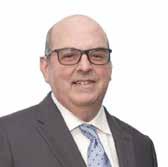






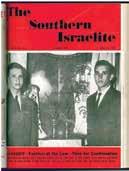
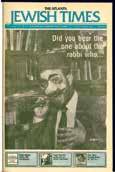








Marketplace “Shekels For Your Collectibles” 404-263-2967 • Coins • Gold • Jewelry • Sterling • Strict Confidentiality • References Upon Request Member: ANA, NGC, PCGS & PMG THE DUSTY COIN COLLECTIBLES Atlanta’s Top Roofing & Exterior Remodeling Company Call Today For Free Estimate! 678-748-3405 | www.drroof.com HOME Winner of Salesman of the Year Award 6 out of the past 7 years! Ralph Kurland Sales Representative 905 Ernest Barrett Pkwy, NW Kennesaw, GA 30144 cell: 678-665-1024 dealership: 770-419-9800 ext. 3312 rkurland@subaruofkennesaw.com www.subaruofkennesaw.com Everyone Knows Someone Who Loves Their SUBARU Call me to test drive any of our new or used cars! Just bought Subaru #3 from Ralph. By far the best car buying experiences I’ve ever had. He’s a pro, and made the entire process an absolute pleasure! Call Ralph if you’re in the market for a new or used car. You won’t be sorry! Jack Feldman, Executive Director, Temple Sinai AUTO Got old issues? If you discover old issues of the Atlanta Jewish Times laying around, we want them. To boost our archives, we will come pick up any AJT issues from 2014 or earlier. Please call 404-883-2130 or write kaylene@atljewishtimes.com to setup retrieval. Subscribe, Support, Sustain. As always, thank you for reading your Atlanta Jewish times. Closets, pantries, garages, offices and more! Atlanta Custom Closets www.closetpro.net Rick Moore: 404-255-0589 BEST OF JEWISH ATLANTA BEST OF JEWISH ATLANTA When Quality Counts! Design the Closet of your Dreams! HOME VISIT OUR WEBSITE www.AtlantaJewishTimes.com FOR MORE OF WHAT YOU NEED DATING Retired active energetic man wants to meet honest active lady 62+. 7wiseman3@gmail.com 503.332.8721 TRAVEL COMPUTER
Intellectual Property Counsel, Company Counsel, and Business Strategist Mr. Weinstein is a seasoned attorney with over 20 years of experience providing counsel to companies of all sizes, from startups to Fortune 100 companies in the US and internationally. (404) 735-3941 weinsteiniplaw.com dweinstein@weinsteiniplaw.com LEGAL SERVICES
Rates


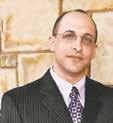








Marketplace John Salvesen • 404-453-3438 thehandymancanatlanta@gmail.com The Handyman Can • Plumbing • Electrical • Sheetrock • Floors • Tile • Framing • Kitchens • Painting • Roofwork • Concrete • Stained Glass • Antique Door Restoration as well as many other issues... HANDY MAN COMPUER HOUSE CALLS Voted #1 by Atlanta Jewish Community As Seen On 770-527-3533 It’s Time to Call for Help! www.HealthyComputer.com BEST OF JEWISH ATLANTA COMPUTER STANLEY PAVING Asphalt Paving, Patching & Seal Coating Specializing in driveways & small parking lots Family Owned & Operated since 1969 770.962.7125 770.480.1698 cell CALL NOW FOR 10% OFF SPECIAL HOME www.mobilityplus.com/alpharettaGA We sell, rent, and service: Your Community Mobility Partner! SENIOR HOME EcksteinHomeCare org | 404 751 2277 EcksteinHomeCare.org | 404.751.2277 exceptional care When you can't be there SENIOR
Chag Pesach Sameach!

Find the perfect dishes for your family’s



















 By Susanne Katz Karlick
By Susanne Katz Karlick































 By Bob Bahr
By Bob Bahr





















































 By Jan Jaben-Eilon
By Jan Jaben-Eilon



























































 By Jan Jaben-Eilon
By Jan Jaben-Eilon









































 By Bob Bahr
By Bob Bahr





 By Bob Bahr
By Bob Bahr





































































































































































































 By Bob Bahr
By Bob Bahr














 Above: Denny Marcus supports the art of South African women who create beadwork to be selfsufficient. This is one of a series representing the solar system, done by a group of tribal Xhosa women.
Above: Denny commissioned Atlanta artist Steve Penley to commemorate Andre’s 50th birthday in this collection of life events.
Below: The dining room table has a vessel of female faces by Mexican artist Jose Cruz. Chandelier by C Lighting.
Above: Denny Marcus supports the art of South African women who create beadwork to be selfsufficient. This is one of a series representing the solar system, done by a group of tribal Xhosa women.
Above: Denny commissioned Atlanta artist Steve Penley to commemorate Andre’s 50th birthday in this collection of life events.
Below: The dining room table has a vessel of female faces by Mexican artist Jose Cruz. Chandelier by C Lighting.









































































































































